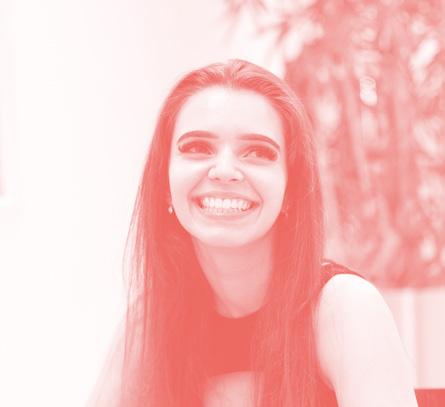
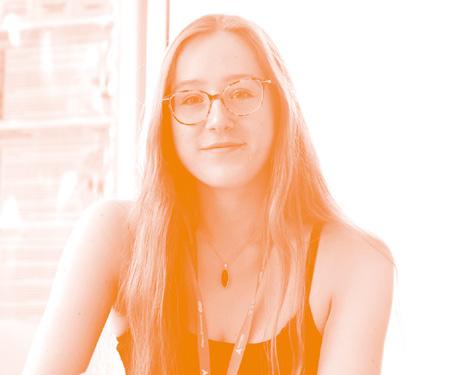

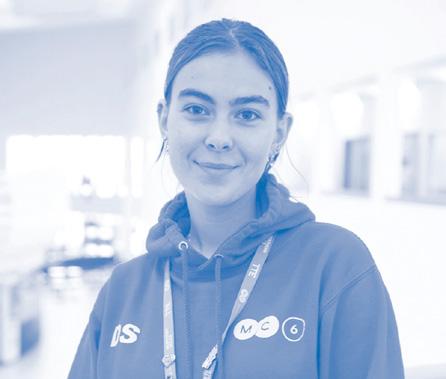
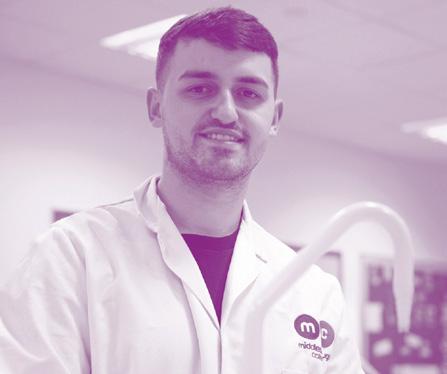

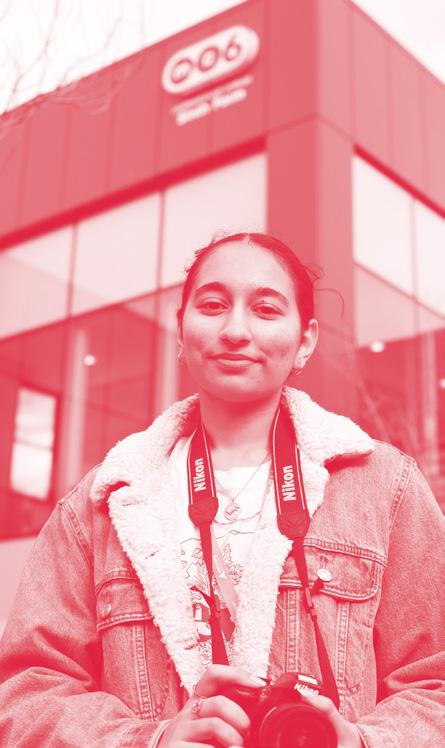
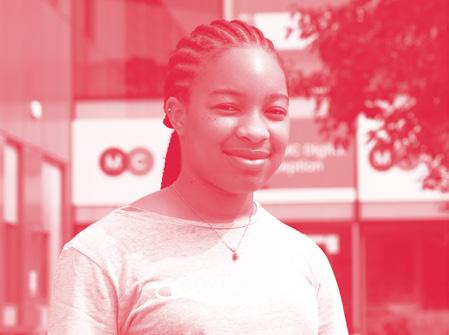



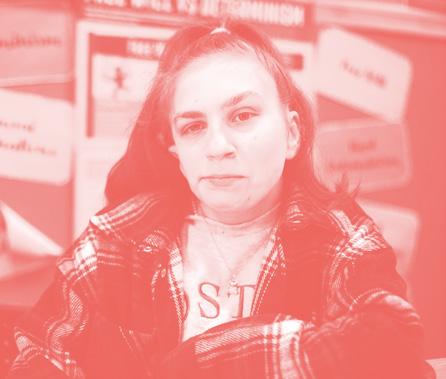

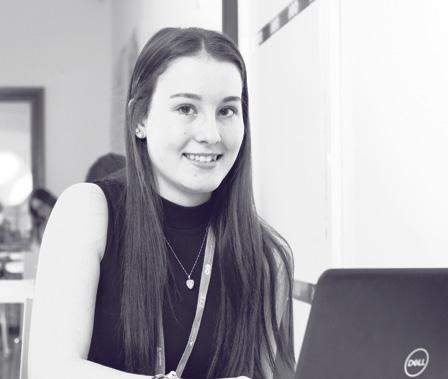
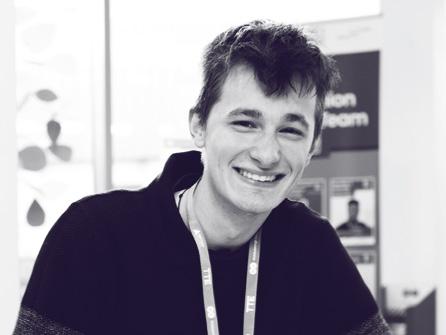
3 aspirations
A Level Courses 2024-25
We know it’s tough deciding what you want to do when you leave school, so that’s why we are here to help. At Middlesbrough College Sixth Form, we offer an amazing range of A Level and Applied A Level equivalent courses. So, if you aspire to progress to University, an apprenticeship or employment, we can take your future higher and our team will help you find the perfect route.

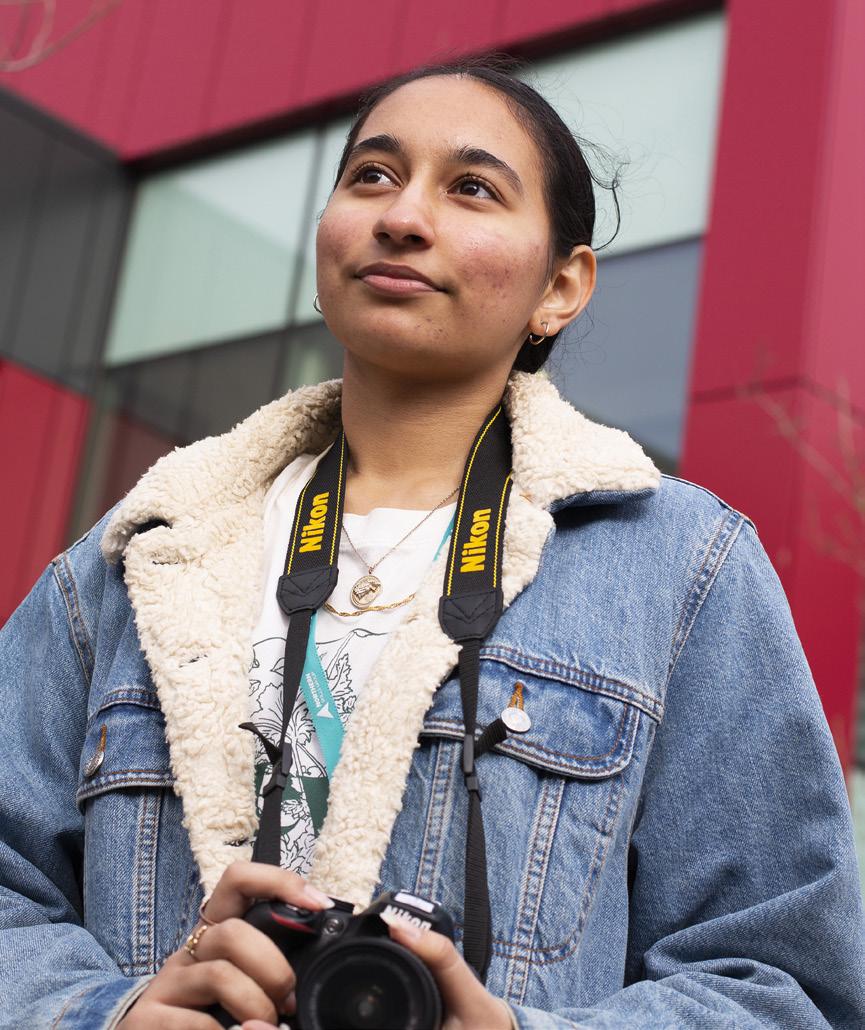
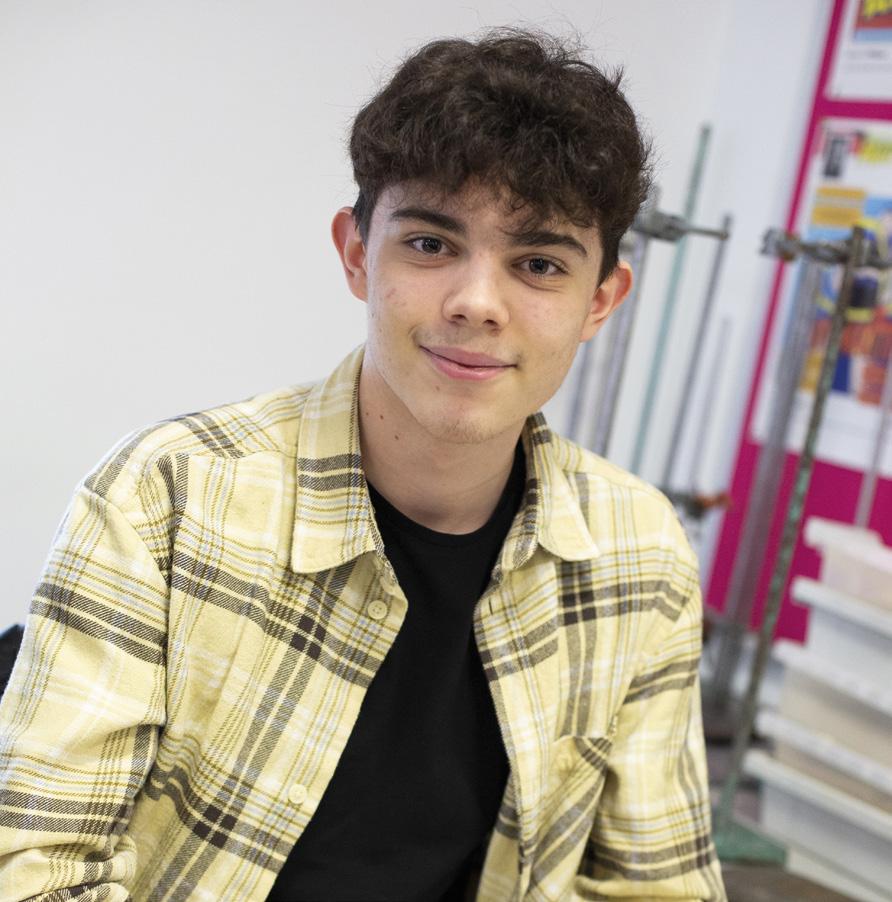

A College for everyone
See you soon at MC6!
4
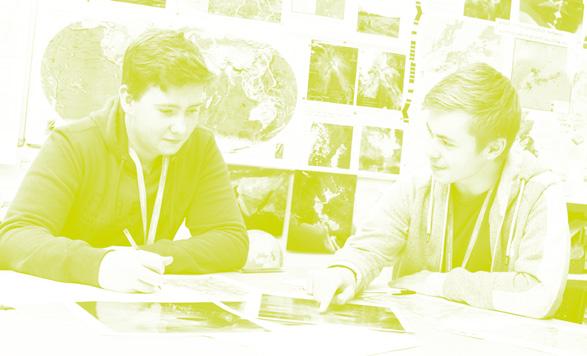

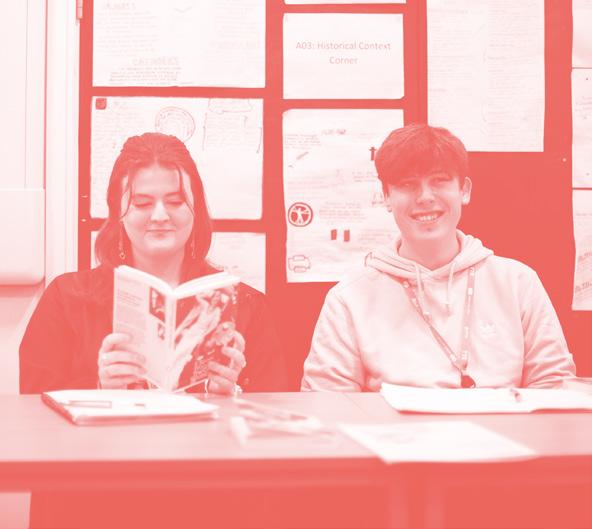

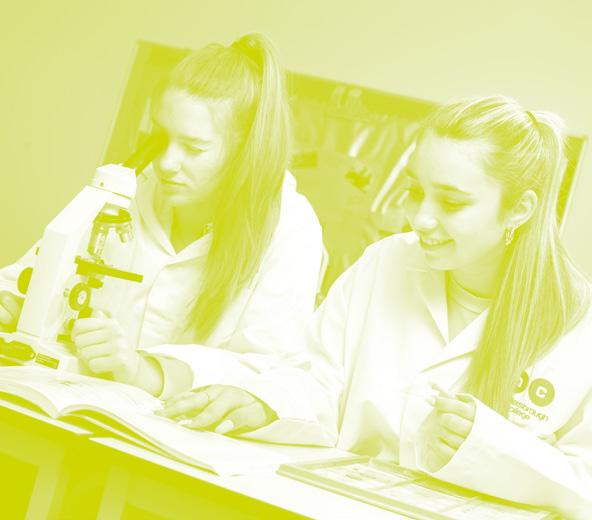
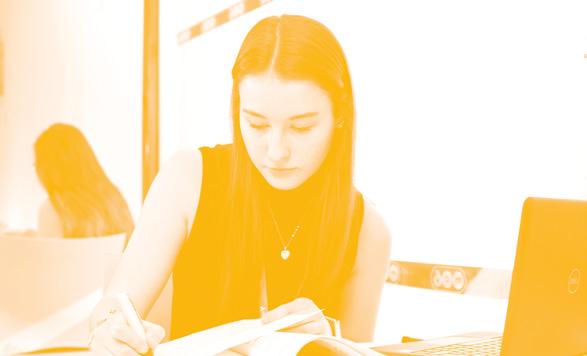


Contents 1 2 Apply in 5 easy steps! 4 Choose your pathway 6 We did it! 8 Taking our students higher 10 A Level courses 36 Applied Science & Forensic and Criminal Investigation courses 40 T Levels 44 Mix it up courses 54 Open Events 56 Taking you to University 57 Raising aspirations 58 Our student perks 60 MC Click 61 My Middlesbrough College App 62 Work placements 63 Careers team 64 Student services team 66 Sports Academies
Apply in 5 easy steps!
1 2 3
Be application ready
To apply to study with us you will need to get application ready. To do this you’ll need to make sure you have created an email account so that you can apply online.
You’ll also need to know which A Levels or courses you want to apply for. You can come along to our campus Open Events to find out everything you need to know about our courses, meet our tutors and see our incredible facilities.
Apply
Once you know what you want to apply for, you can head over to our website: mbro.ac.uk
We have online application forms available for you to complete, simply find the A Level or Mix it up section and click apply now. For A Levels you will only need to complete one application. If you want to study a Mix it up programme, please apply for the Mix it up course you want to study.
Interview
Following your application, you’ll be contacted by our Admissions Team to arrange an interview. This is nothing to worry about, it is a good chance to visit the College and meet your tutors. It also allows us to get to know what your career goals are and helps us work out if your chosen course is right for you.
2
Offer
You will then be offered a place on your course. This will either be via email or letter. If you change your mind about what course you want to study, don’t worry. Contact us and we will be able to get you onto your preferred course!
Enrolment
Once you have received your GCSE results, you will be able to enrol onto a course in August ready to start your studies in September.
Can’t decide what A Level subjects to study?
No problem! Apply for A levels and make your final decision about your subject choices during enrolment. You will be invited to attend a taster session where you will get a taste for life as a Middlesbrough College Sixth Form student and find out more about your course.
If you have any questions about your application, then get in touch with our Admissions Team on 01642 333601 or email: admissions@mbro.ac.uk
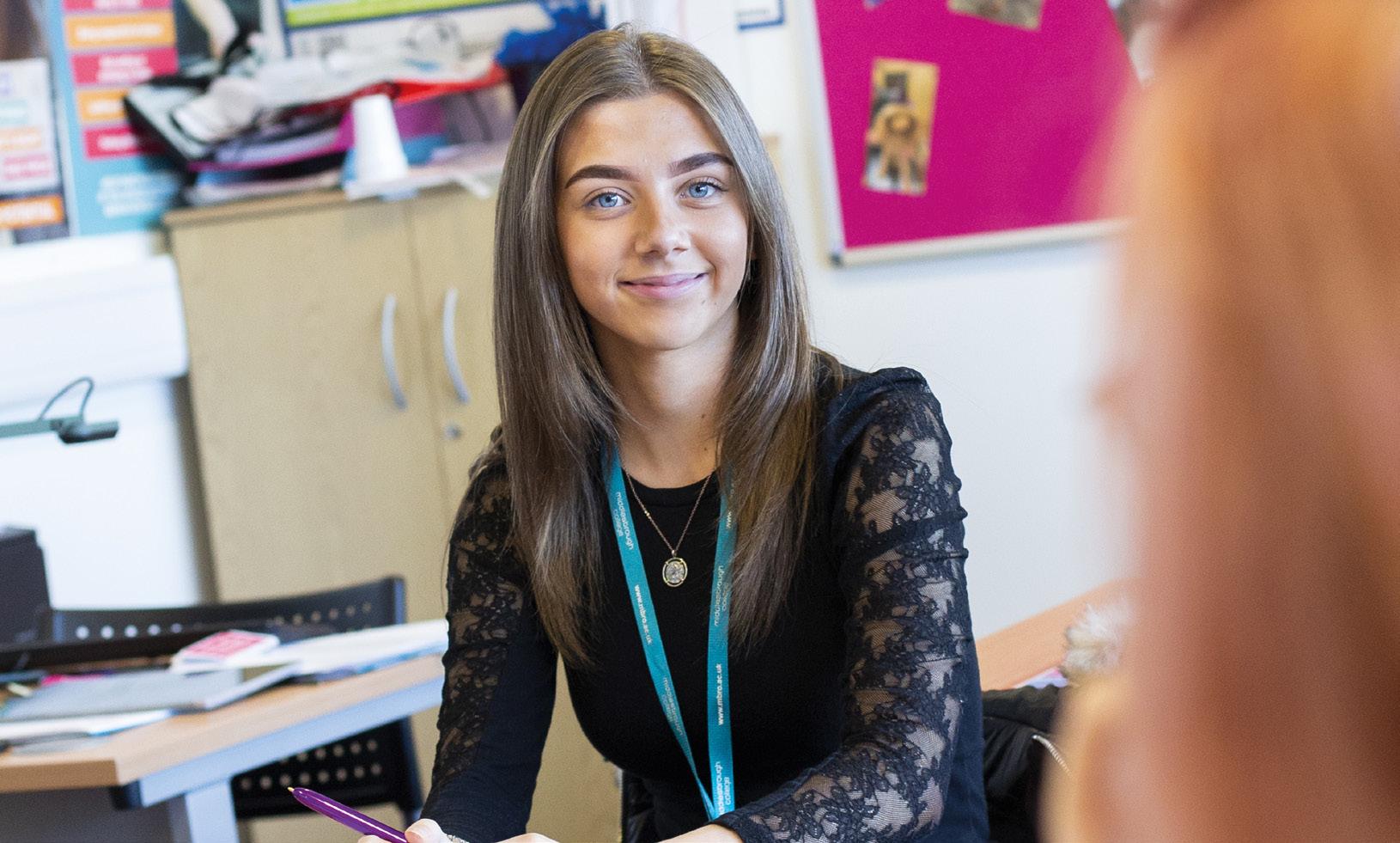
3
4 5
Choose your pathway
A Levels
Choose 3 A Levels to make up your study programme.
A Levels are a great option if you are looking to progress to University. They allow you to keep your options open with focused study of three or four subjects across two years. A Levels are assessed through examinations.
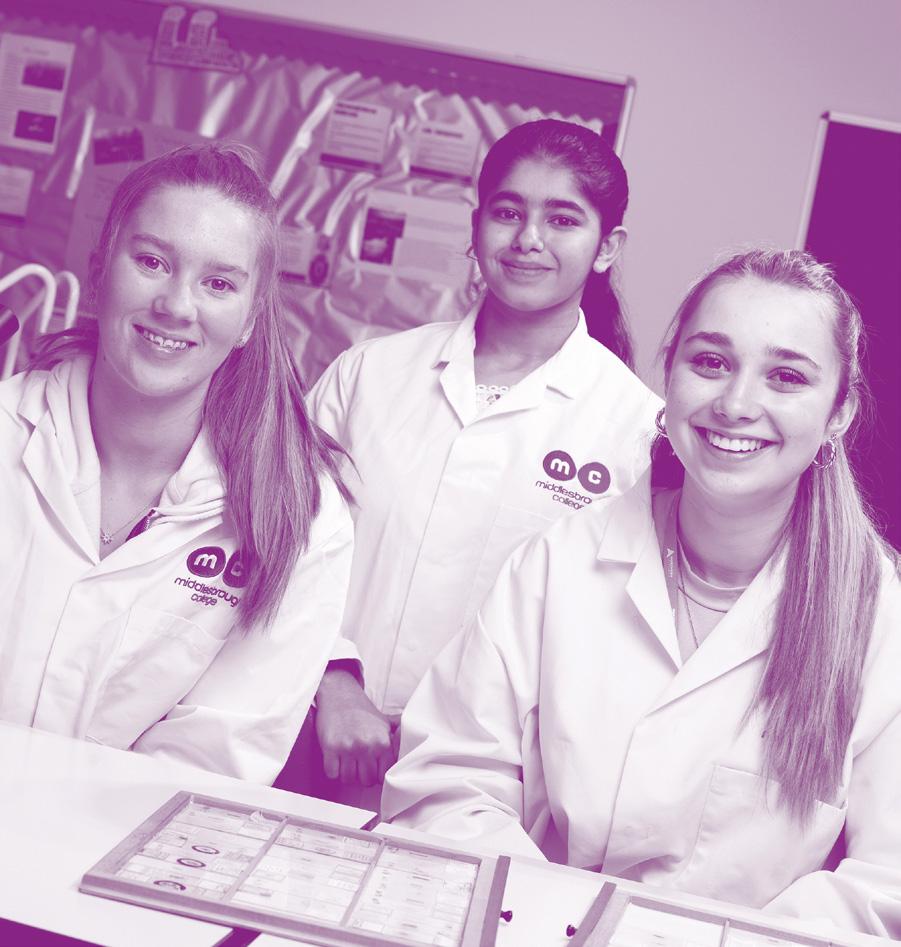
A Level Mix it up programme
Choose either 2 A Levels and 1 BTEC or applied subject or 2 BTEC or applied subjects and 1 A Level.
Our Mix It Up programme allows you to combine A Levels with an A Level equivalent to create a solid foundation for further academic study.
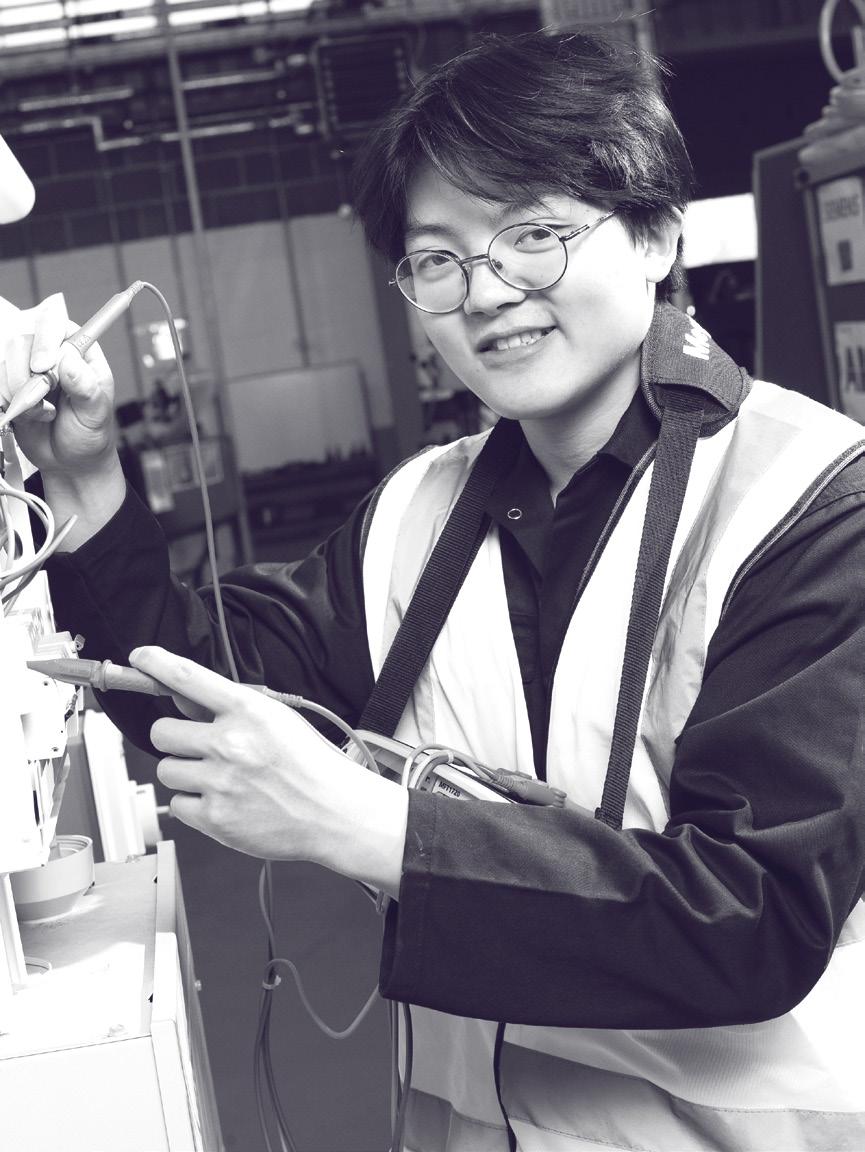
4
Elle
Elle Birkbeck - A Levels (Mix it up)
Previous School: Rye Hills Academy
Ellie is progressing to a Business Management Degree Apprenticeship programme with Dunelm.
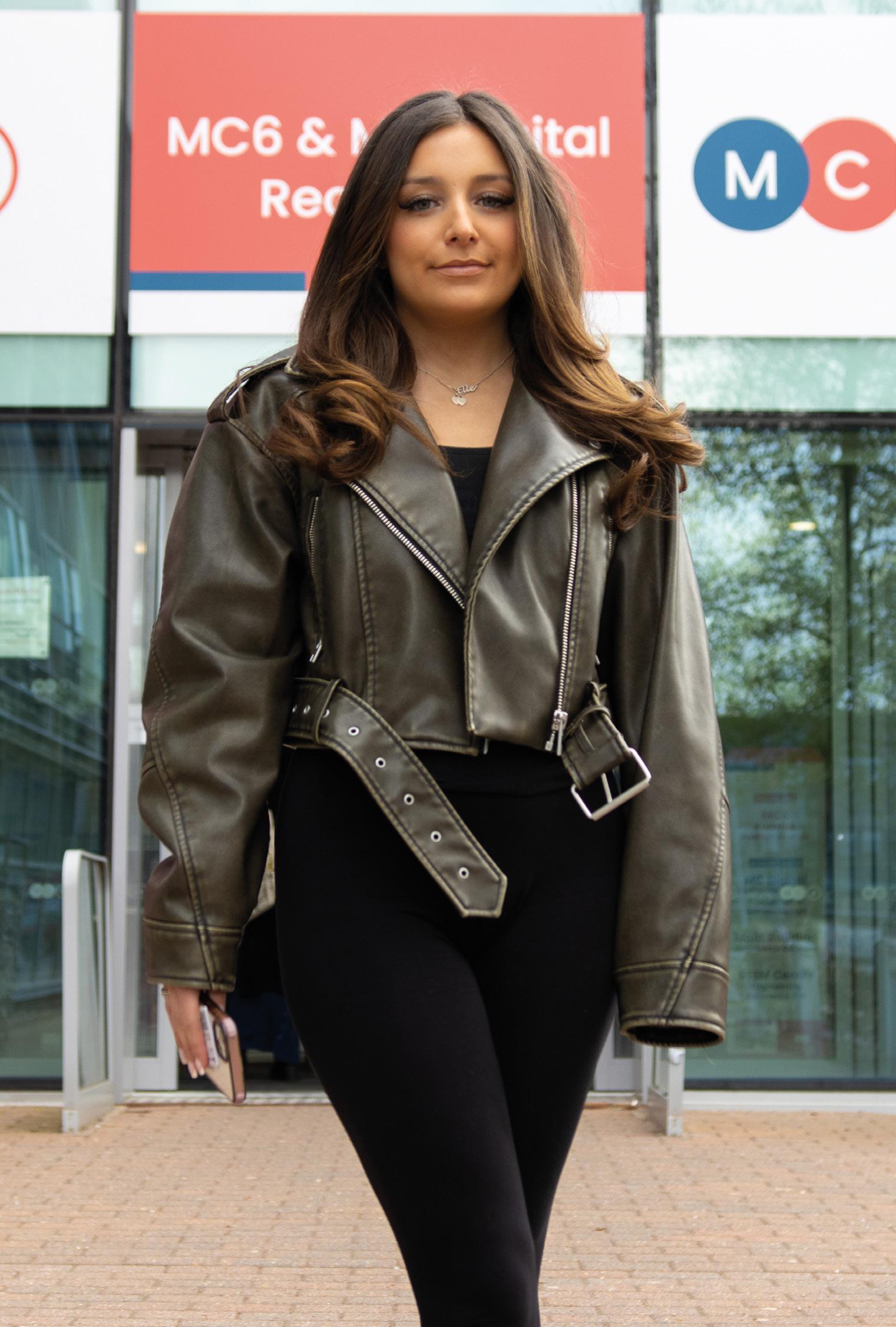
“
I’ve loved my time here at Middlesbrough College and I’ve met so many people and made friends for life. I’d definitely recommend coming to study here, you get a level of independence that you usually wouldn’t find at more traditional sixth forms.”

5
We did it!
1. Over 50% of A Level students achieved high grades
3. Outstanding 1:1 support for students
2. 94% of full-time students secured a positive destination after completing their courses
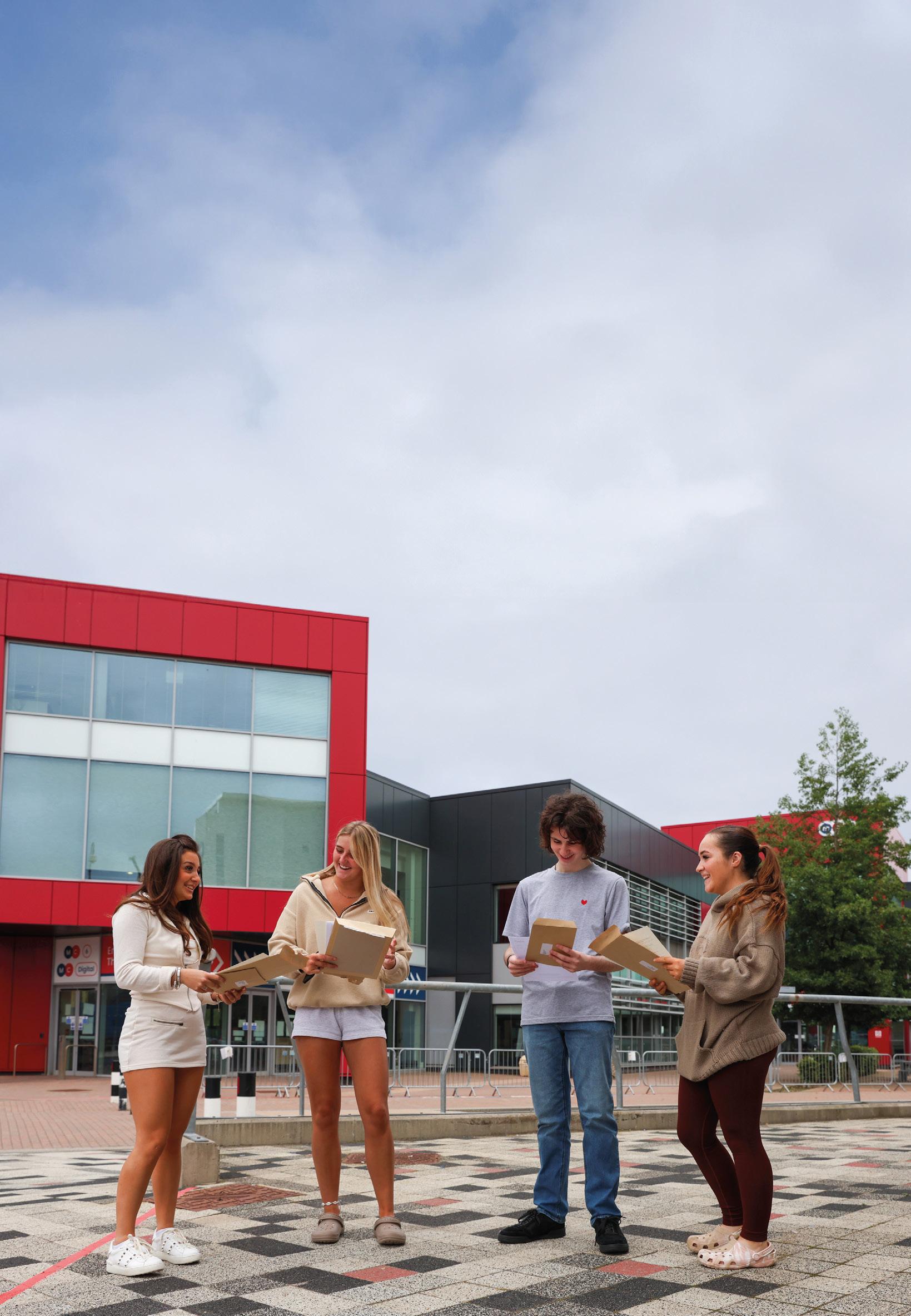
4. Over 1,000 students apply to University each year
5. Almost 80% of students successfully gained a place at their University of choice in August 2023
6. We are Ofsted rated Good
6
Aaron
Aaron Burton – A Levels
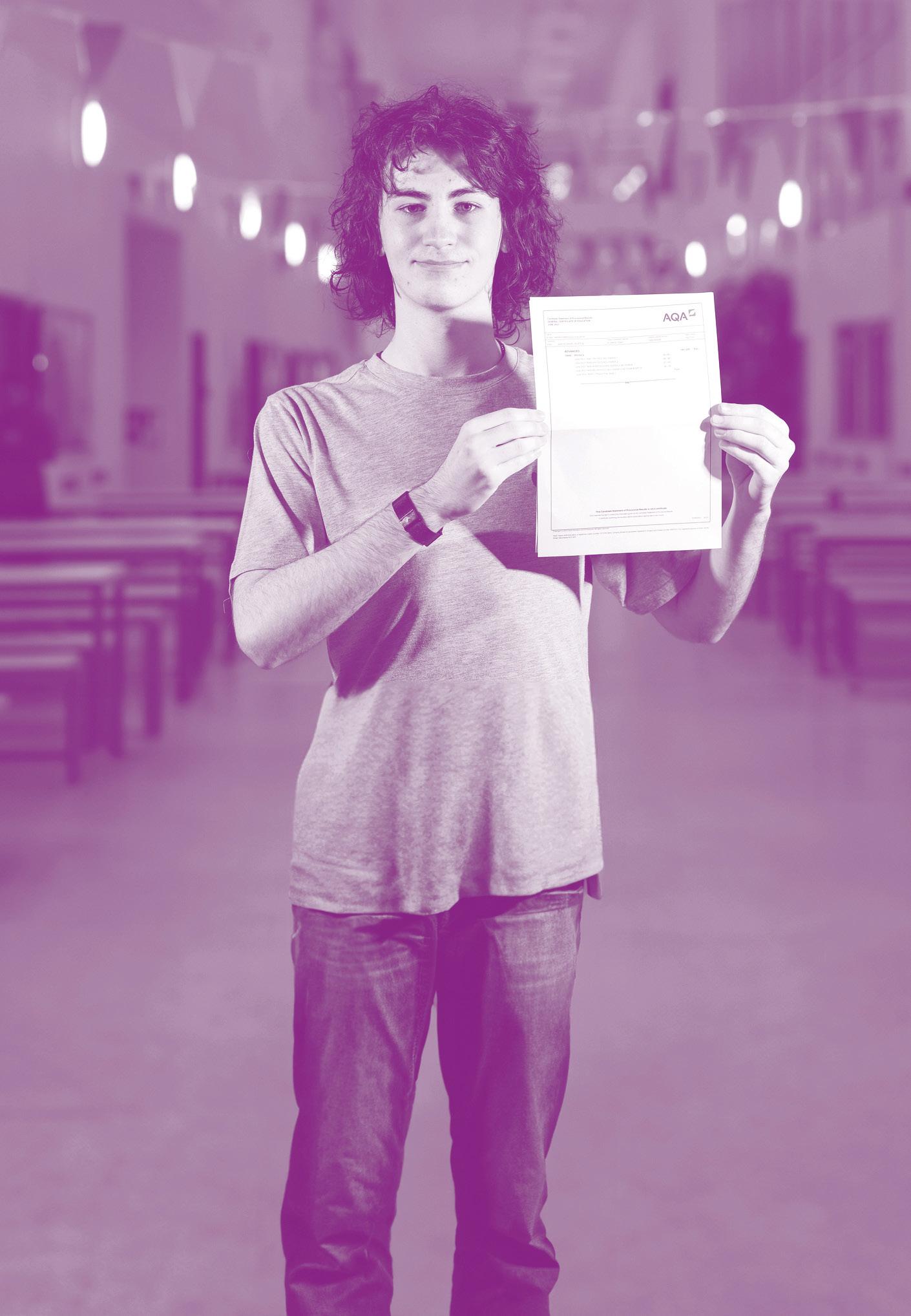
Aaron Burton has secured A* in both Maths and Further Maths and A in Physics, and is now heading to Durham University to study Maths and Statistics.
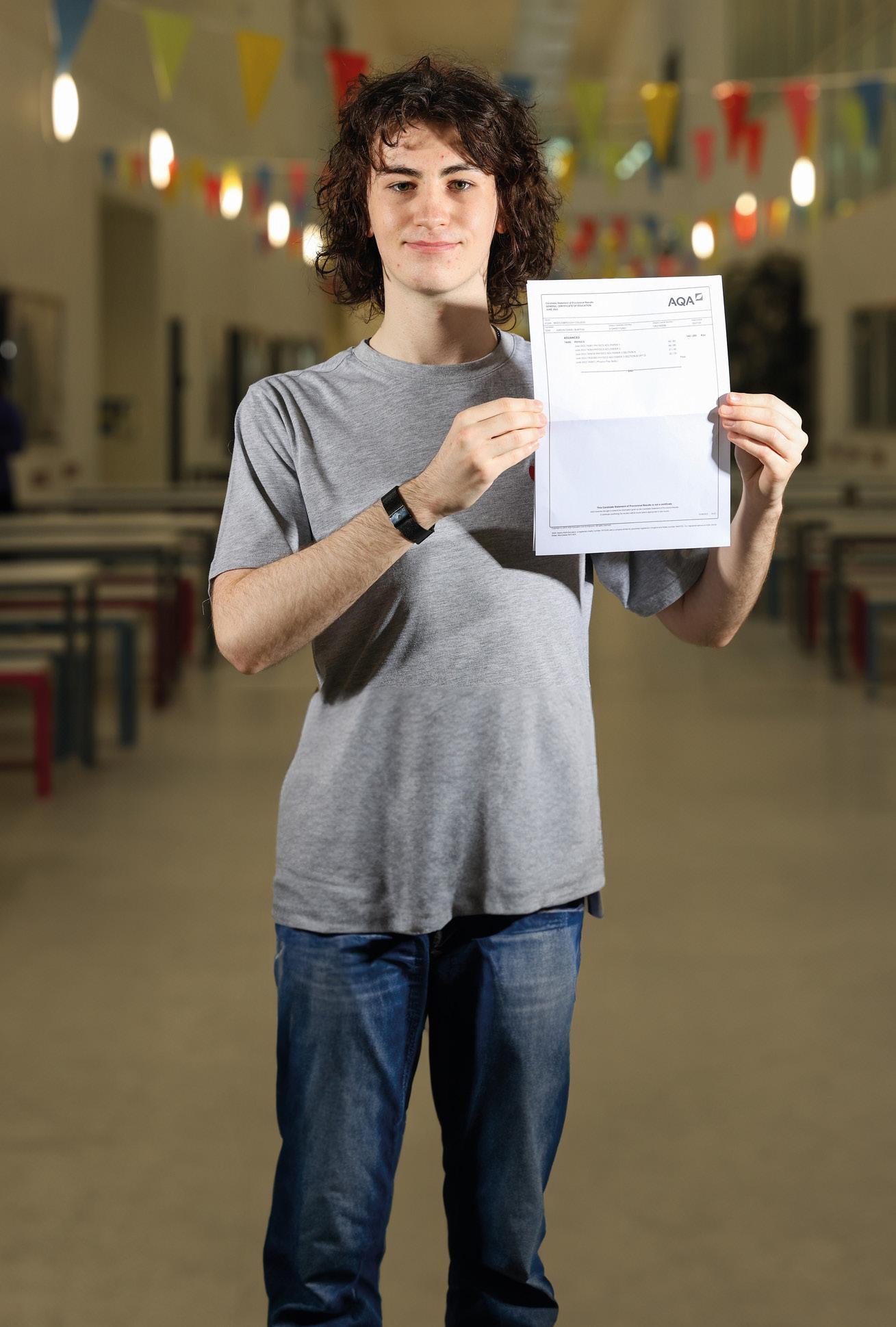
“The support I’ve had from my tutors here at the College has been great, they’ve given me the guidance I needed to succeed in my A Levels and built my confidence when I was struggling.
I’m so pleased with my results, and can’t wait to get to Durham University and eventually launch a career in statistics.”
7
students higher Taking our
We are so proud of our students! Many progress to University or to degree apprenticeships after completing their A Levels. We love to hear about their success, and we love to stay in touch with them once they leave us. You can find out more about our alumni online.
Aimee Wood – A Levels
Previous school: Longfield Academy
Aimee has accepted an offer to study Medicine and Surgery at Newcastle University.
“I attended an Open Event when I was in Year 10 and from then I had my heart set on coming here. I loved the whole vibe of the College, the facilities were great, everyone was so welcoming, and I just felt like Middlesbrough College offered something different.”
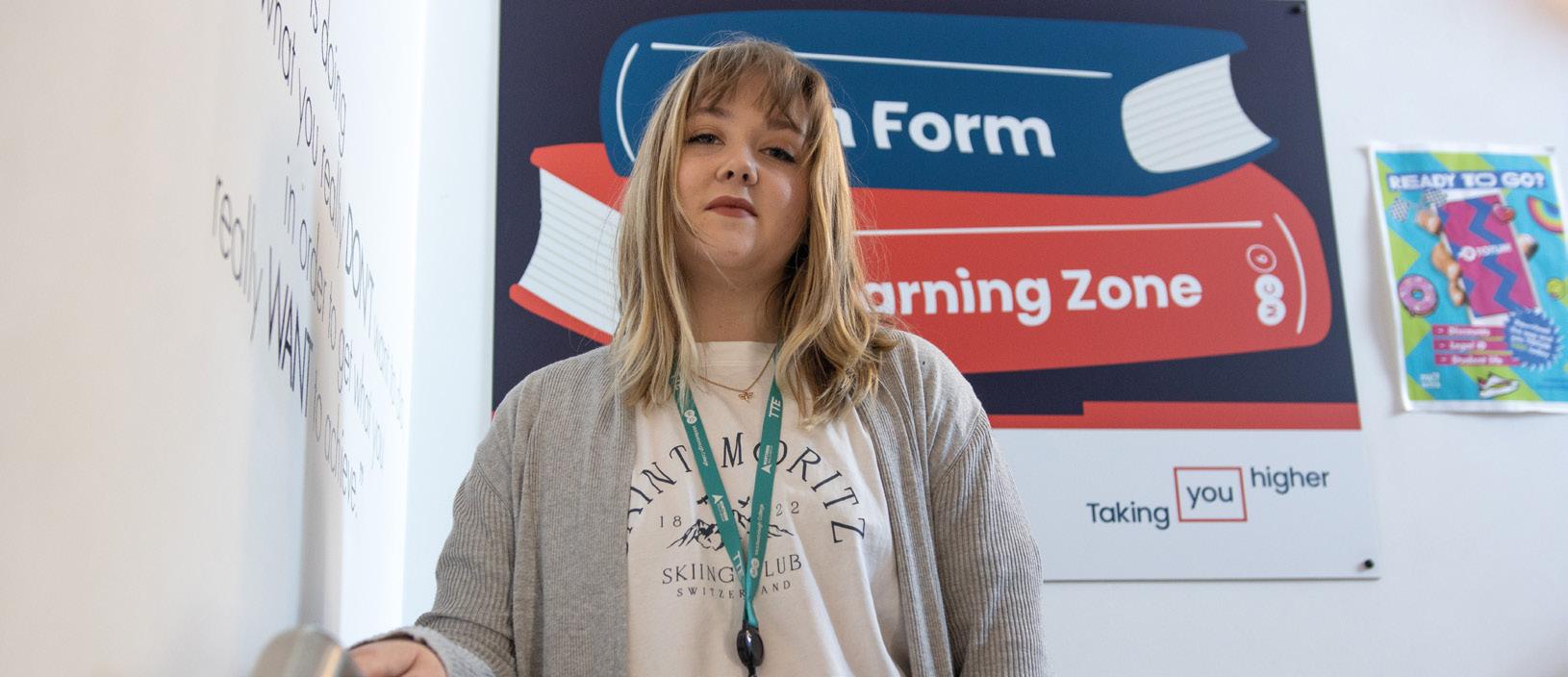
8
Aimee
Harley Mason – A Levels
Previous school: The Kings Academy
Harley is progressing to study for a Professional Economist degree apprenticeship with the Bank of England. He will be based in London and complete his economics degree with the University of Kent.
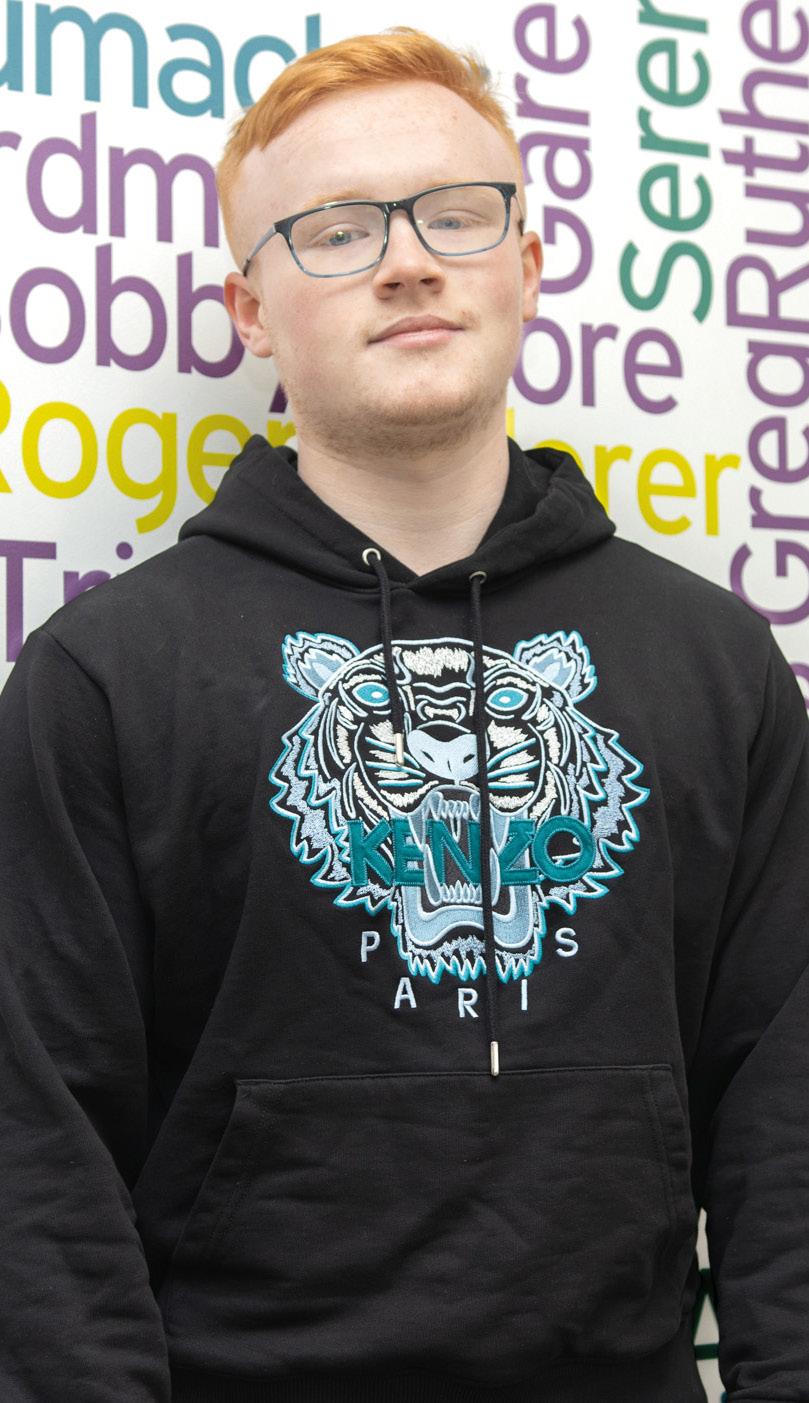
“
My experience at the College has been great, my tutors have been so helpful and supportive. I’m looking forward to starting my apprenticeship and my career. I’ve always had an interest in banking and finance and knew that it’s what I wanted to go into.”
Kieron Ezard A Levels (Mix it up)
Previous school: Acklam Grange
Kieron studied A Levels in 2018 and is now a Head of Year at St Peter’s Catholic College, looking after their pastoral and wrap around support.
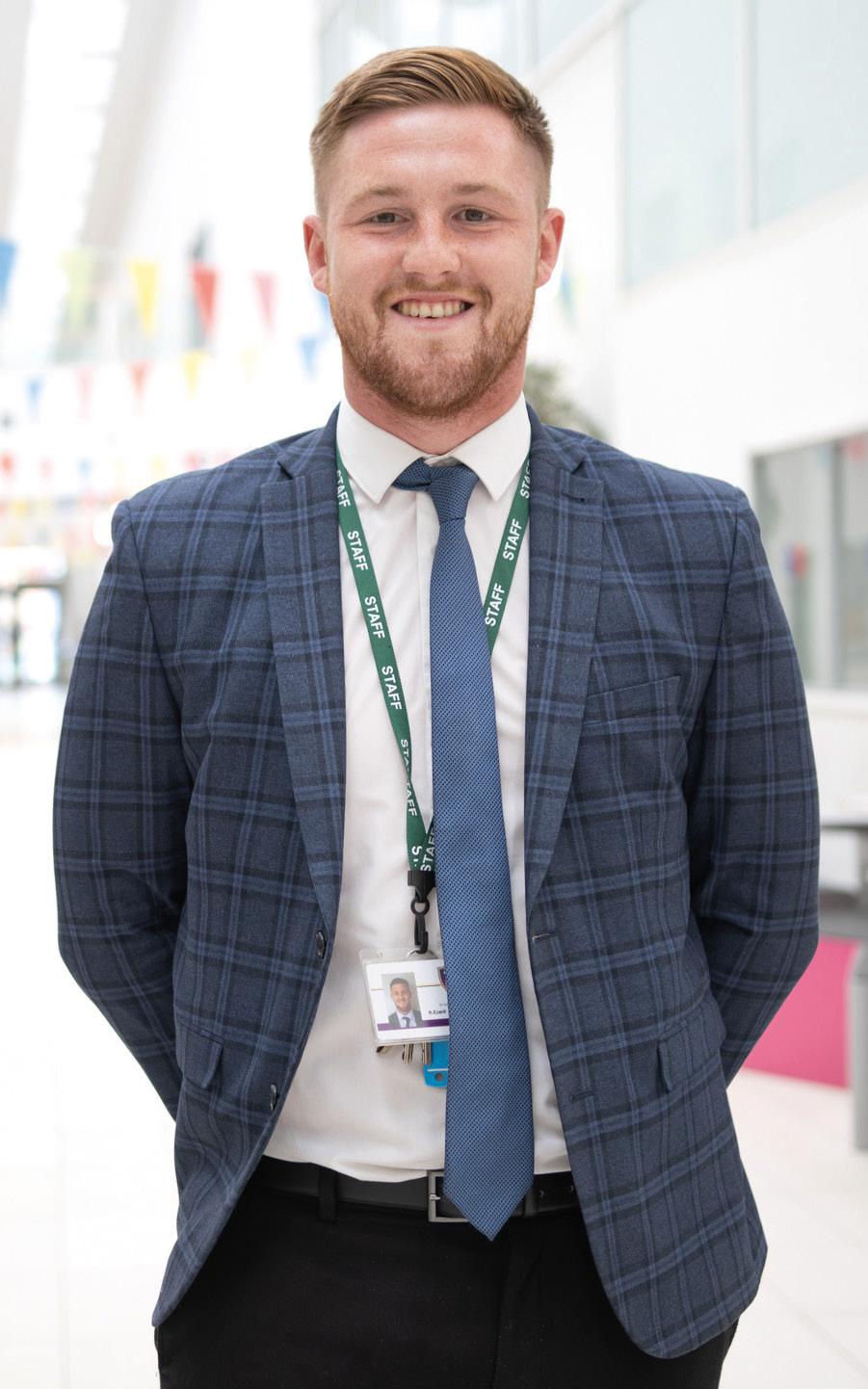
“
I would absolutely recommend studying at Middlesbrough College! I had a very positive experience studying here and I wouldn’t be working in a teaching or education-based role without the support of the Middlesbrough College tutors.”
9
Harley
Kieron
A Level Courses
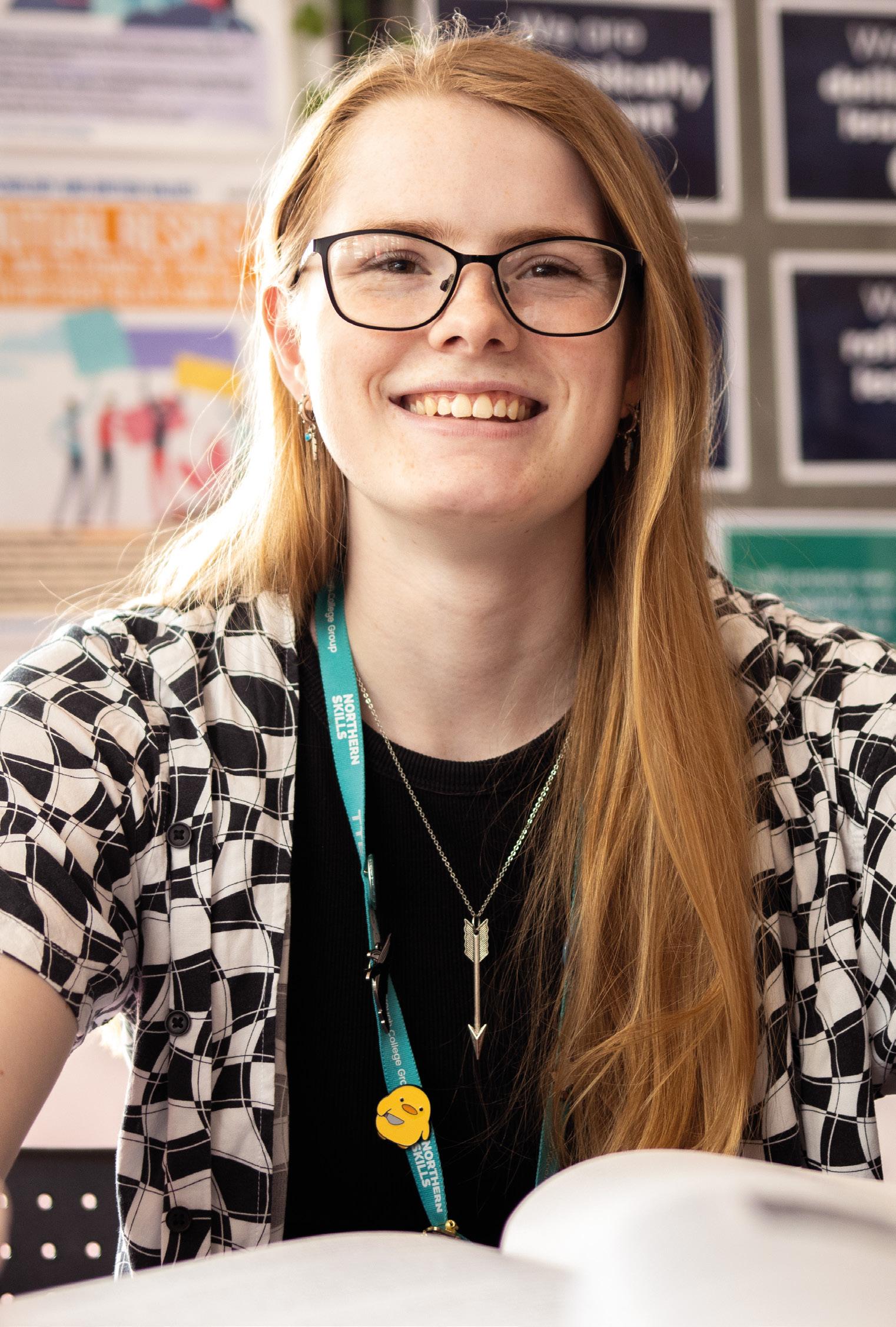
For full course information and to apply, head to our website!
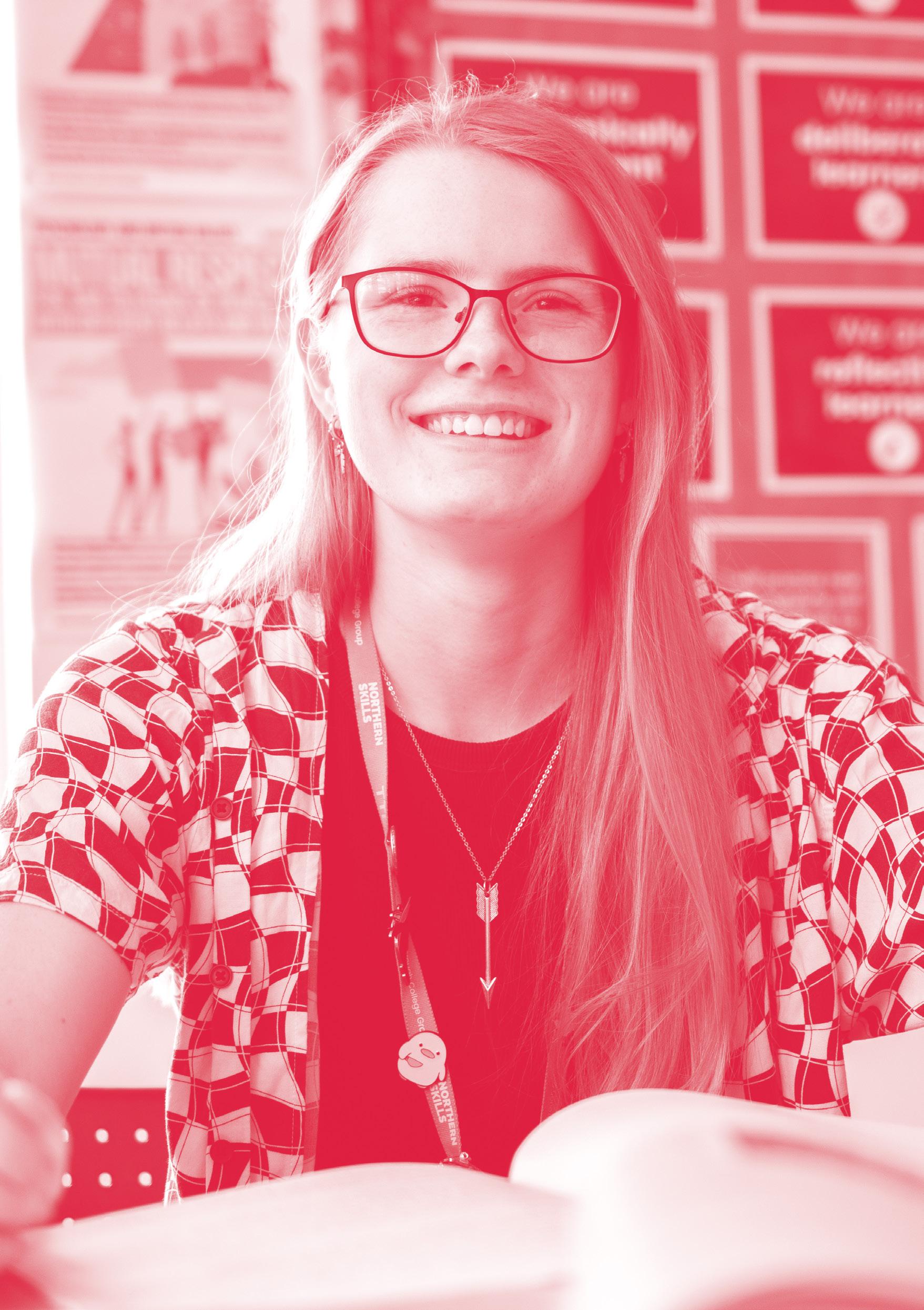
10
13 Biology
14 Business
15 Chemistry
16 Computer Science
17 English Language
18 English Literature
21 Environmental Science
22 Film Studies
23 Fine Art
24 Further Mathematics
25 Geography
26 Geology
27 History
28 Law
29 Mathematics
30 Media Studies
31 Physics
32 Photography
33 Politics
34 Psychology
35 Sociology
94% of our A Level students progress to positive destinations!
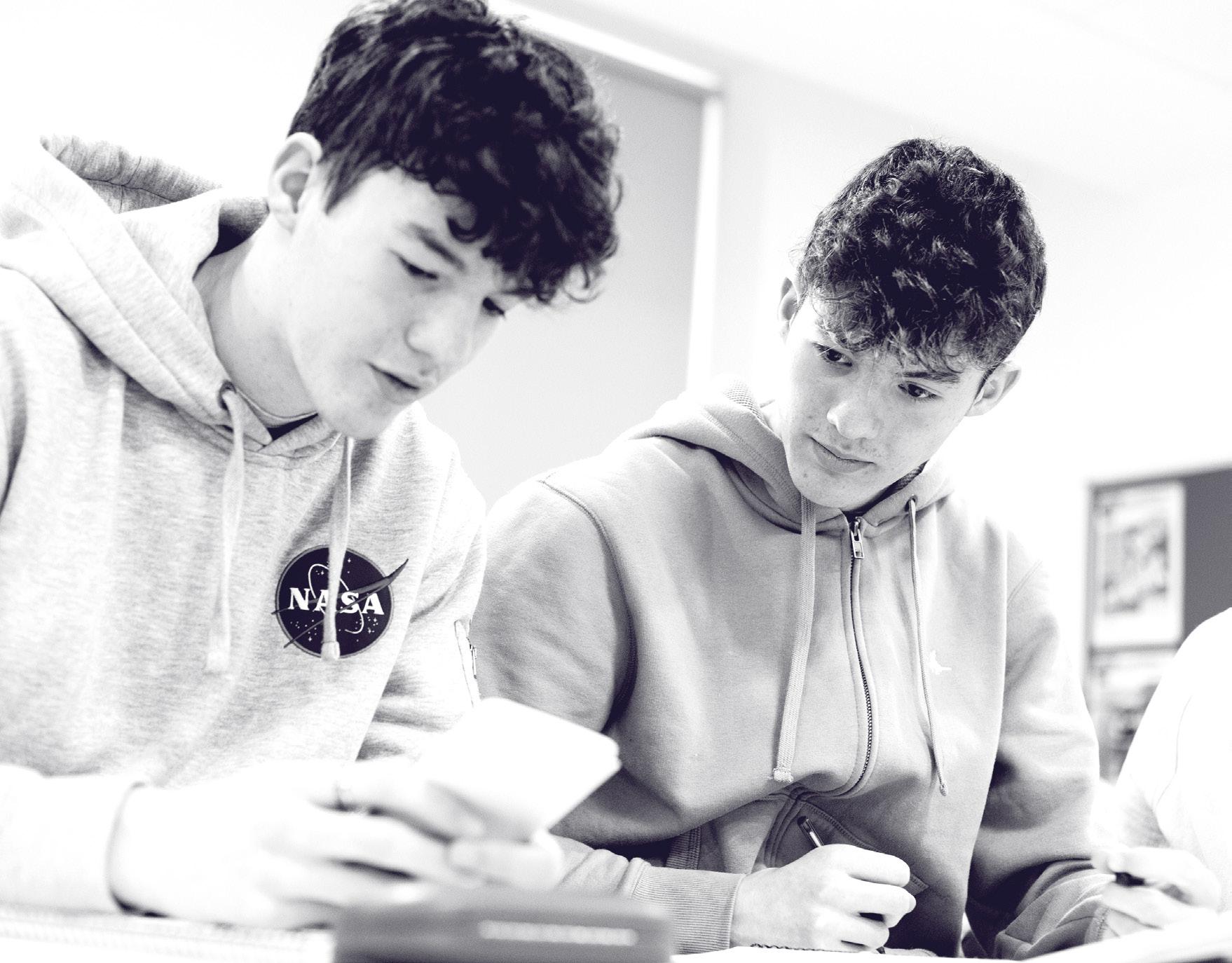
11
Denisa
Denisa Sandu - A Levels
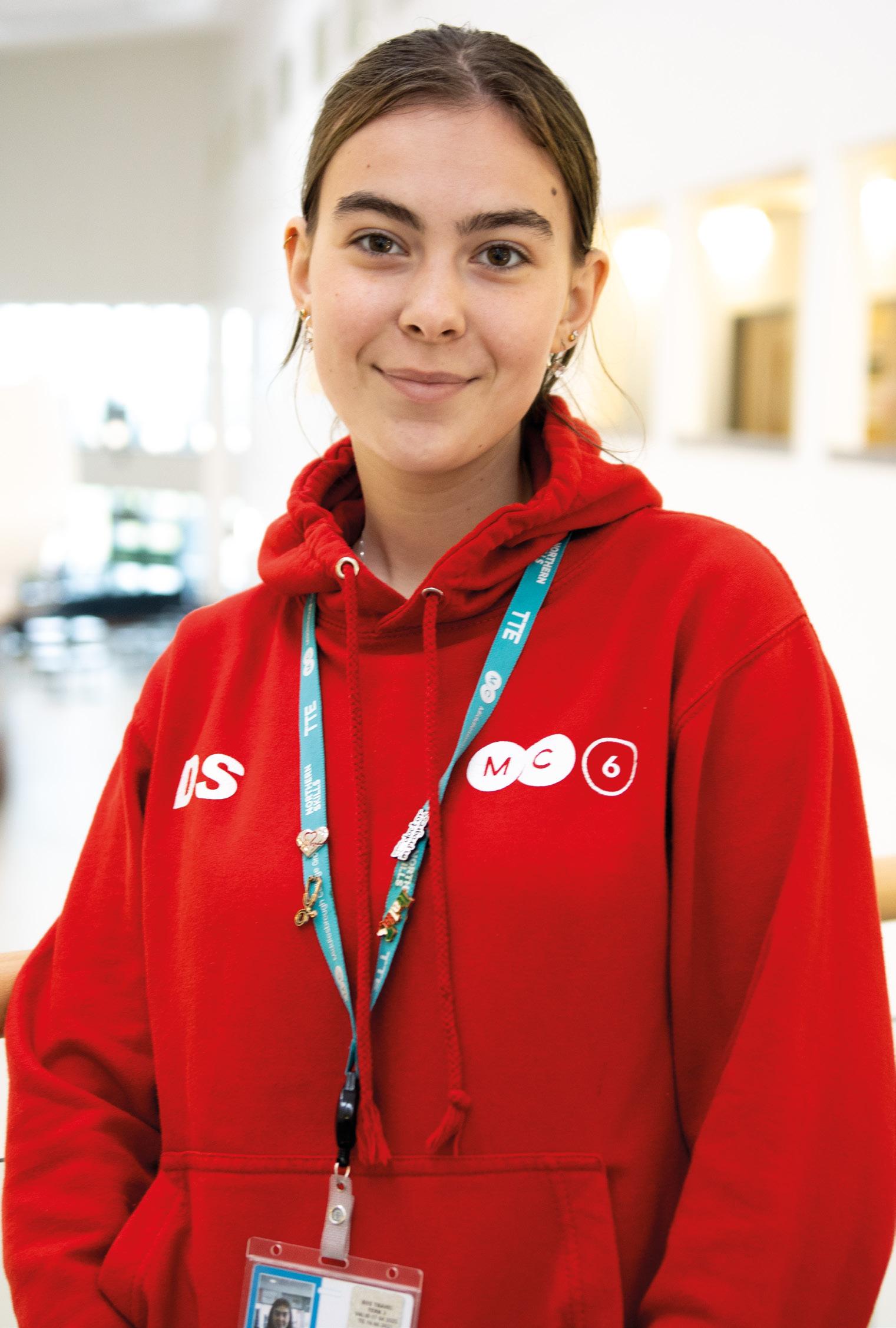
“There’s lots you can do at MC6 outside of your studies which is great and very different to what I’ve experienced before. I study British Sign Language as part of my enrichment programme, which I think is useful.”

12
Biology
Biology, like all sciences, is a practical subject. Throughout the course you will carry out a range of practical investigations that will give you the skills and confidence to draw conclusions and evaluate the way living things work and behave. Modules offered include biological molecules, DNA & enzymes, cell structures and cell division, immune system, ecosystems, gene technology, biodiversity, inheritance and genetics, and more.
What can I do next?
Career opportunities:
These include conservationist, dentist, doctor, marine biologist, nurse, paramedic, pharmacologist, research scientist, teacher and vet.
Entry requirements:
Five GCSEs at grade 5 or above, including GCSE English language and mathematics.
GCSE Science grade 66 (combined science) or GCSE Biology grade 6 (separate).
University opportunities:
Past students have progressed to study degrees in dentistry, biochemistry, biomedical sciences, environmental science, biology, medicine, radiography, sport & exercise science, physiotherapy and zoology.
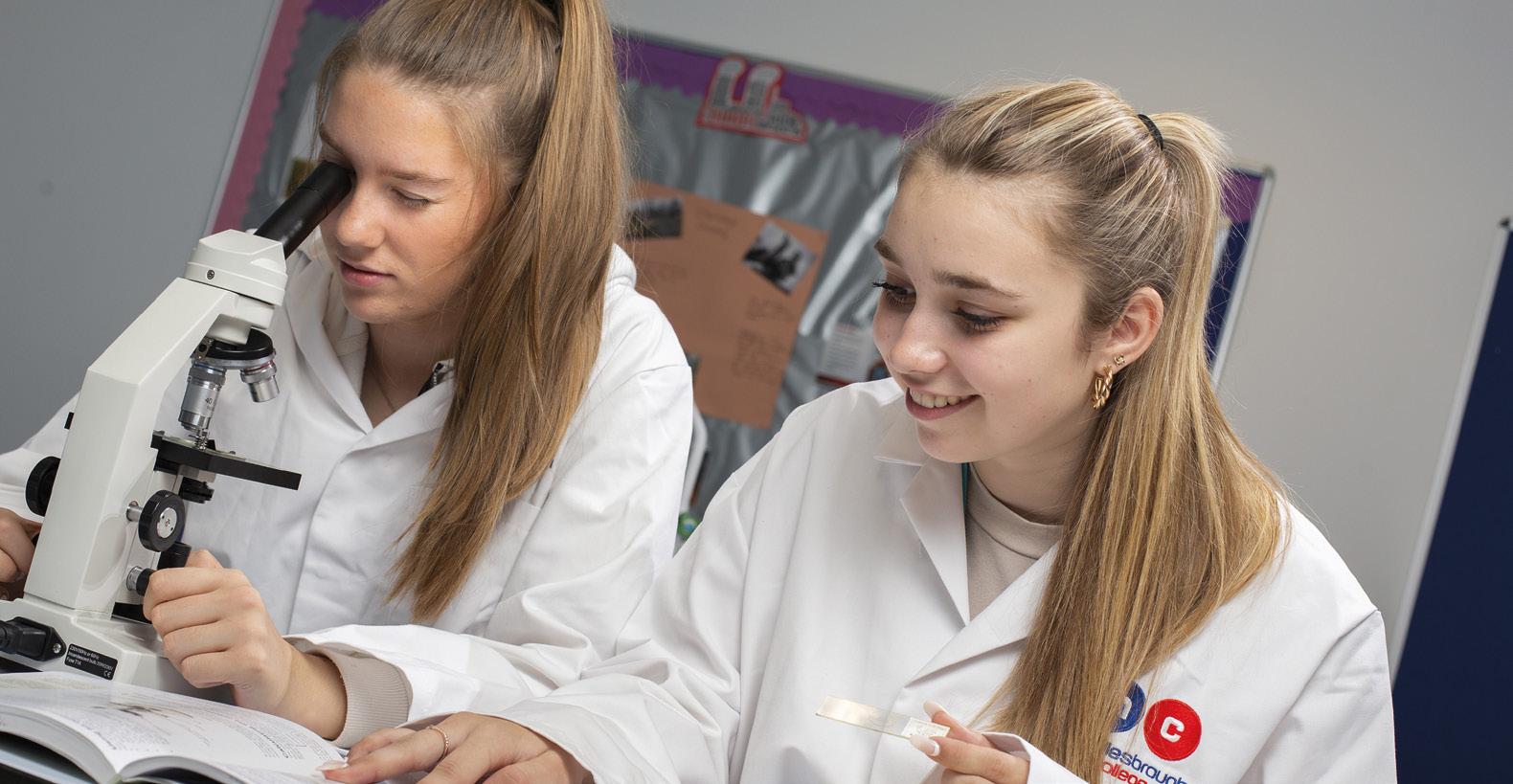
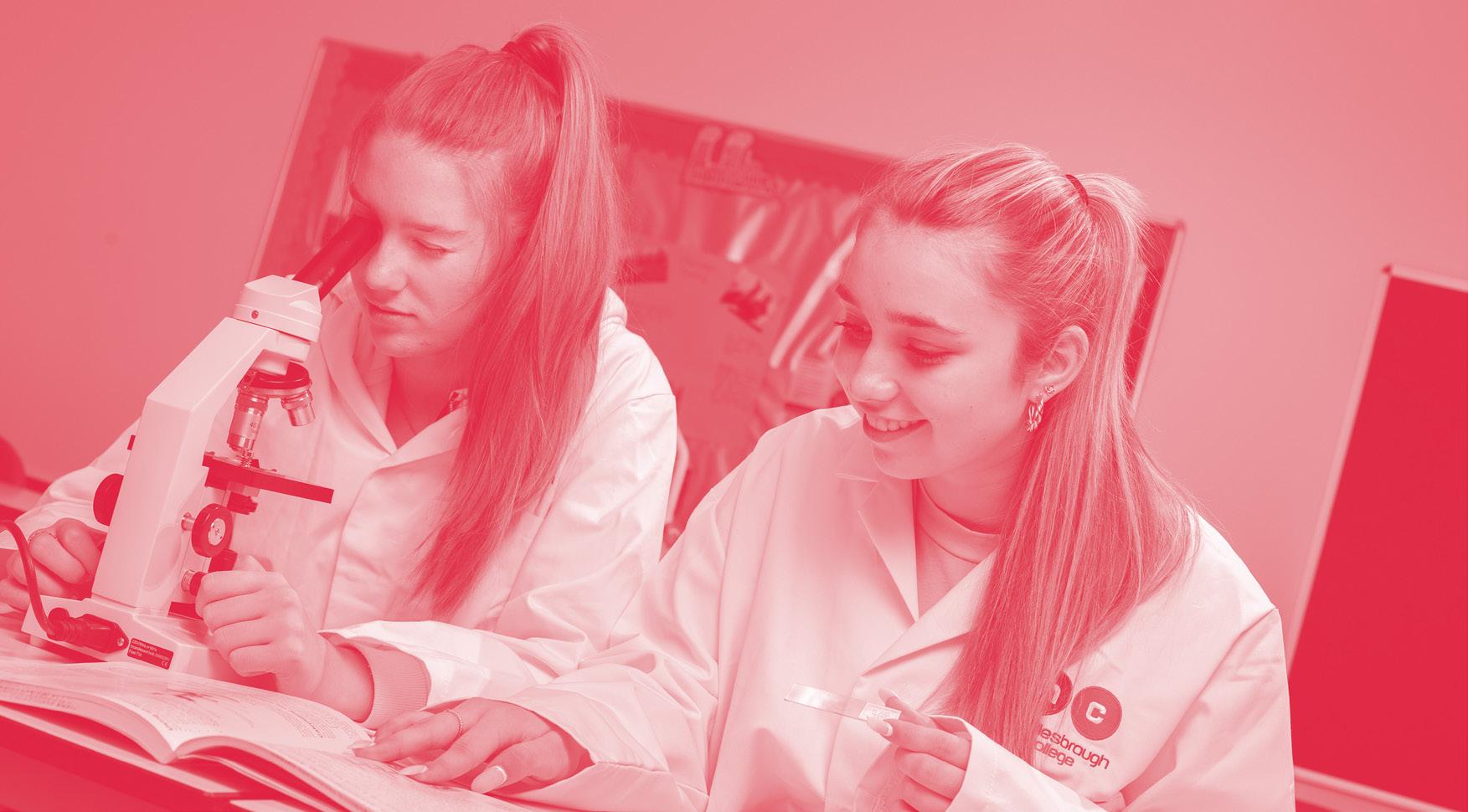
13
2 years – AQA
2 years – Pearson
Business
This course will encourage you to develop a critical understanding of business organisations, the context in which they operate and the markets they serve. You will gain an insight into the world of business and how they operate both internally and externally. You will study marketing and people, managing business activities, business decisions and strategy, and global business.
What can I do next?
Career opportunities:
These include financial management, public relations professional, business, research or administrative professional, research, economist, statistics, accountancy and project management.
Entry requirements:
Five GCSEs at grade 5 or above, including GCSE English language and mathematics.
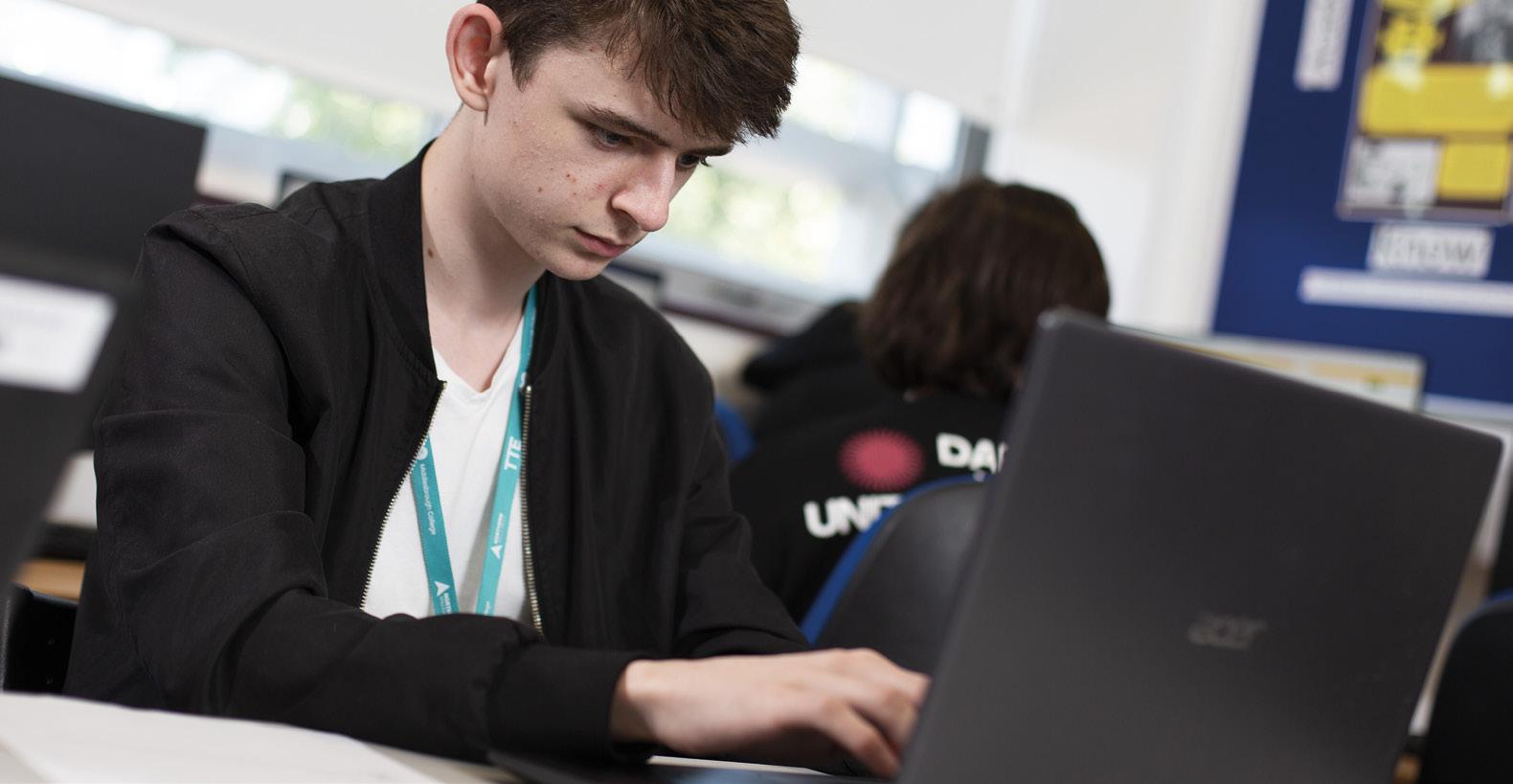
University opportunities:
Past students have progressed to study degrees in business, human resource management, marketing and enterprise, business management, and international business management.
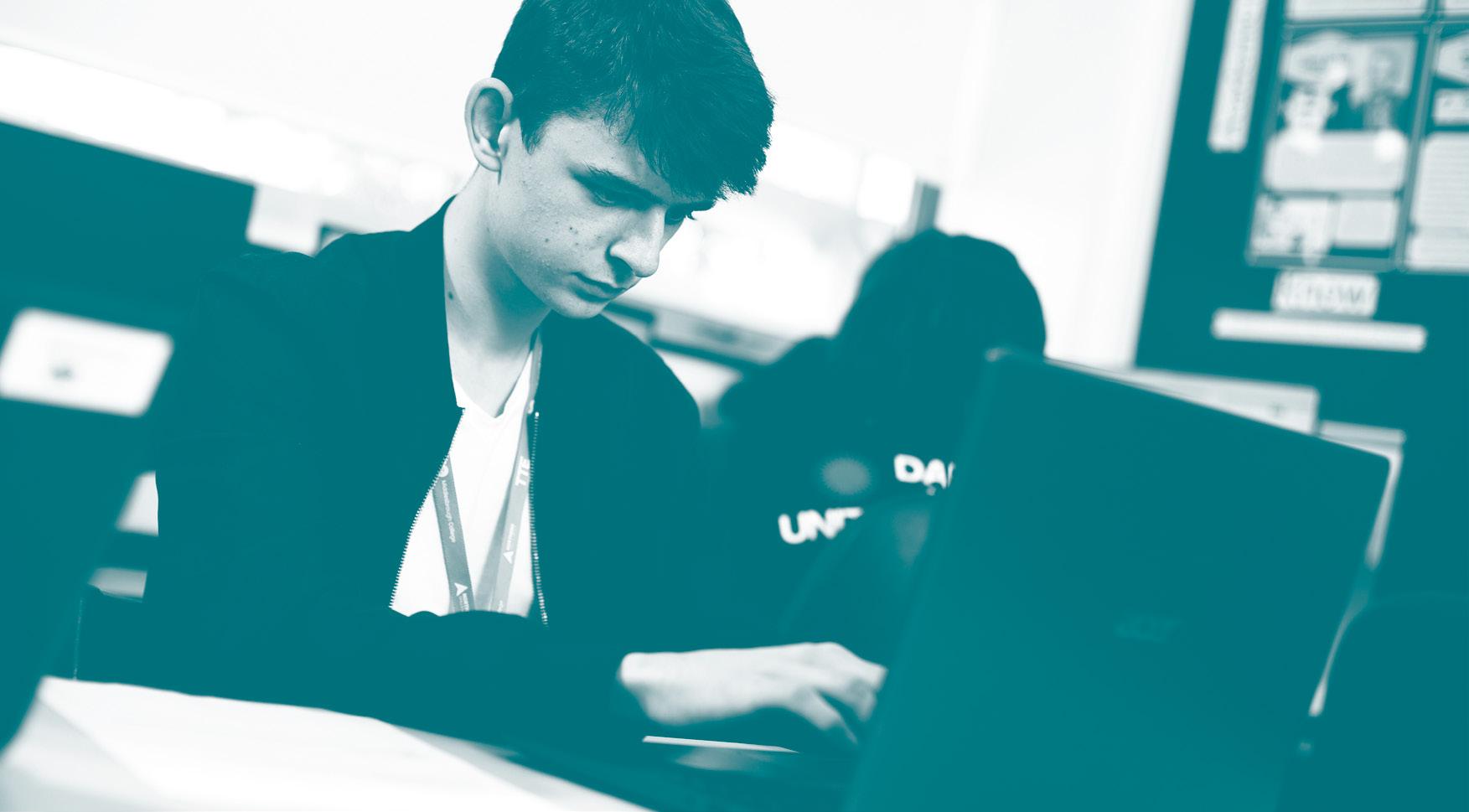
14
Edexcel
Chemistry
A Level chemistry will give you an insight into the contemporary world of chemistry. Key concepts of chemistry and practical skills are integrated throughout the course. This combination of academic challenge and practical focus makes the prospect of studying this subject highly appealing. You will learn about chemistry in a range of different contexts and the impact it has on industry and many aspects of everyday life. The course will develop your investigative and problem-solving skills using a wide range of different scenarios.
What can I do next?
Career opportunities:
These include chemical, manufacturing and pharmaceutical industries and in areas such as forensics, environmental protection and healthcare.
2 years –
Entry requirements:
Five GCSEs at grade 5 or above, including GCSE English language and mathematics.
GCSE Science grade 66 (combined science) or GCSE Chemistry grade 6 (separate).
University opportunities:
A Level Chemistry forms part of an excellent basis for a university degree in healthcare such as medicine, pharmacy and dentistry as well as the biological sciences, physics, mathematics, pharmacology and analytical chemistry.
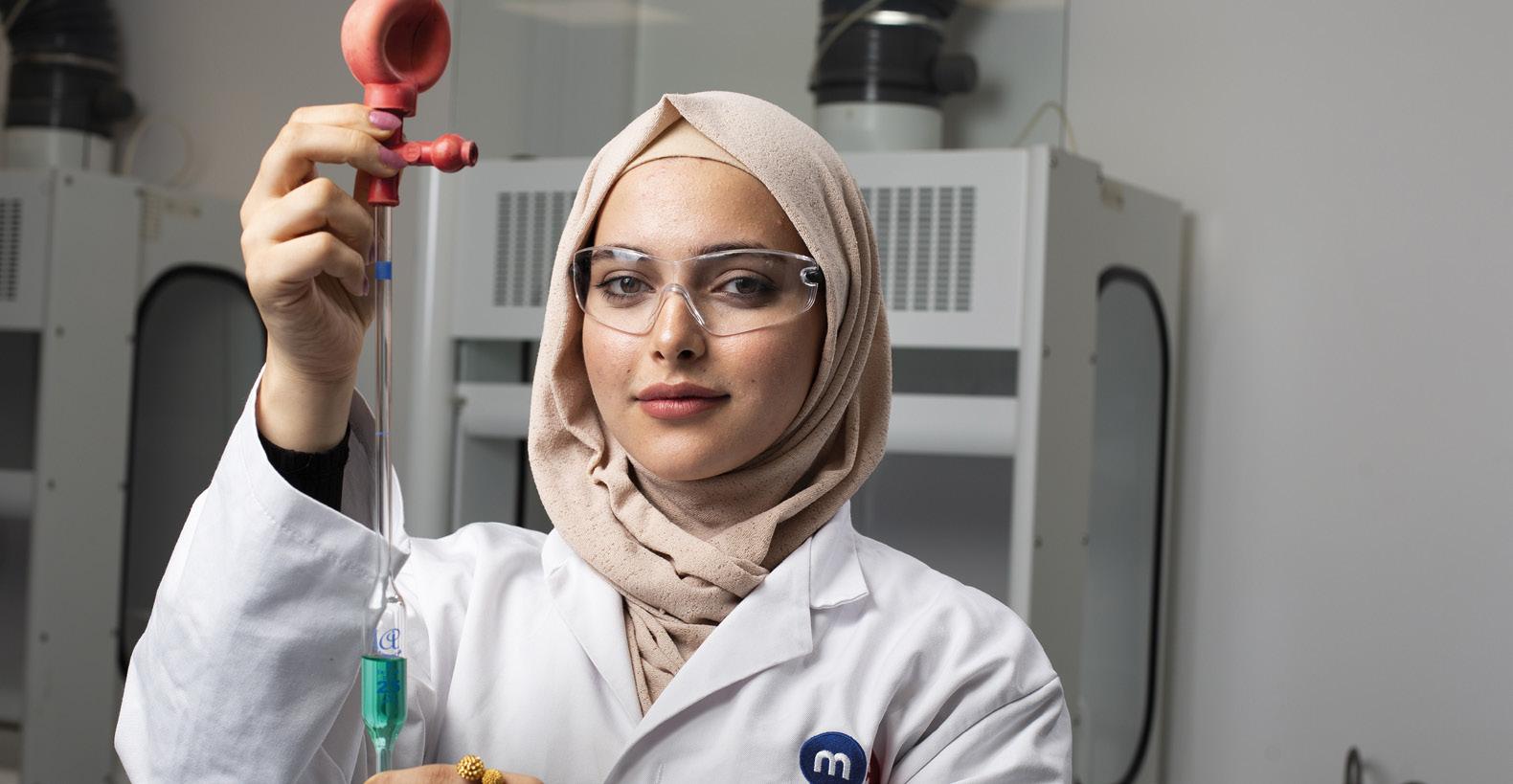
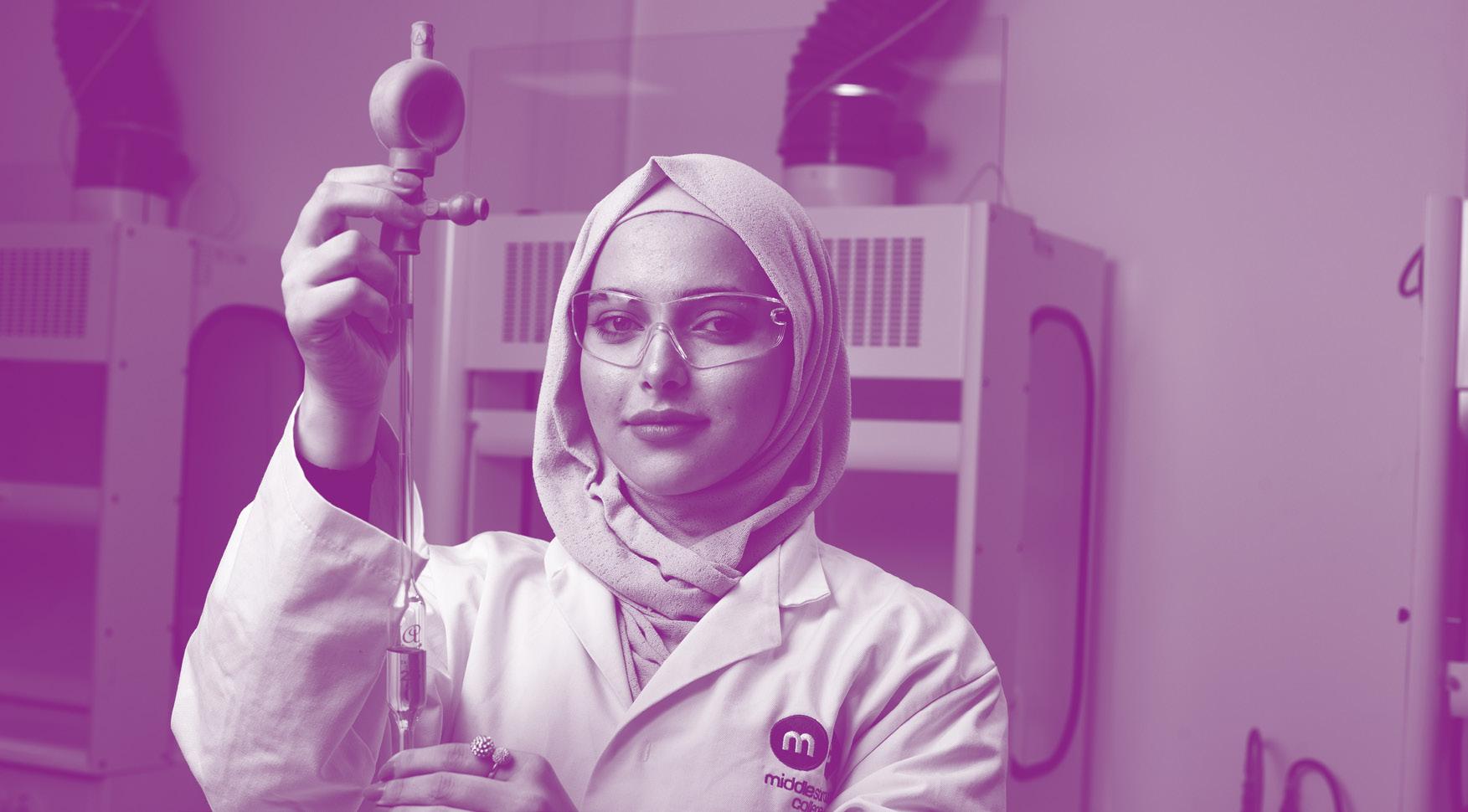
15
OCR
Computer Science
A Level computer science is not about learning to use tools or software; rather the focus is on training in a programming language, computational thinking and problem solving with 50% of the course involving practical programming. Modules offered include programming, data structures, algorithms, computer systems, networking and more!
Entry requirements: Five GCSEs at grade 5 or above, including GCSE English language. GCSE mathematics at least grade 6.
What can I do next?
Career opportunities:
These include IT business analysis, systems designer, IT engineering, web design, web development, IT consulting, IT systems management, systems analysis, games development, data analysis and programming.
University opportunities:
Past students have progressed to computer science at University, others to study maths, physics, or other degree courses. Students also progress to computing apprenticeships and have also gone into the RAF.

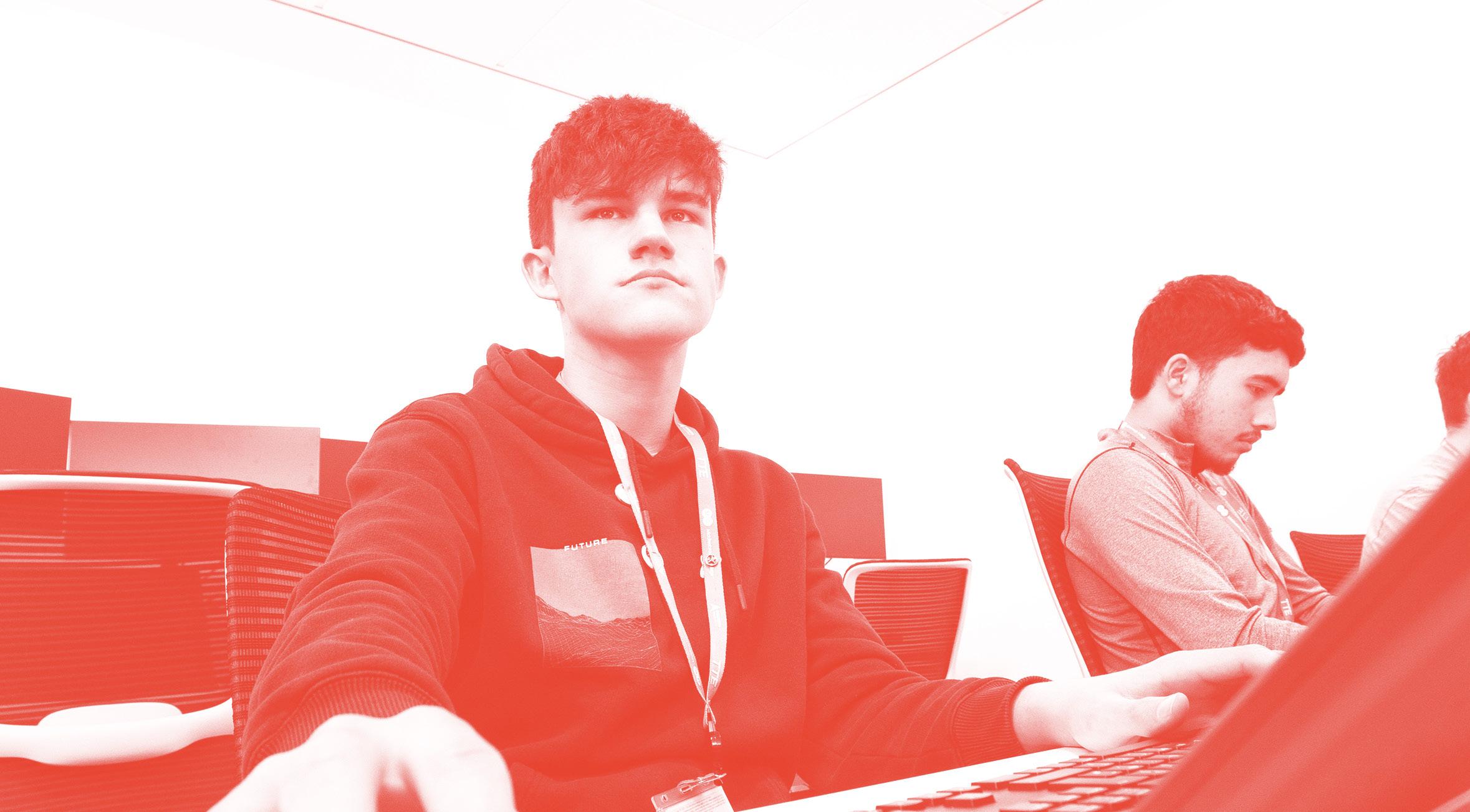
16
– AQA
2 years
English Language
Have you ever wondered how men’s use of language differs from women's? What does your accent say about you? Is texting affecting the way you read, write, and speak? How are celebrities represented through language? How many different varieties of English do you speak and write? This course will explore language, how and why English exists in so many different forms and varieties.
Entry requirements: Five GCSEs at grade 5 or above, including GCSE maths. At least a 6 in GCSE English language is also required.
What can I do next?
Career opportunities:
These include digital copywriter, editorial assistant, English as a foreign language teacher, magazine journalist, newspaper journalist and web content manager.
University opportunities:
Past students have progressed to study degrees in English, education, journalism, marketing, business, human resource management, law and public relations.

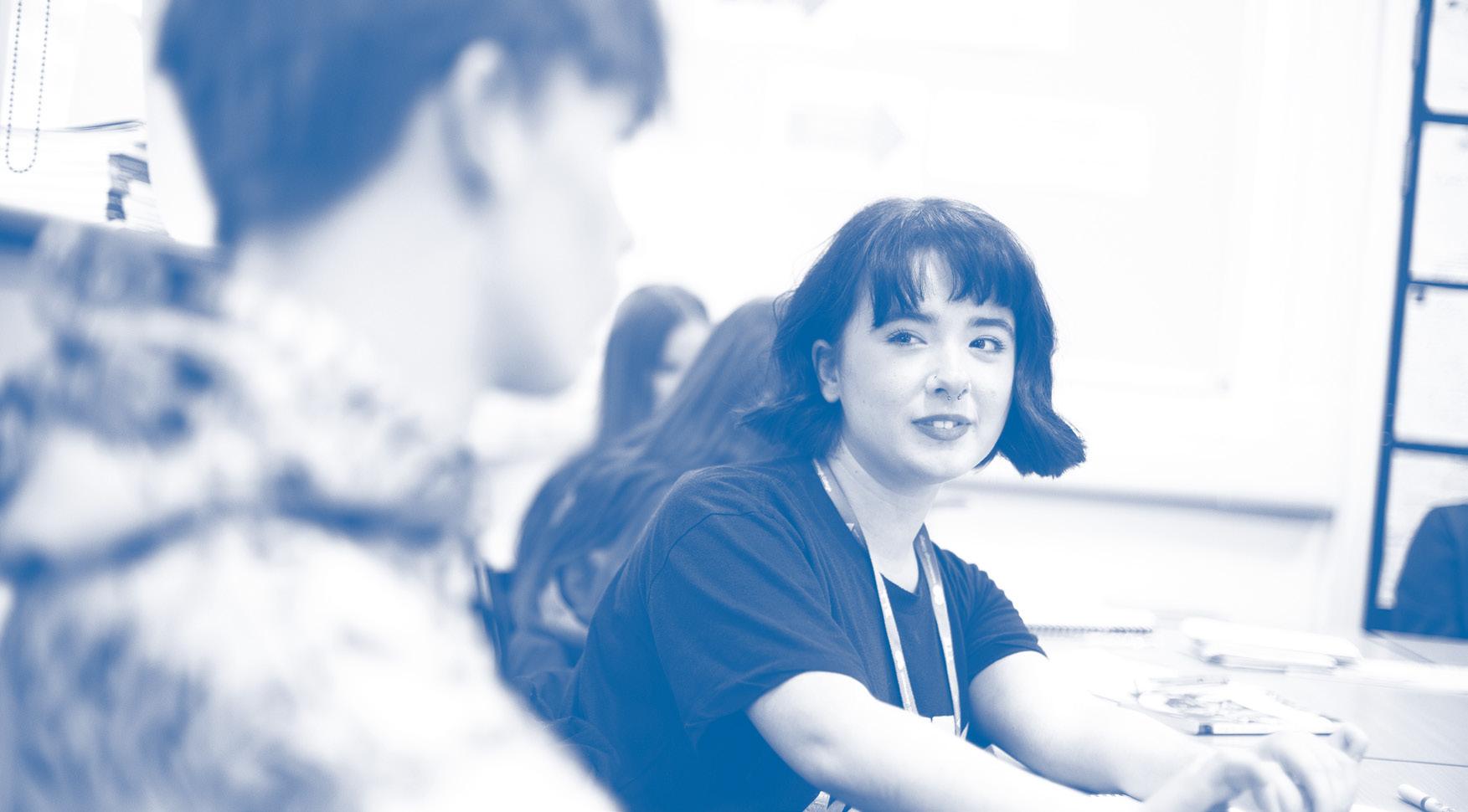
17
2 years – AQA
English Literature
On this course you will read a range of novels, plays and poetry from a variety of genres, gaining an understanding of the historical contexts of the texts as well as an overview of different literary movements throughout history. You will be able to develop your skills of analysis and your understanding of the technical terminology used in the study of literature.
Entry requirements: Five GCSEs at grade 5 or above, including GCSE maths. At least a 6 in GCSE English language is also required.
What can I do next?
Career opportunities: These include writing, management, business, law, education, publishing, media, journalism, museum service, business and the charity sector.
University opportunities:
Past students have progressed to study degrees in English, education, journalism, marketing, business, human resource management, law and public relations.

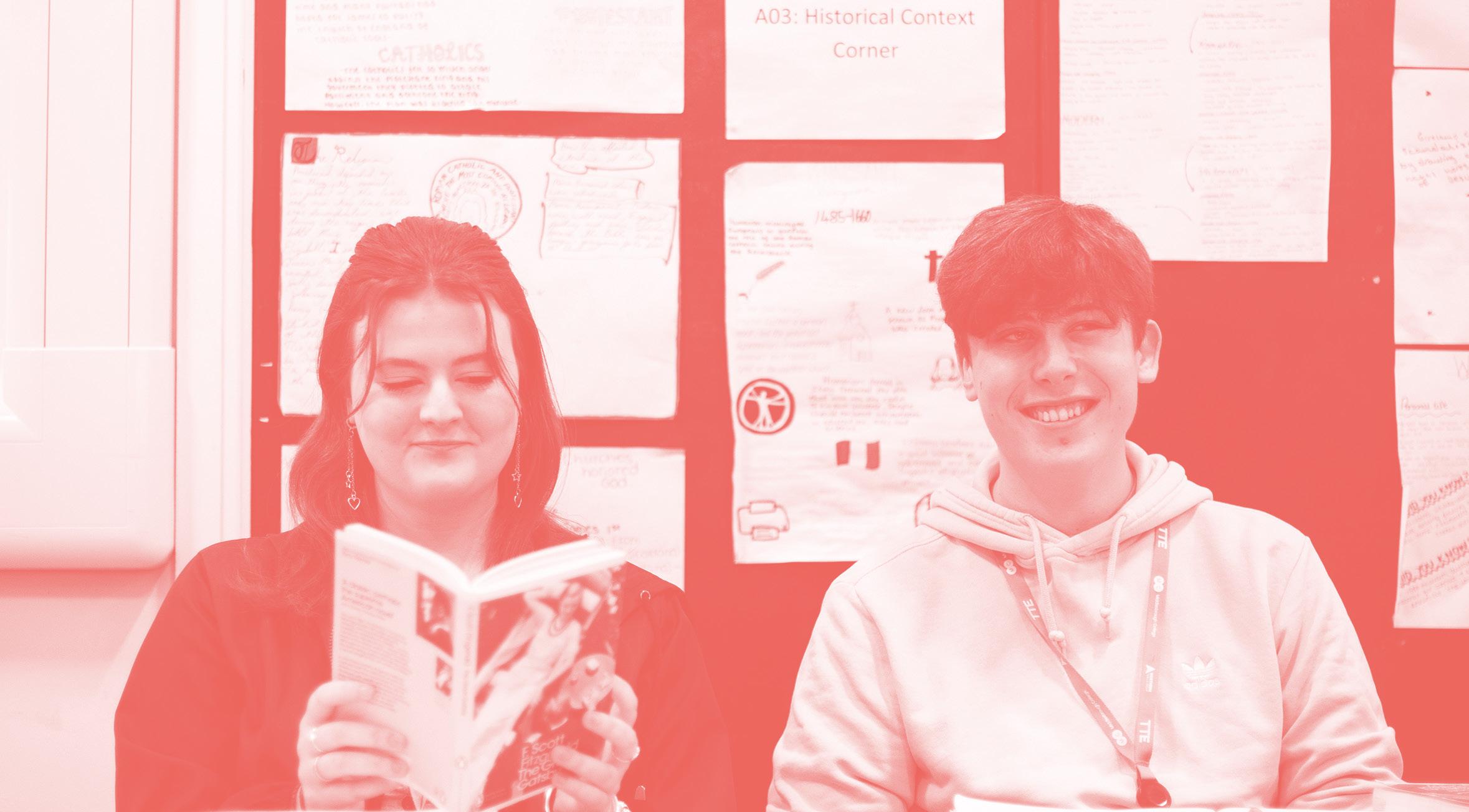
18
2
– AQA
years
Joe
Previous school: Manor Community Academy
A Level - Law, History, BTEC Criminology (A*A*A*)
Joe is progressing to study a Law degree at Durham University.
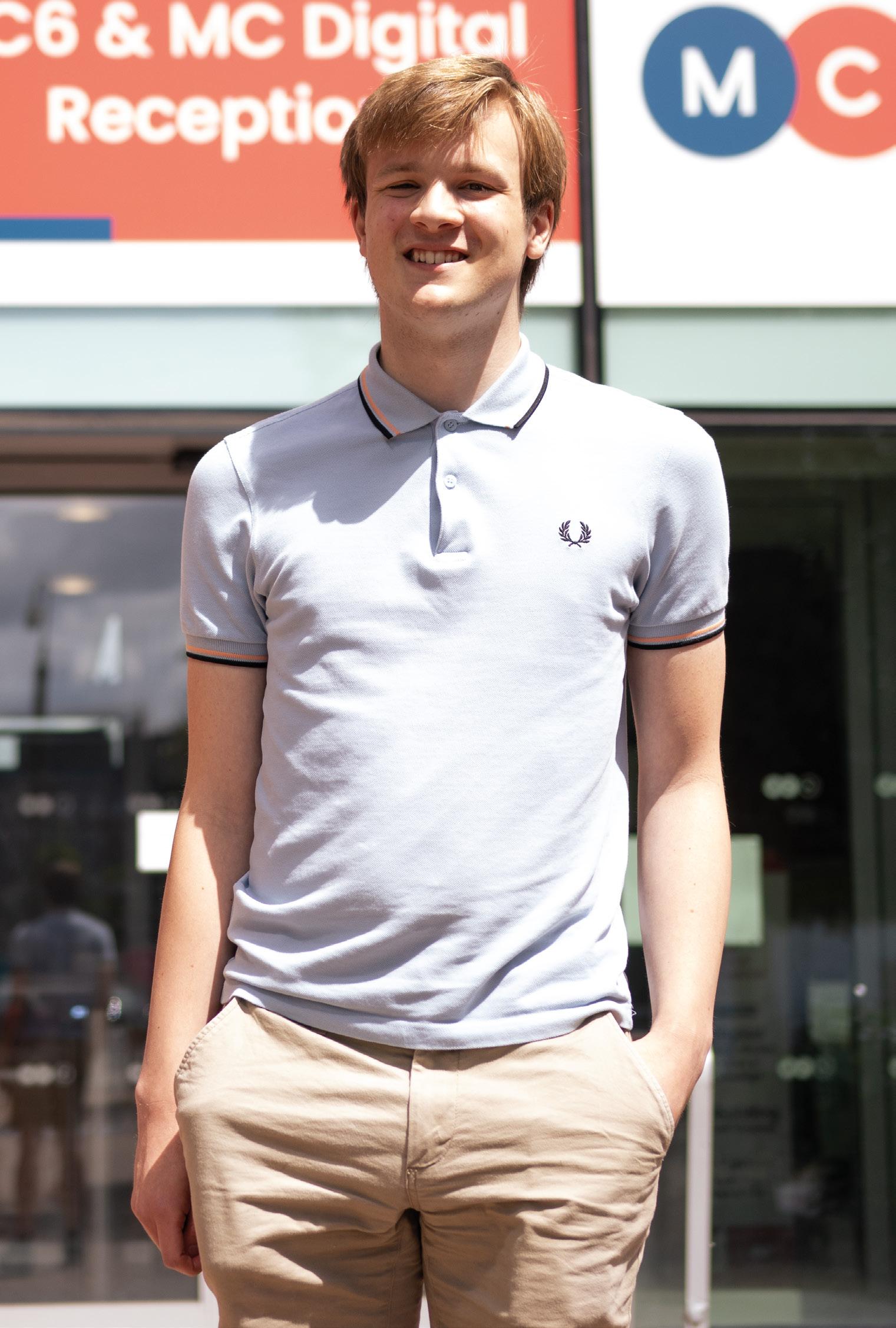
“I decided to come to Middlesbrough College Sixth Form because I wanted to experience a different environment, and coming to study here has allowed me to branch out. The teachers are very approachable and friendly. The support available here is also great, you know that help is always there when you need it.
 Joe Morley
Joe Morley
” 19
Gaelle
Gaelle Baucherel – A Levels Previous school: Northfield School
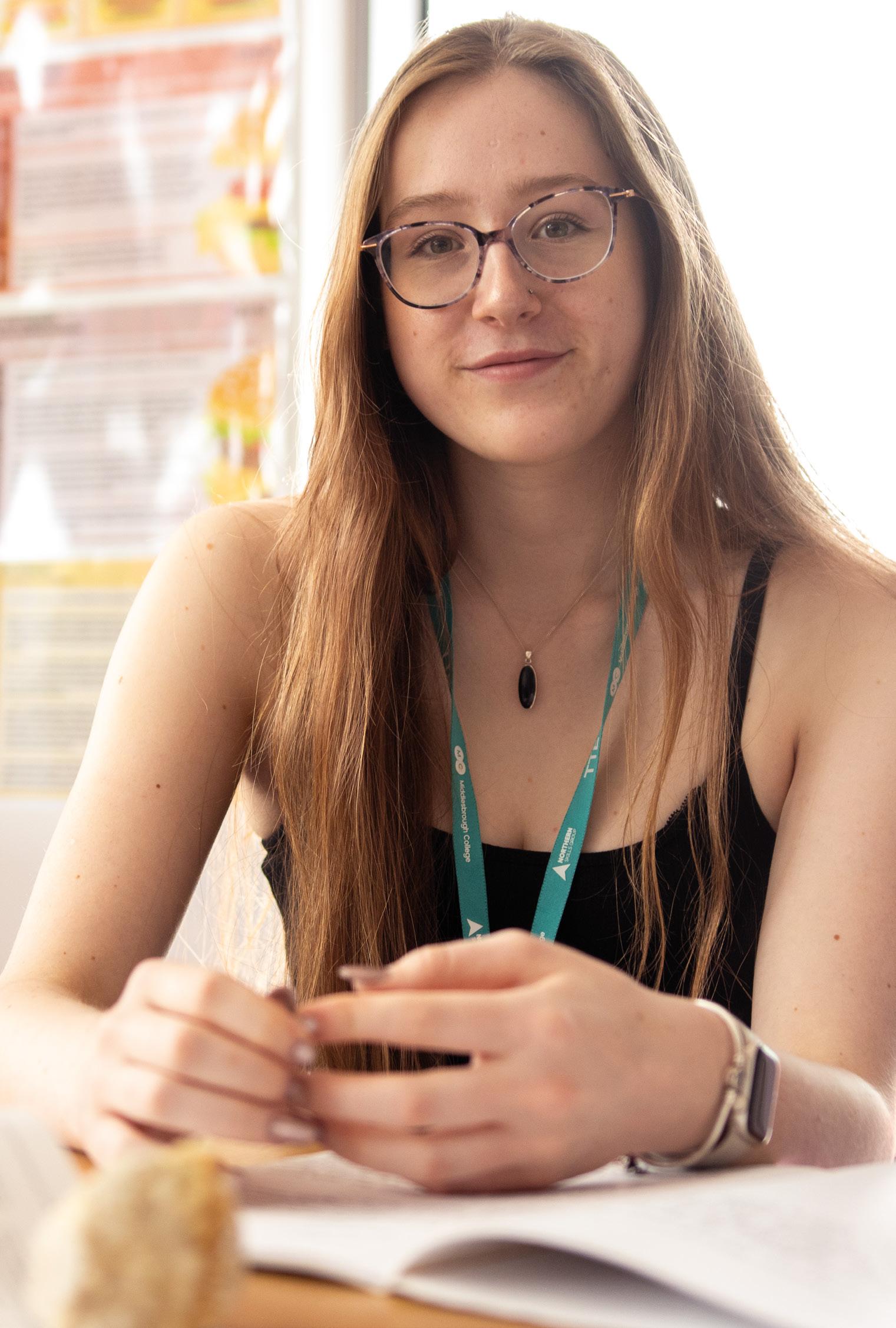
“When I came to the open day at MC6, I had no idea that the environmental science A Level was an option for me to take. I didn’t know any other College that offered the course locally, and after seeing what the subject involved, I knew straight away that MC6 was where I wanted to go.”

20
Environmental Science
This course will allow you to develop your knowledge and understanding of our planet. Using a multi-disciplinary approach, we will consider the interactions between the living environment, the physical environment and human activity. We will explore many environmental issues such as melting ice sheets, coral reef decline, wildlife trade and conservation, and how to use new technologies to manage these problems.
What can I do next?
Career opportunities:
These include fields such as agriculture, animal management, engineering, environmental law, environmental planning, forestry, fishery management, pollution control, sustainable architecture, water management and wildlife conservation.
Entry requirements:
Five GCSEs at grade 5 or above, including GCSE English language and mathematics.
Grade 5 in science (combined trilogy / biology).
University opportunities:
Past students have progressed to study degrees in ecology, environmental science, geography, geology, horticulture, marine biology, microbiology, natural sciences, oceanography and zoology.


21
AQA
2 years –
Film Studies
This course will introduce you to a wide variety of films from various countries and eras. You will learn the language of film and develop the ability to identify how a film communicates and interpret the messages created. You will explore how stories are told, how characters are created and question why films from different countries and eras present these stories and characters. To further your understanding of film language, you will create your own film ideas, scripts, storyboards and film making.
What can I do next?
Career opportunities:
These include media production, journalism, screen writing, graphic design, marketing, photography and teaching.
Entry requirements: Five GCSEs at grade 5 or above, including GCSE English language and mathematics.
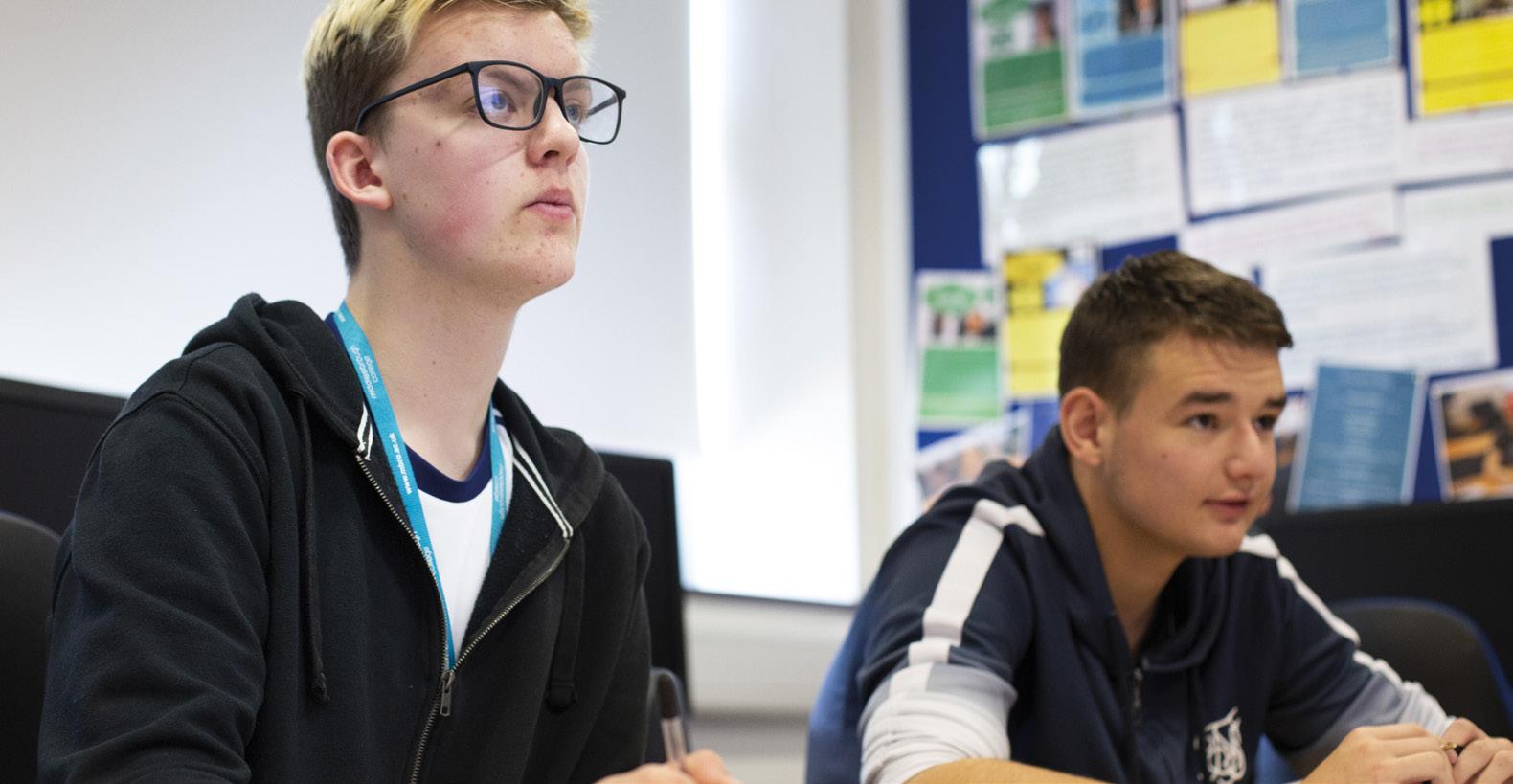
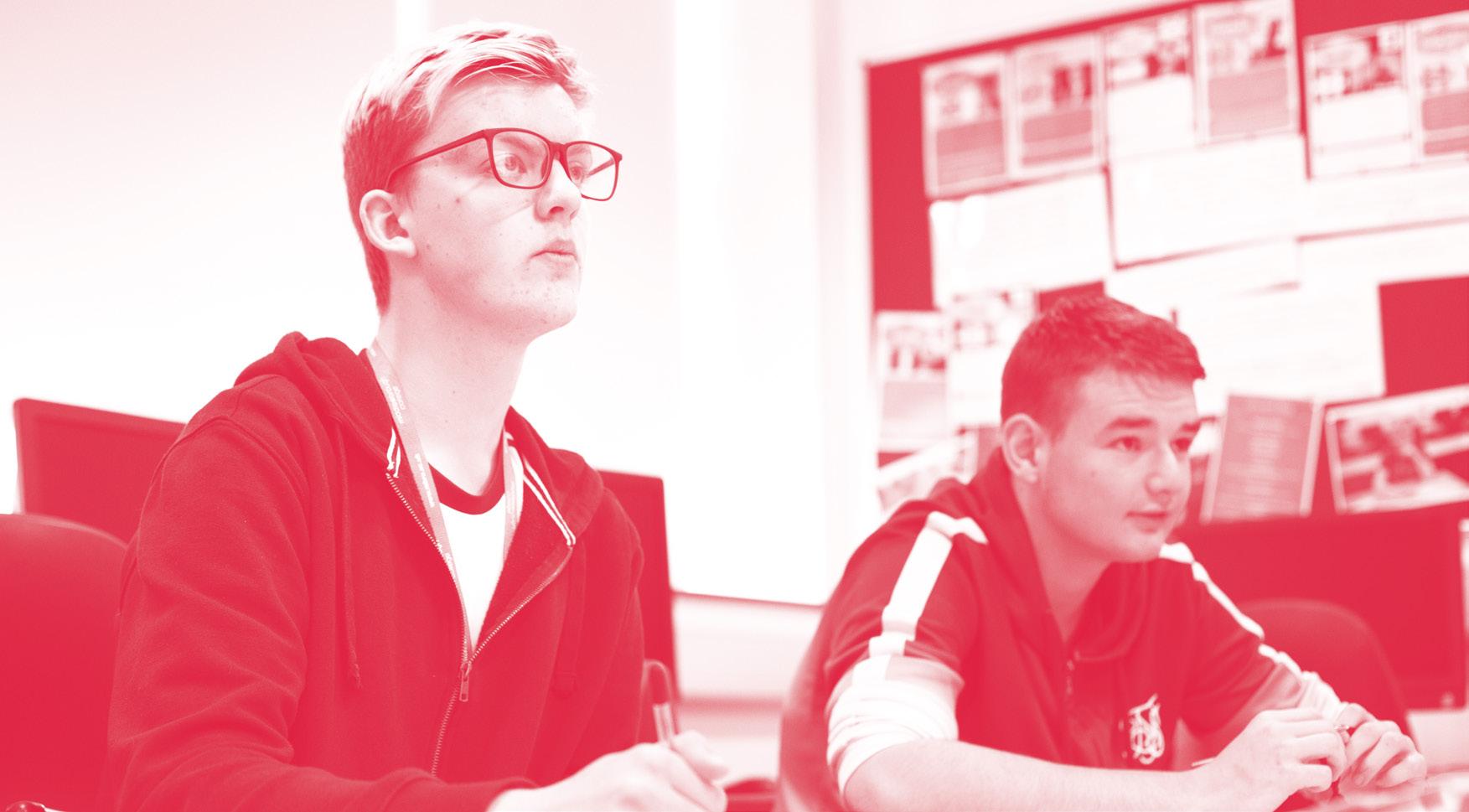
University opportunities:
Past students have progressed to study degrees in media, English, sociology, psychology, creative writing, marketing, journalism and education.
22
Eduqas
2 years –
Fine Art
This course will give you the skills and knowledge to create personal and imaginative work. You will explore a range of two-dimensional and/or three-dimensional media, processes and techniques and explore the use of drawing for different purposes, using a variety of methods and media on a variety of scales. This will involve using sketchbooks/workbooks/journals to underpin work. You will combine skills from a range of art disciplines such as photography, graphics and fine art within this course.
What can I do next?
Career opportunities:
These include artist, graphic design, product design, fashion design, photography, education, art therapy, curation, illustration, architecture and housing design.
Entry requirements:
Five 9-5 grades at GCSE (not equivalents), including English language and maths. A good grade in art GCSE or suitable evidence of artistic talent (e.g. sketchbook).
University opportunities:
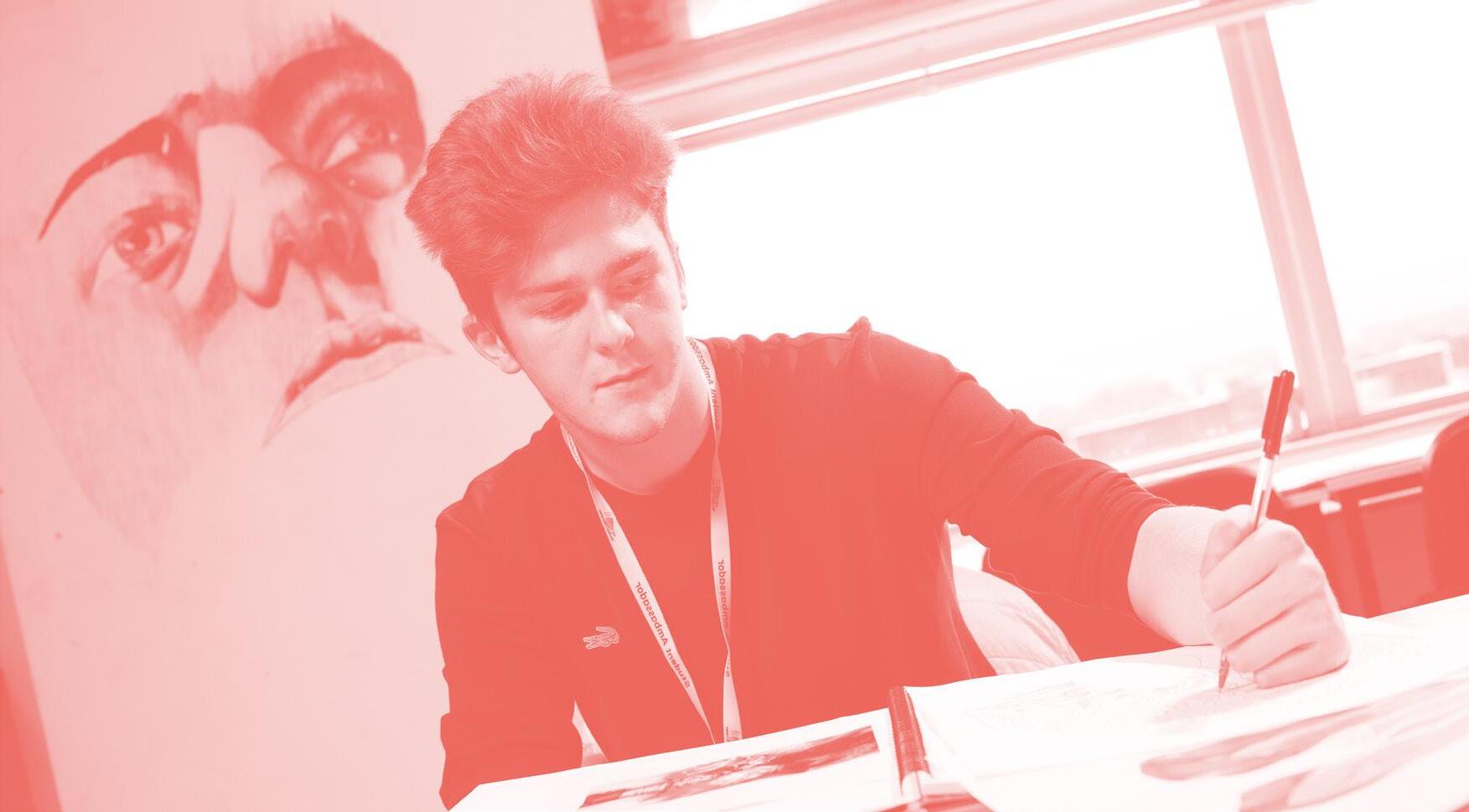
Past students have progressed to study degrees in 2D & 3D animation, 3D design, applied arts, architecture, ceramics, digital media, fine art, games design, illustration, industrial design, estate design, development and management, games design, art history and art therapy.

23
2 years – Eduqas
Further Mathematics
This stimulating and challenging course is highly regarded by employers and Universities and is studied as an additional subject to A Level mathematics. You will gain knowledge of a wide variety of mathematical techniques and develop skills in problem solving and analytical thinking. The course builds upon all GCSE work, especially algebra. The course can be taken as a 1 year AS Level or a 2 year A Level.
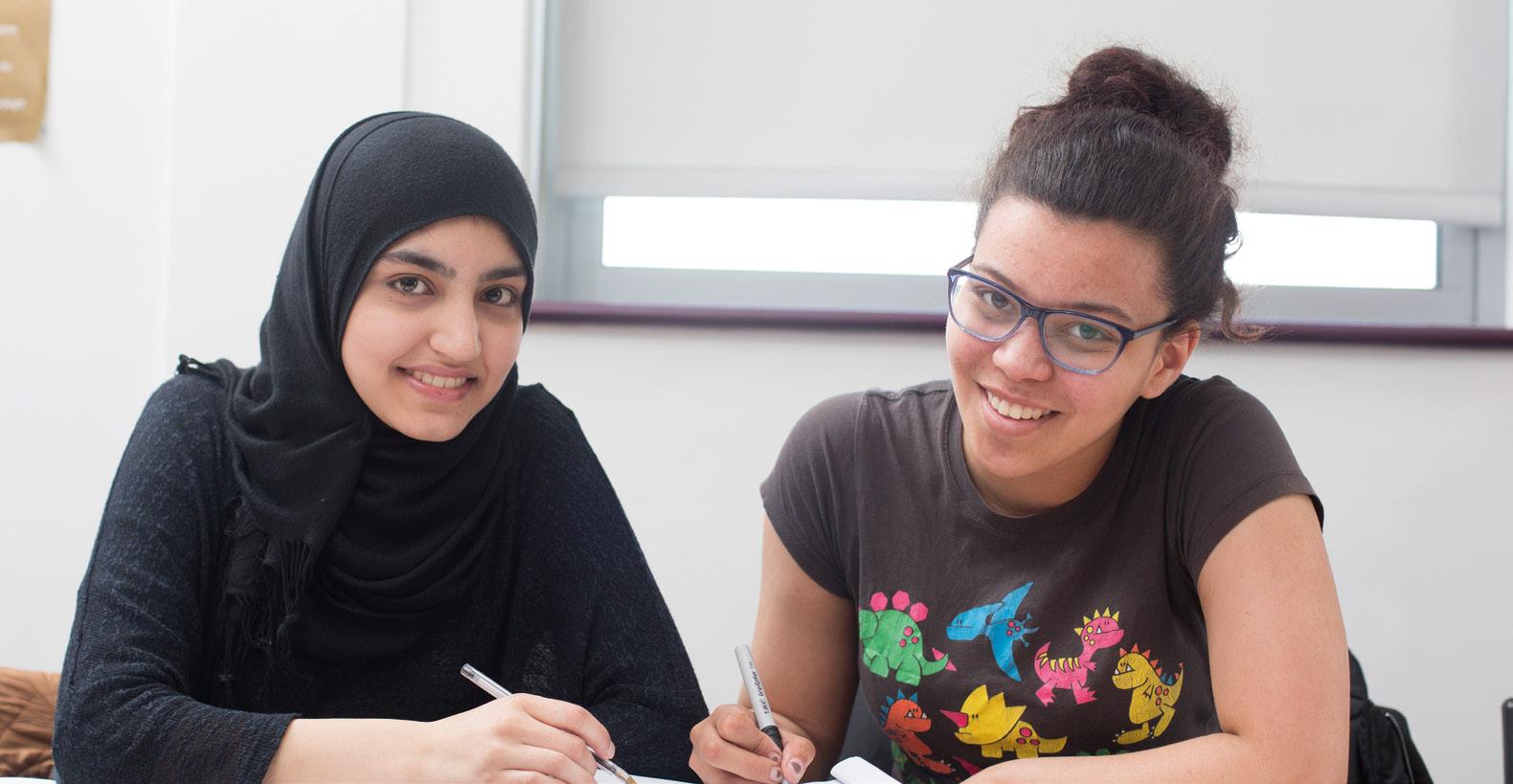

What can I do next?
Career opportunities:
These include engineering, accountancy, IT business analysis, computing, banking, surveying, retail management, air traffic control, architecture, cartography, and teaching.
Entry requirements:
Five GCSEs at grade 5 or above, including GCSE English language. At least a grade 8 in GCSE maths and subject to an initial assessment. You will need to be studying A Level maths alongside this course.
University opportunities:
Past students have progressed to study degrees in engineering, computing, accountancy, economics, business, quantity surveying, psychology, architecture, education, mathematics and physics.
24
2 years – Pearson Edexcel
Geography
This course offers you the opportunity to tackle some of the issues facing modern society, from climate change and human rights to superpower trading and urban expansion. You will develop core geographic skills, including field work, experiencing both virtual and real outdoor places. You will develop the use of specialist equipment, preparing maps and diagrams and using social survey and interpretative methods, e.g. using ArcGIS computer cartography with data collected from trips or published sources.
What can I do next?
Career opportunities:
Among many, these include: working for development and the business world to the built environment and geographical information systems.
2 years –
Entry requirements: Five GCSEs at grade 5 or above, including GCSE English language and mathematics.
University opportunities:
Students can go on to study earth sciences such as geology, geography, oceanography, environmental science or a related subject such as architecture, finance, economics or marketing.
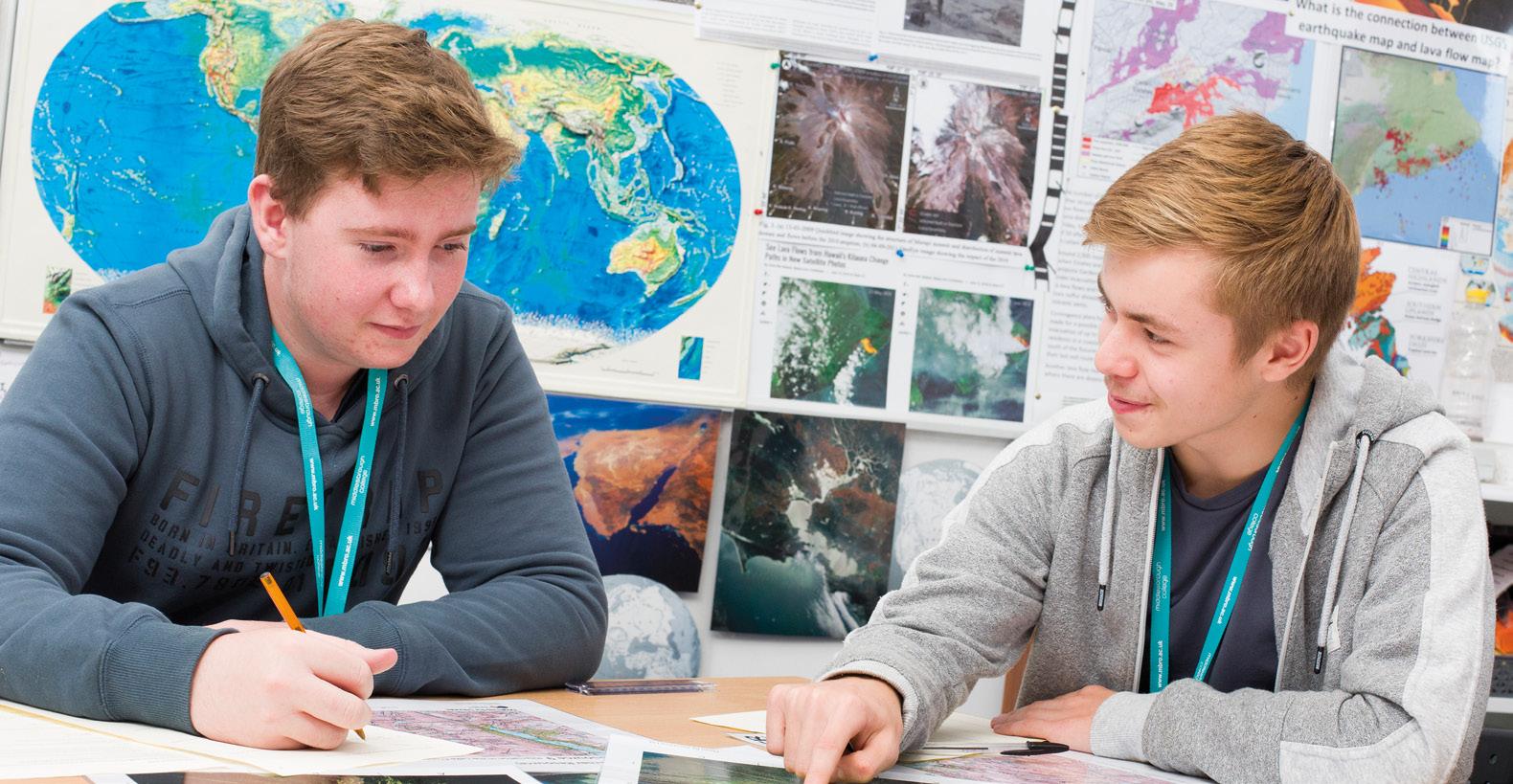
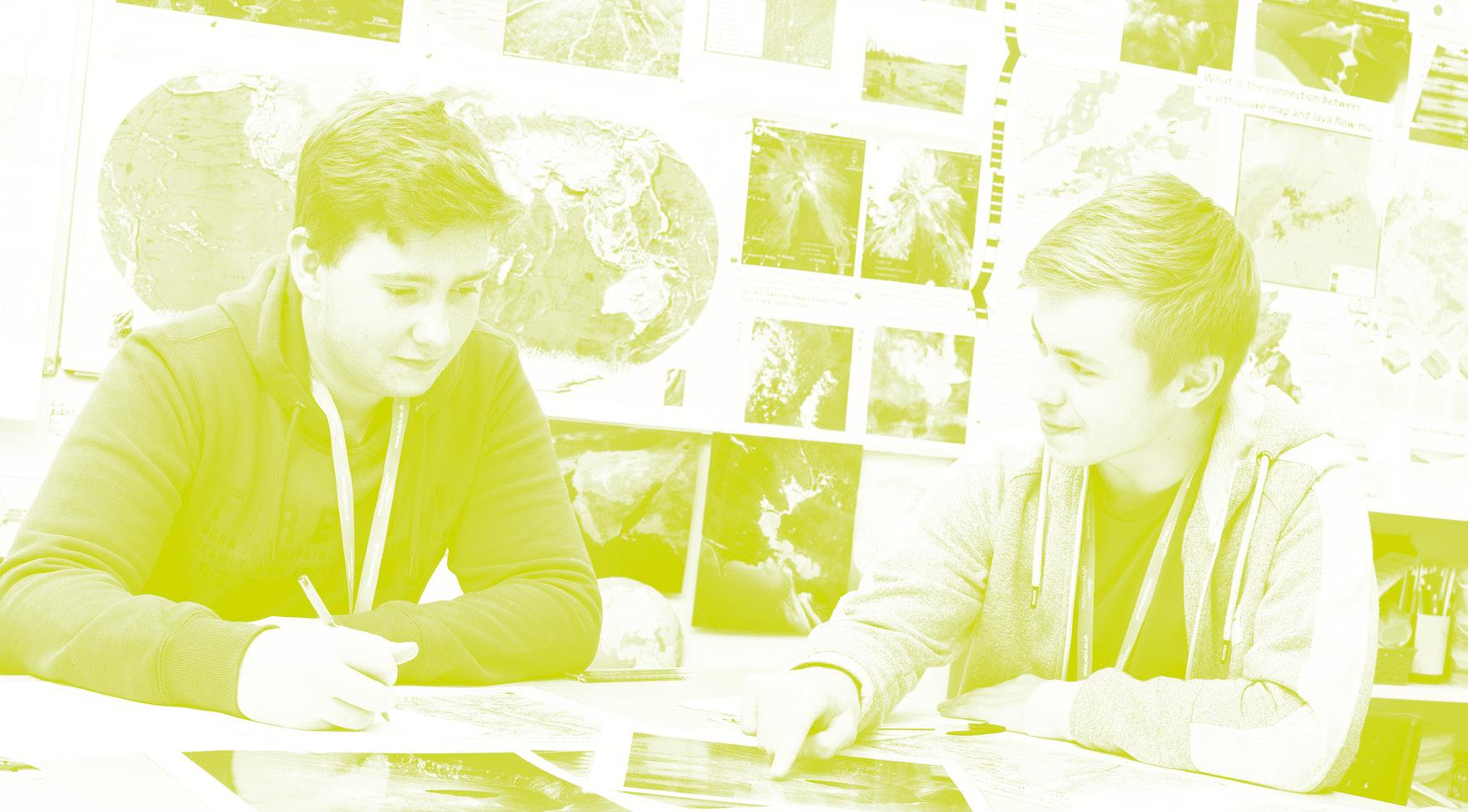
25
OCR
Geology
This course will provide you with the skills for many vocations, not just geological, which require initiative in thought and problem solving. Geology literally means the study of the earth and if that’s not important what is? Fieldwork is fundamental to studying geology. There is a residential trip in Y12 to Blencathra, and an international trip in Y13, for example to Sicily or Iceland. Both trips develop your skills as an investigative geologist.
What can I do next?
Career opportunities:
This course provides a good basis for many vocations, requiring initiative in thought and problem solving, for example in engineering, geochemistry, environmental geology, waste management and education.
Entry requirements: Five GCSEs at grade 5 or above, including GCSE English language and mathematics.
University opportunities:
Past students have progressed to degrees in petroleum geology, environmental science, engineering geology, surveying, hydrogeology, earth sciences, anthropology, geology and geography.
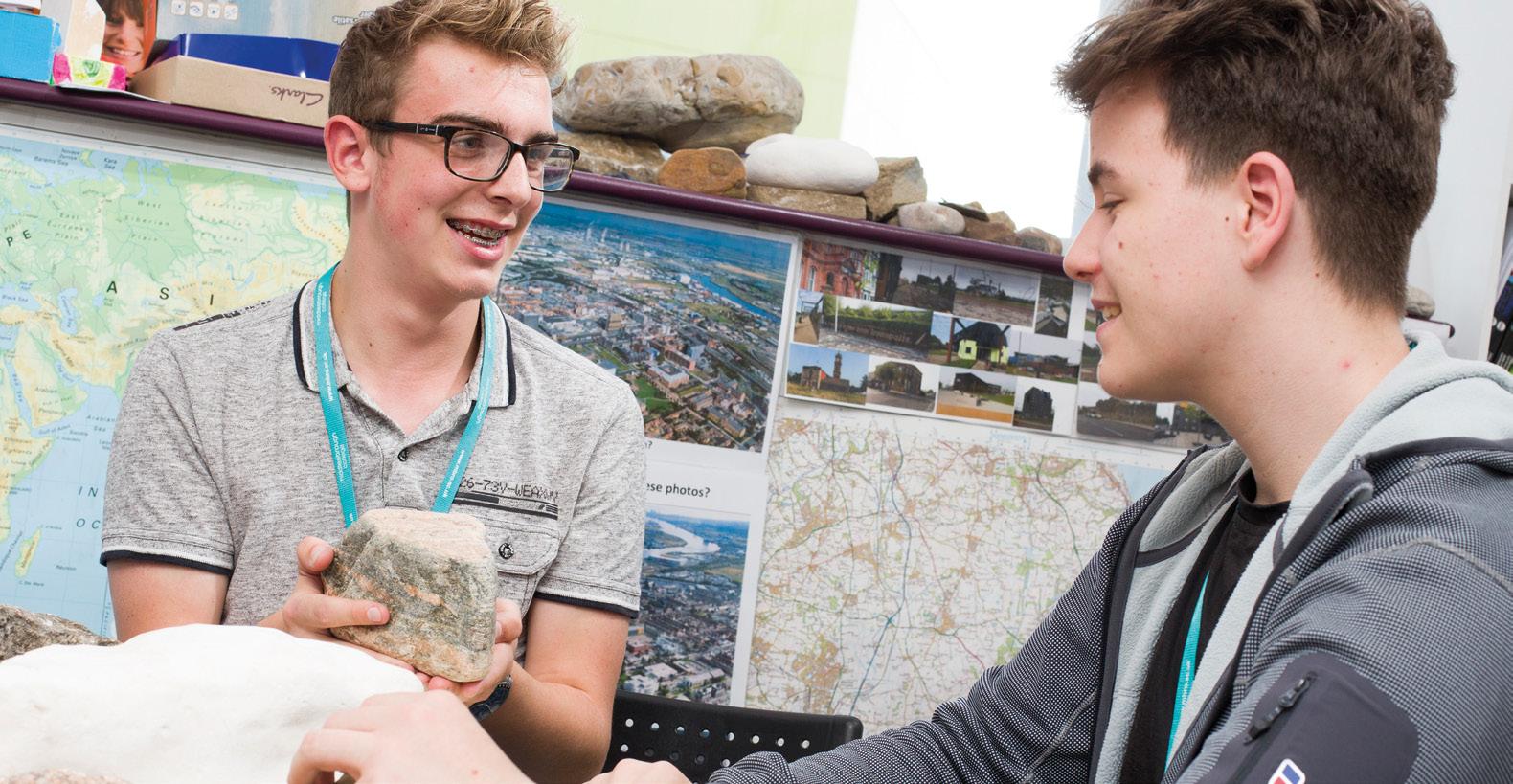
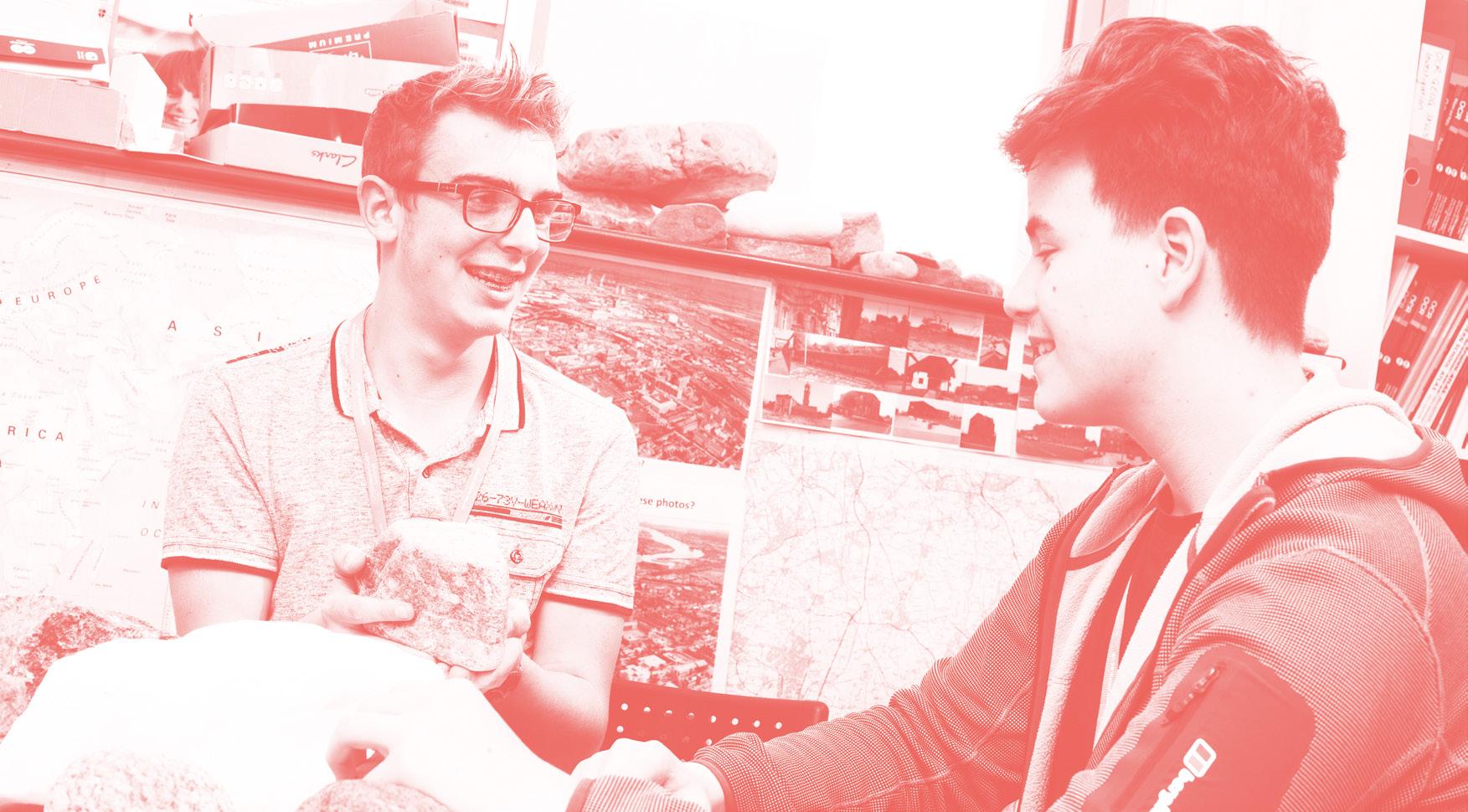
26
2
Eduqas
years –
History
History will help students to gain a deeper understanding of the past through political, social, economic and cultural perspectives. The engaging topics will provide students with the knowledge and skills required to succeed as A Level historians. Topics include politics, society, and economy and foreign affairs, to put together a picture of change over time. Students will also investigate the value of sources and how convincing we find the arguments made by historians.
What can I do next?
Career opportunities:
These include teaching, political work, museum work, research, journalism and archaeology.


years
Entry requirements: Five GCSEs at grade 5 or above, including GCSE English language and mathematics.
University opportunities:
Past students have progressed to study degrees in history, law, English, politics, journalism, art history, social and public sector development and education.
27
2
– AQA
Law
Virtually every aspect of human life is governed by rules, they tell us what we can and can’t do, what is and is not acceptable conduct in society. Law is the study of these rules, how they are made and enforced and the way that they affect us. Studying A Level law will give you a knowledge and understanding of the law that will be useful whatever you do in the future. It will also develop strong analytical, communication and problem-solving skills.
What can I do next?
Career opportunities:
These include the legal profession and other work in the legal sector, the police force, business, journalism, the civil service and the public sector, the probation service and youth work.
Entry requirements:
Five GCSEs at grade 5 or above, including GCSE English language and mathematics.

University opportunities:
Past students have progressed to study for degrees in law, history, English, business and a wide range of other subjects.

28
2 years – AQA
A Level mathematics is an interesting and challenging course which extends the methods you learned at GCSE and includes optional applications of mathematics, such as statistics and mechanics. Students will learn about modelling and analysing the physical world around us, including forces and motion, and collecting and analysing data to use to make predictions about future events.
Entry requirements: Five GCSEs at grade 5 or above, including GCSE English language. At least a 7 in GCSE maths.
What can I do next?
Career opportunities:
There are opportunities in science, engineering and manufacturing sectors. Employers highly value mathematics qualifications because mathematics students become better at thinking logically and analytically.
University opportunities:
Past students have progressed to study degrees in mathematics, physics, engineering, economics, statistics, accountancy, chemistry, computer science, management studies, architecture, medicine, teaching and many more.


29
2 years – Pearson Edexcel
Mathematics
2 years – OCR
Media Studies
This course enhances your analytical and creative skills, helping you understand the media industry, its products, and their messages. You’ll learn media language tools to interpret messages in various media forms like advertising, music video, news, and television drama. Through this, you’ll create your own production work, developing visualization, design, and editing skills using industry-standard software and equipment.


What can I do next?
Career opportunities:
These include media production, film production, journalism, screen writing, graphic design, marketing, photography and teaching.
Entry requirements: Five GCSEs at grade 5 or above, including GCSE English language and mathematics.
University opportunities:
Past students have progressed to degrees in media, English, psychology, journalism, film production, business management, politics and history.
30
Physicists explore the fundamental nature of almost everything we know of. They probe the furthest reaches of the earth to study the smallest pieces of matter. Modules may include measurements and their errors, particles and radiation, nuclear physics, and mechanics and energy. Throughout the course students will carry out practical activities including investigating interference and diffraction of laser light, measuring acceleration due to gravity, and investigating magnetic fields.
What can I do next?
Career opportunities:
These include radiation protection practitioner, research scientist, acoustic engineer, systems developer, geophysicist, medical physics and meteorologist.
Entry requirements:
Five GCSEs at grade 5 or above, including GCSE English language and mathematics. GCSE Science grade 66 (combined science) or GCSE Physics grade 6 (separate).
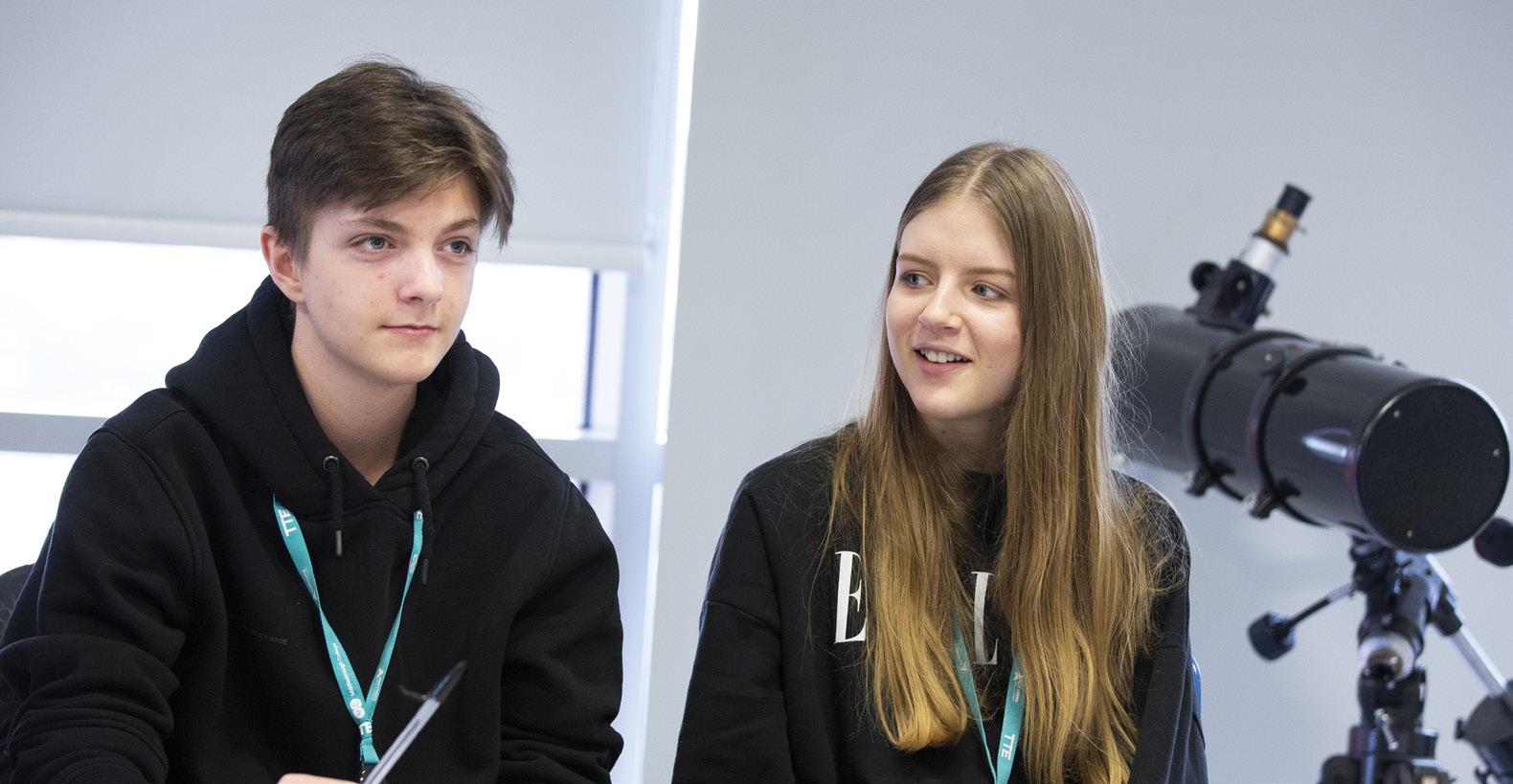
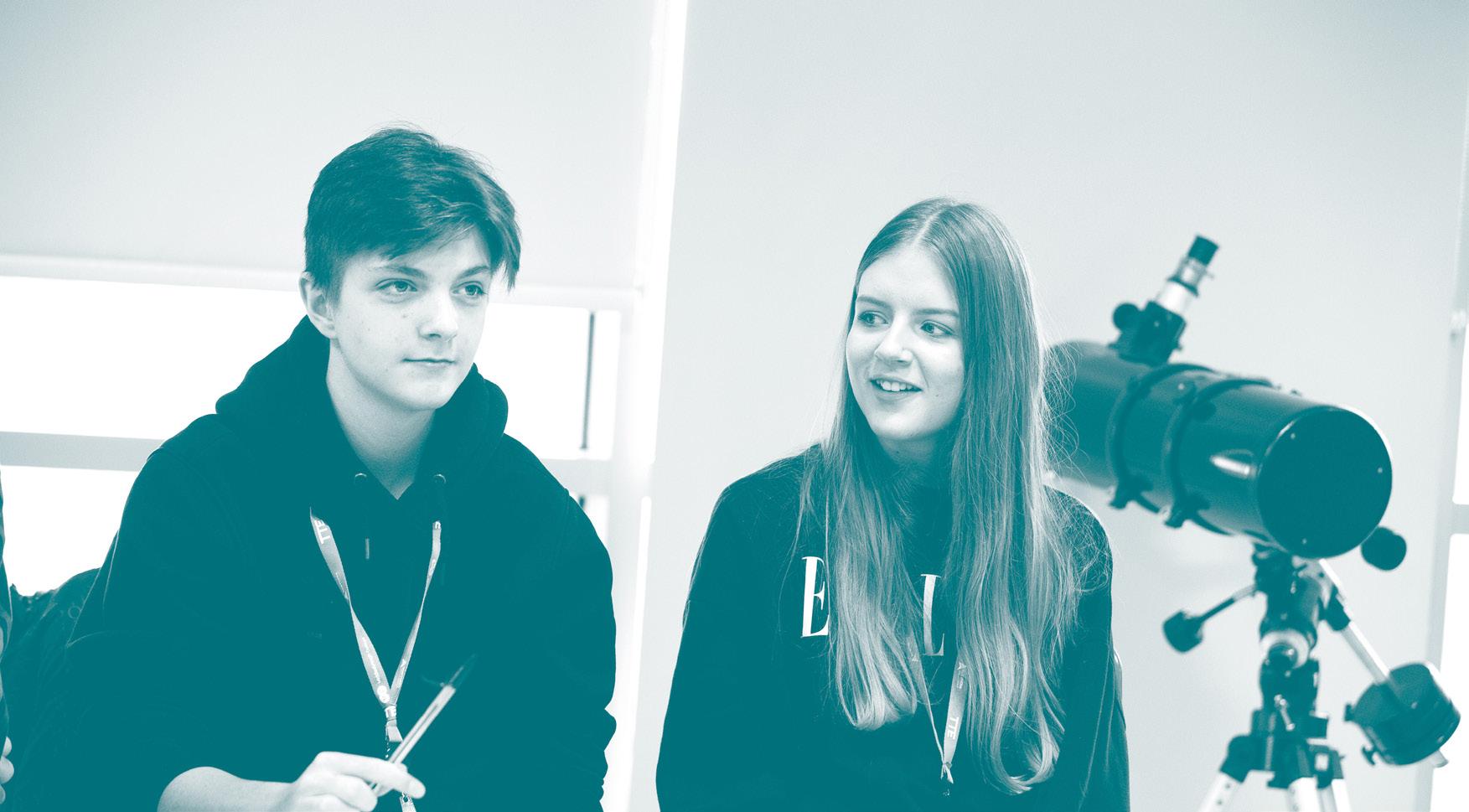
University opportunities:
Past students have progressed to study degrees in mathematics, physics, mechanical engineering, civil engineering, economics or business.
31
Eduqas
Physics 2 years –
Photography
Photography is a practical course that involves creative techniques and processes. In the first year, you’ll work on mini projects using different cameras and studio equipment to explore photography genres. The second year includes a personal investigation and an externally set assignment, allowing you to explore your own ideas creatively and experiment with various techniques, including digital cameras, traditional film, and Adobe Photoshop.
What can I do next?
Career opportunities:
These include fashion photography, commercial photography, fine art photography, photo-journalism, live events and creative photo-illusion.
Entry requirements: Five GCSEs at grade 5 or above, including GCSE English language and mathematics.
University opportunities:
Past students have progressed to study degrees in art & design, marketing and photography.


32
2 years – Eduqas
Politics
This course is for you if you have an interest in contemporary politics, political ideas and the way in which countries are governed. You will study political ideas, the government and politics of the USA and UK and comparative politics.


Entry requirements:
Five GCSEs at grade 5 or above, including GCSE English language and mathematics.
What can I do next?
Career opportunities:
These include the civil service, police force, public service, housing advice, management, community worker, probation officer and youth work.
University opportunities:
Past students have progressed to study degrees in politics, international relations, history, social and public sector studies, education and English.
33
Edexcel
2 years – Pearson
Psychology
Ever wondered if prison really does change criminal behaviour? Or why some people conform? Or perhaps if the experiences you had before the age of five really do shape the person you are today? A Level psychology will give you an understanding of the way people think and why people behave in specific ways. Students will study a range of topics including social influences, psychopathology, research methods and attachment.
What can I do next?
Career opportunities:
These include teaching, sport psychology, neurology, social work, marketing and advertising, counselling, police force, human resources, nursing and clinical psychology.
Entry requirements: Five GCSEs at grade 5 or above, including GCSE English language and mathematics.
University opportunities:
Past students have progressed to study degrees in psychology, sociology, criminology, law, marketing, business, education early childhood professional studies, health, wellbeing and social care and social work.


34
2 years – AQA
Sociology
What is sociology? It focuses primarily on the influence of social relationships upon people’s attitudes and behaviour and on how societies are established and change. You will study a variety of modules including culture and identity, education, religion, crime and evidence, and theory and research methods.
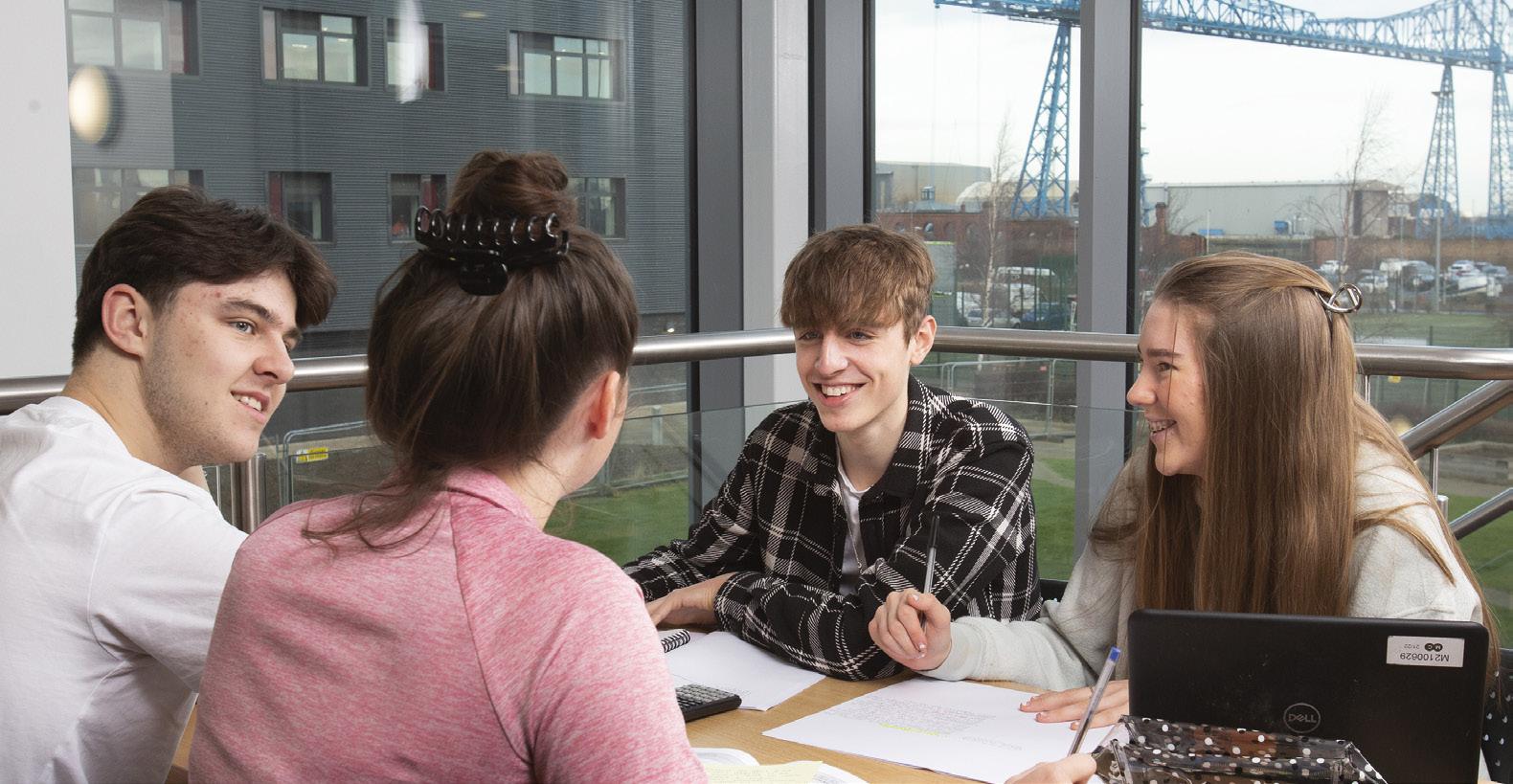
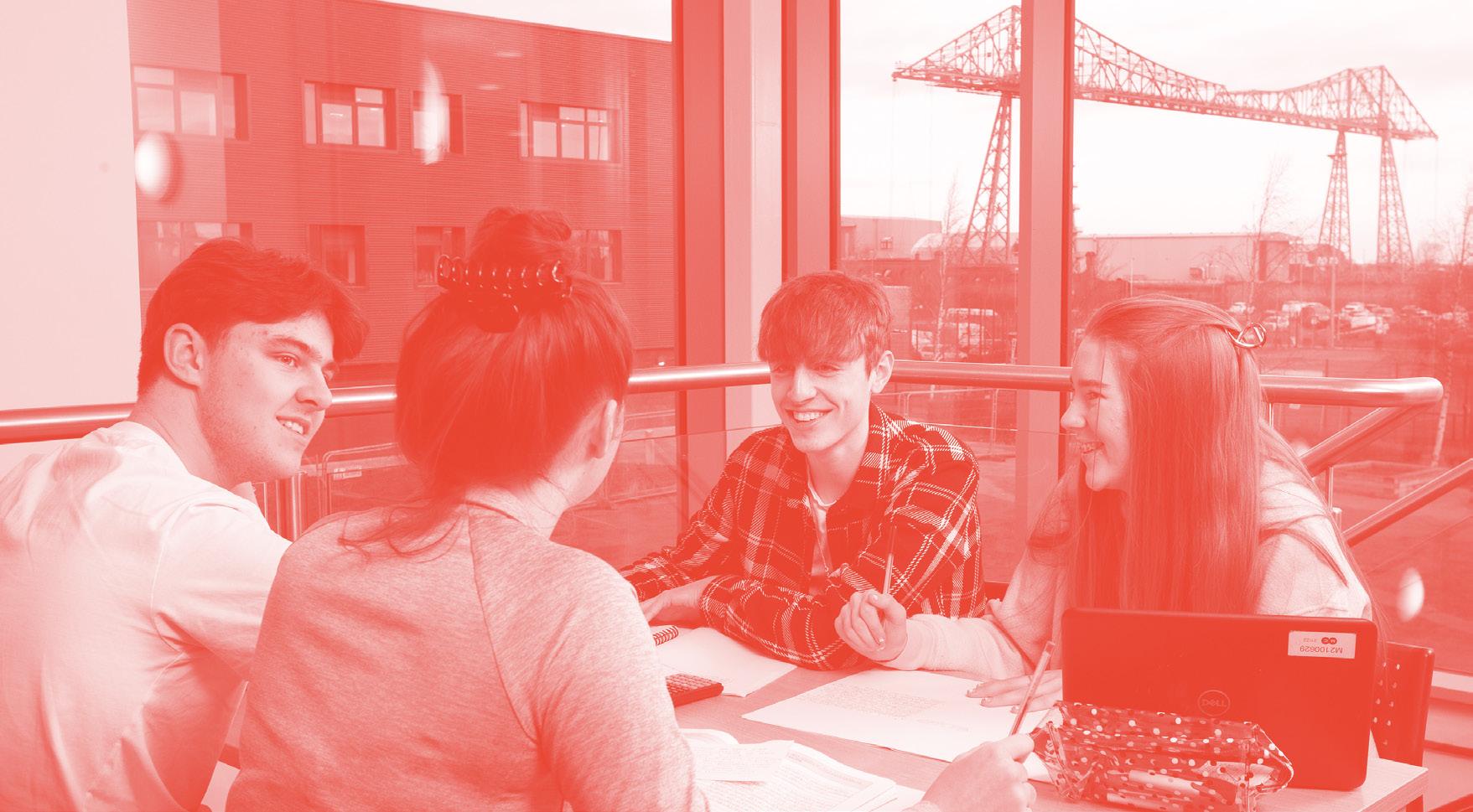
Entry requirements: Five GCSEs at grade 5 or above, including GCSE English language and mathematics.
What can I do next?
Career opportunities:
These include community development worker, a further education teacher, international aid and development worker, policy officer, social researcher, youth worker, social worker and housing manager.
University opportunities:
Past students have progressed to study degrees in sociology, law, psychology, journalism, teaching, marketing and much more.
2 years – AQA
35
Applied Science & Forensic and Criminal Investigations
What will I study?
On an Applied Science course at Middlesbrough College, you’ll study a variety of modules. Modules on courses will vary so please look at our course information on our website for course specific content.
Modules may include:
• Laboratory techniques
• Diseases and infections
• Physiology of human body systems
Future careers
• Biomedical science
• Forensic evidence, collection and analysis
Biomedical Scientist/Biochemist
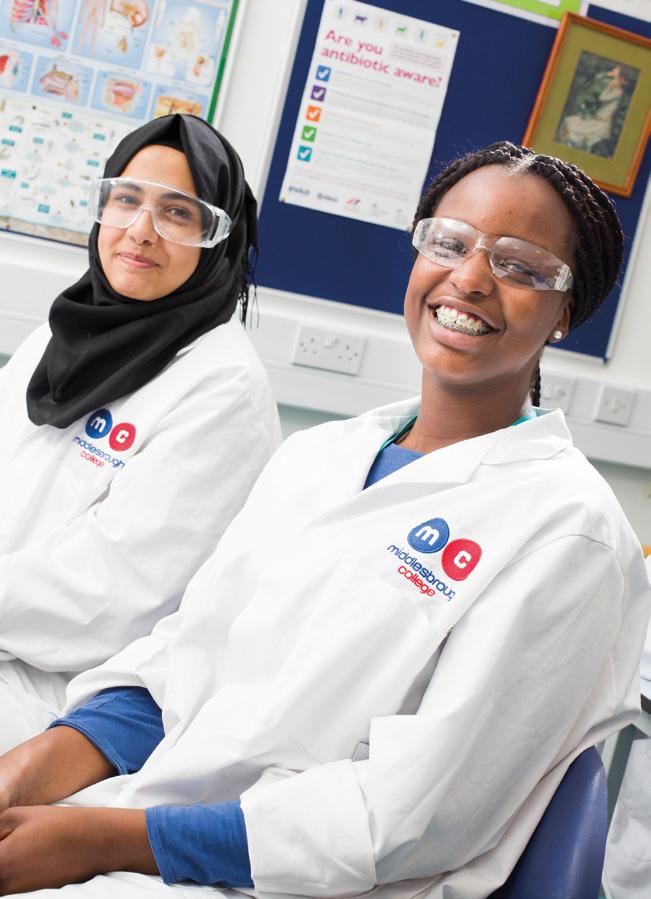
Average salary - £37,600
Senior Forensic Scientist
Average salary - £45,000
Forensic Psychologist
Average salary - £40,057
Pharmacist
Average salary - £41,100
36
Amelia Dixon - Applied Science
Previous school: Outwood Academy Bydales
Amelia is now a Graduate Animal Nutritionist at Thompsons of York.
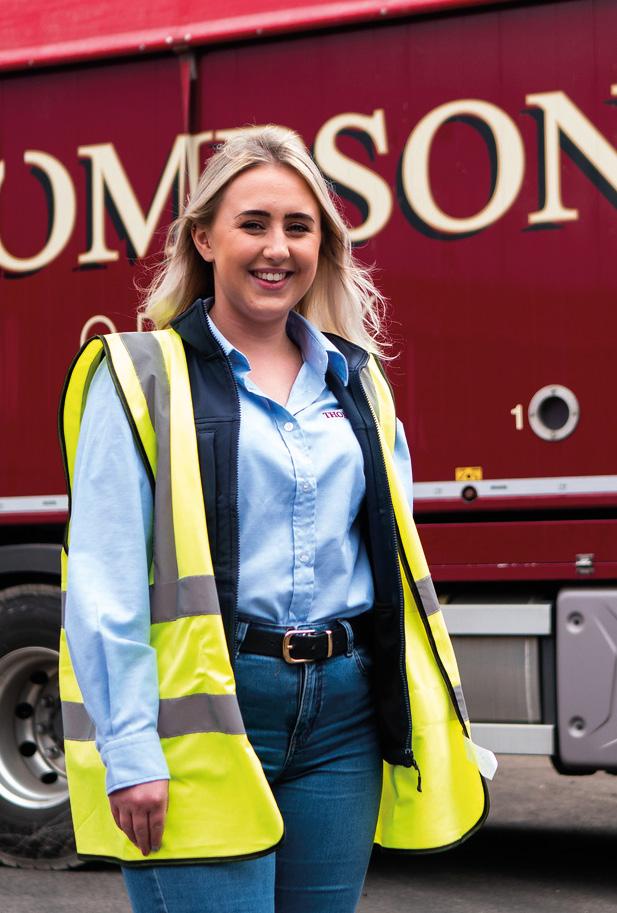

“
I thoroughly enjoyed my course at Middlesbrough College, it was challenging yet exciting. The teaching was great, and the support I received was fantastic.”
37
Amelia
Level 3 | 2 years Pearson Edexcel
Applied Science
There are approximately 5.8 million people employed in applied science occupations in the UK. This equates to approximately 20% of the workforce. The applied science sector is diverse and wide-ranging, including biomedical, forensic, physical and chemical sciences.
Entry requirements: Five GCSEs at grade 5 or above, including GCSE English language and mathematics, plus grade 5 in science (combined trilogy/biology).
What can I do next?
Career opportunities:
These include chemical science, laboratory technician, research or development, management, environmental professions, and conservation.
University opportunities:
Past students have progressed to study degrees in biology, chemistry, physics, crime scene science, dietetics, radiography, paramedic sciences and forensic science. Some students progress on to apprenticeships or working in the science industry.

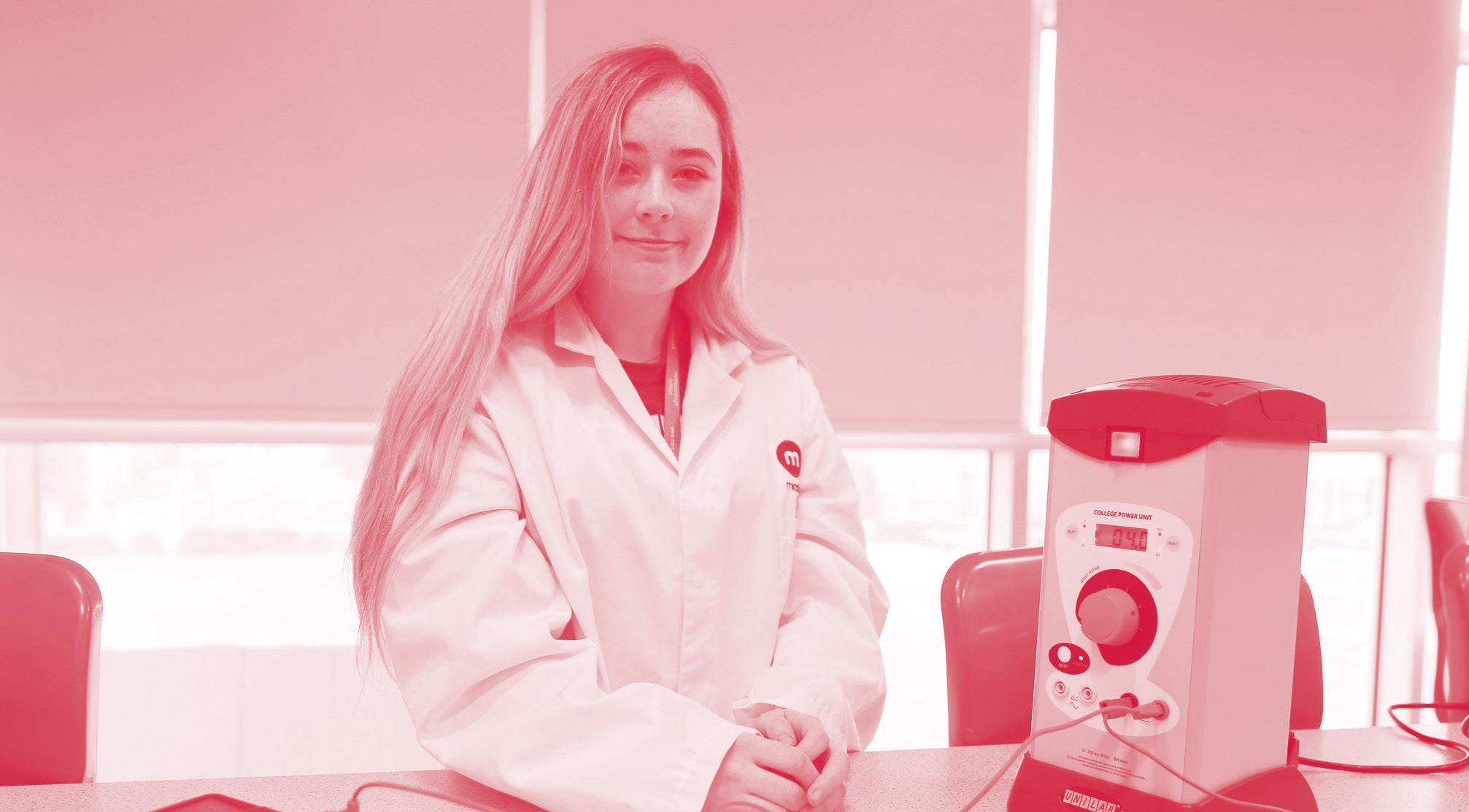
38
Level 3 | 2 years
Nd Forensic and Criminal Investigations
This course explores the different roles and responsibilities in forensic science whether this is a forensic scientist working in a laboratory, a CSI responsible for evidence collection or looking at the process of going from crime scene to courtroom. The course is a mixture of exams, assignments, and practical work.


Entry requirements:
Five GCSEs at grade 5 or above, including GCSE English language, mathematics and science.
What can I do next?
Career opportunities:
There is a wide range of occupations for graduate entry including forensic laboratories, the police force, and the probation service.
University opportunities:
Past students have progressed to study a range of degree courses such as forensic science, criminology, psychology and crime scene science.
39
Pearson
Edexcel
T Levels





















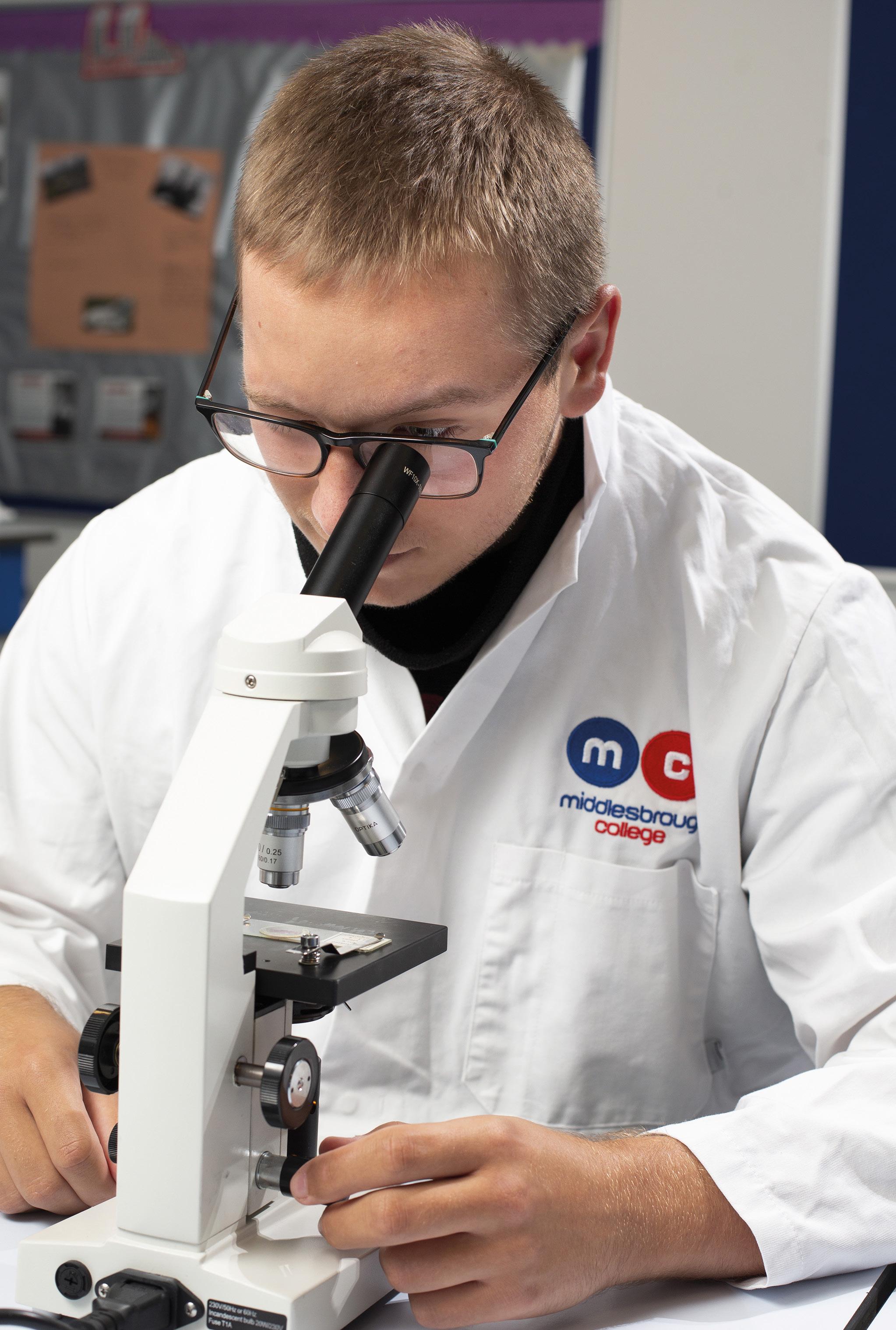

40
What are T Levels?
T Levels are a new qualification that are equivalent to 3 A Levels. The course will provide you with a 45-day work placement, giving you a taste of a real working environment and an understanding of industry.
Who can study a T Level?
T Levels can be studied by anyone aged 16-18 and students up to age 24 who have an Education, Health and Care Plan.
Find out more on our website: mbro.ac.uk/ t-levels
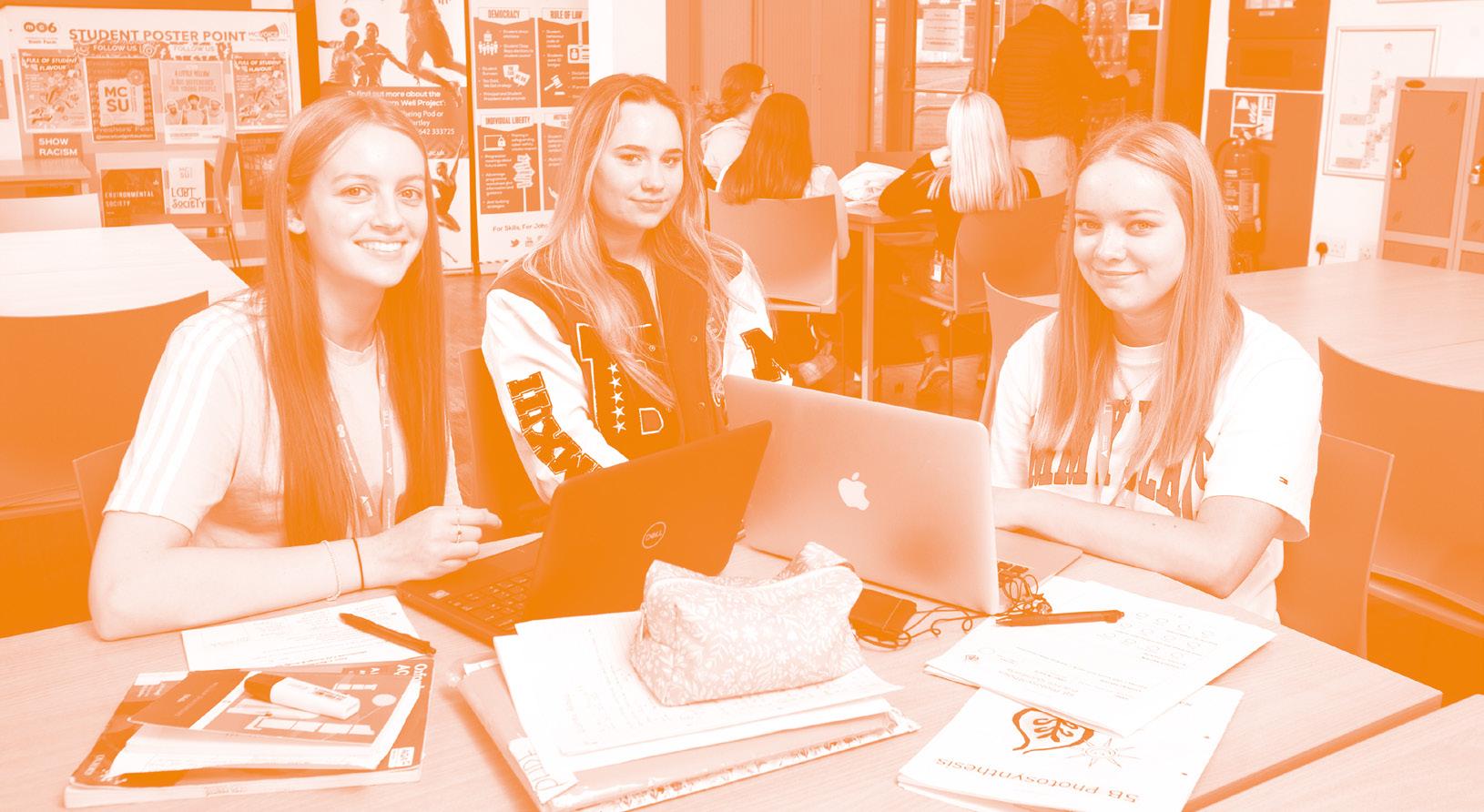
How can T Levels help me prepare for my career?
T Levels will help you put what you are learning in the classroom at College into practice in a real working environment. You’ll work both in a team and independently, building skills that will get you ready for industry.
Our courses have been developed in collaboration with employers and businesses so that they meet the needs of industry and prepare you for work. T Levels will provide you with the skills, knowledge and experience you need to open the door to highly skilled employment, higher level study or an apprenticeship.
41
Laboratory Science
This technical qualification will provide learners with the knowledge, skills and behaviours needed to progress into skilled employment or higher-level technical training or study in the science sector. The core knowledge and core skills will be developed through a practical employer-set project. In addition to this, maths, English and general digital skills will be integrated within the qualification in occupationally relevant contexts.
What can I do next?
Career opportunities:
These include movement onto a degree apprenticeship or into a junior role in a range of science careers, including laboratory scientist, chemical analyst, research and development scientist.


Entry requirements:
You should have achieved grade 5 or above in GCSE English language and maths, and it is desirable to have science GCSE at a grade 6. Plus, a minimum of 3 other GCSEs at grade 5 or above.
University opportunities:
Past students have progressed to study degrees in chemistry, biochemistry, microbiology, biomedical science, biological science.
42
T Level NCFE
2 years –
Legal Studies
On this course students will develop an understanding of a broad range of issues relevant to the legal sector including professionalism and ethics, the fundamentals of law and financial accounting, and an awareness of digital and emerging technology. Students will also develop their research skills and learn more about careers within the legal profession.
Entry requirements: Five GCSEs at grade 5 or above, including GCSE English language and mathematics.
What can I do next?
Career opportunities:
These include employment within a relevant sector of the legal services/professions, further training or into Higher Education.

University opportunities:
Past students have progressed to study for degrees in law, history, English, business and a wide range of other subjects.

43
2 years – T Level Pearson Edexcel
Mix Up It
a little!
Combine A Levels with A Level equivalents!
We can offer you the opportunity to study A Levels alongside A Level equivalent programmes such as applied BTEC vocational qualifications, this combined programme will allow you to keep your options open by gaining additional qualifications and broadening your future career opportunities!
Students can study 2 A Levels and 1 Vocational qualification or 1 A Level and 2 Vocational qualifications. This study programme is equivalent to 3 A Levels or 1 vocational Level 3 study programme.
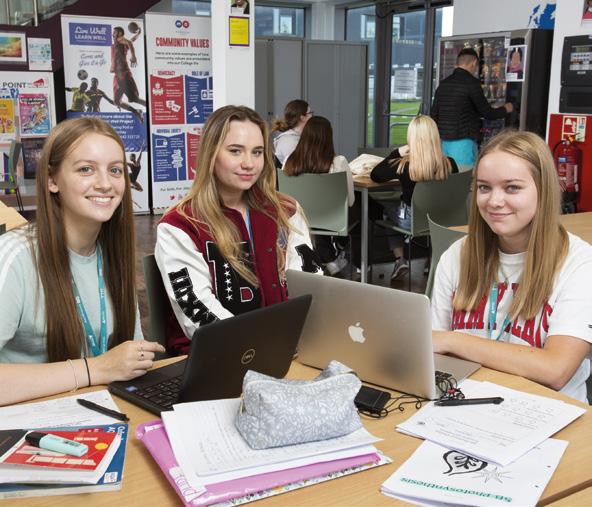
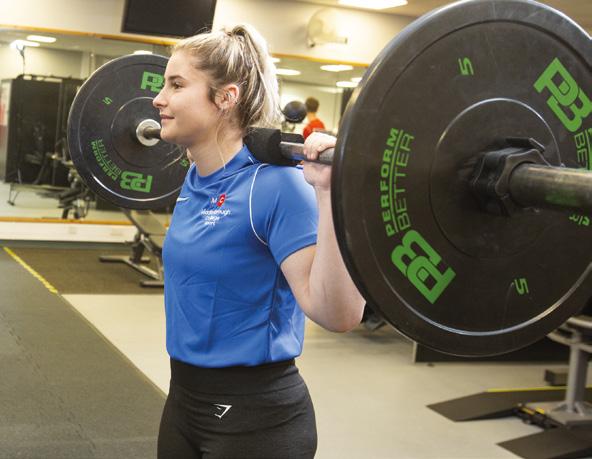
All subjects are taught within Middlesbrough College Sixth Form by our specialist A Level tutors.
A Levels to choose from:
Art, Craft & Design, Biology, Business, Chemistry, Computer Science, English Language, English Literature, Environment Science, Film Studies, Forensic and Criminal Investigations, Further Mathematics, Geography, Geology, History, Law, Mathematics, Media Studies, Photography, Physics, Politics, Psychology, Sociology
BTEC Vocational qualifications: Applied Criminology, Applied Business, Applied Law, Human Biology, Applied Psychology, Health and Social Care, Performing Arts (Acting), Engineering, Sport
Tell us your subject preferences at your MC6 interview
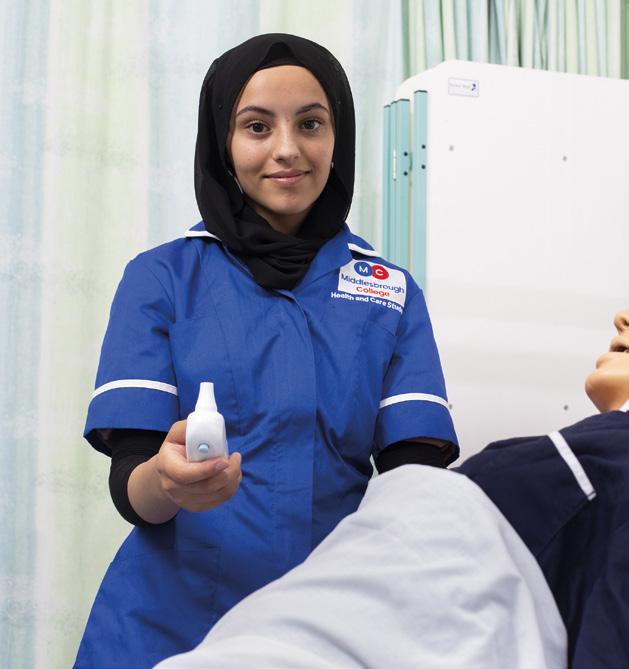
44
A Levels with Applied Business
This course covers a wide range of business topics. It has been developed to meet the changing needs of the sector and prepare students for the challenges they will face in Higher Education or employment. The course focuses on the skills, knowledge and understanding that today’s Universities and employer’s demand.
Entry requirements: Five 9-5 grades at GCSE (not equivalents), including English language and maths. An average GCSE point score of 5.5 recommended (only GCSE grades for this score, not equivalents).
What can I do next?
Career opportunities:
These include marketing, human resources, and accountancy.
University opportunities:
Many past students have gone on to study business full time at University. These have ranged from courses at Newcastle University, The University of Manchester and Teesside University. The nature of the course shows Universities that students can complete detailed examinations and larger pieces of extended writing.


45
2
OCR
years
2 years
A Levels with Applied Criminology
This course introduces you to various aspects of crime, deviance, and the criminal justice system. Students will explore topics such as ‘under the radar’ crimes, theoretical explanations to criminal and deviant behaviour and the legal system.
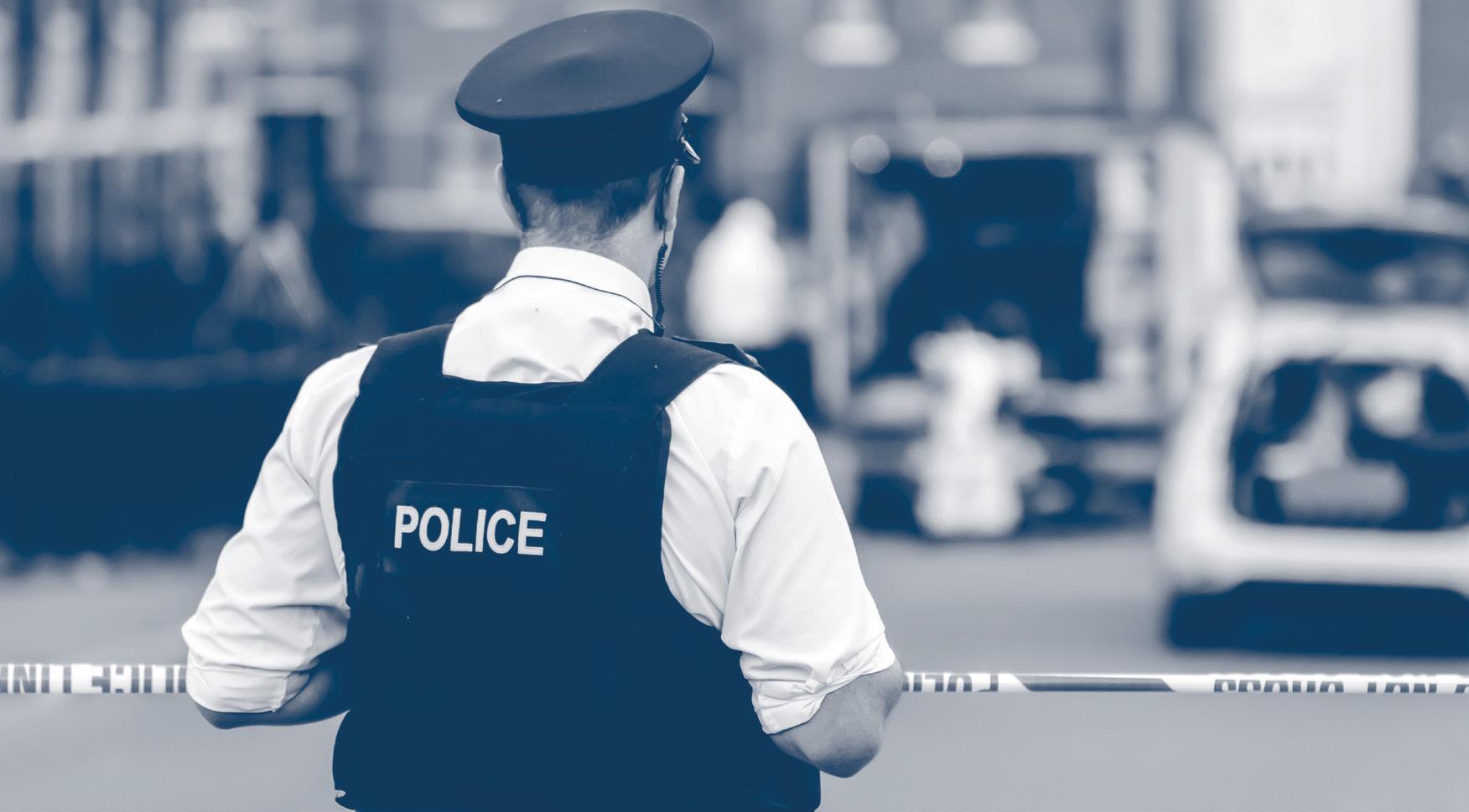
Entry requirements:
Five 9-5 grades at GCSE (not equivalents), including English language and maths. An average GCSE point score of 5.5 recommended (only GCSE grades for this score, not equivalents).
What can I do next?
Career opportunities:
These include careers within the criminal justice system such as the police, prison and probation service, youth work, support work in sectors such as women’s refuges, civil services, housing, community worker and social worker.

University opportunities:
Previous students have progressed to study at HE level in subjects such as criminology, sociology, psychology, criminal justice, social and public sector development, policing, youth and community studies and law.
46
WJEC
2 years
A Levels with Engineering (Advanced
Manufacturing)
This course is modular based and will allow you to explore new and existing technologies with a mixture of theoretical and practical skills to enhance your learning experience. You will study electrical, mechanical and manufacturing elements of engineering. You will also gain additional employability skills in our STEM Centre.
Entry requirements:
Five 9-5 grades at GCSE (not equivalents), including English language and maths. An average GCSE point score of 5.5 recommended (only GCSE grades for this score, not equivalents).
What can I do next?
Career opportunities:
These include mechanical and manufacturing engineering from technicians to engineers.
University opportunities:
Past students have progressed to HNC/Ds in engineering, specializing in electrical and electronic engineering, instrumentation operations engineering, manufacturing engineering, or mechanical engineering.
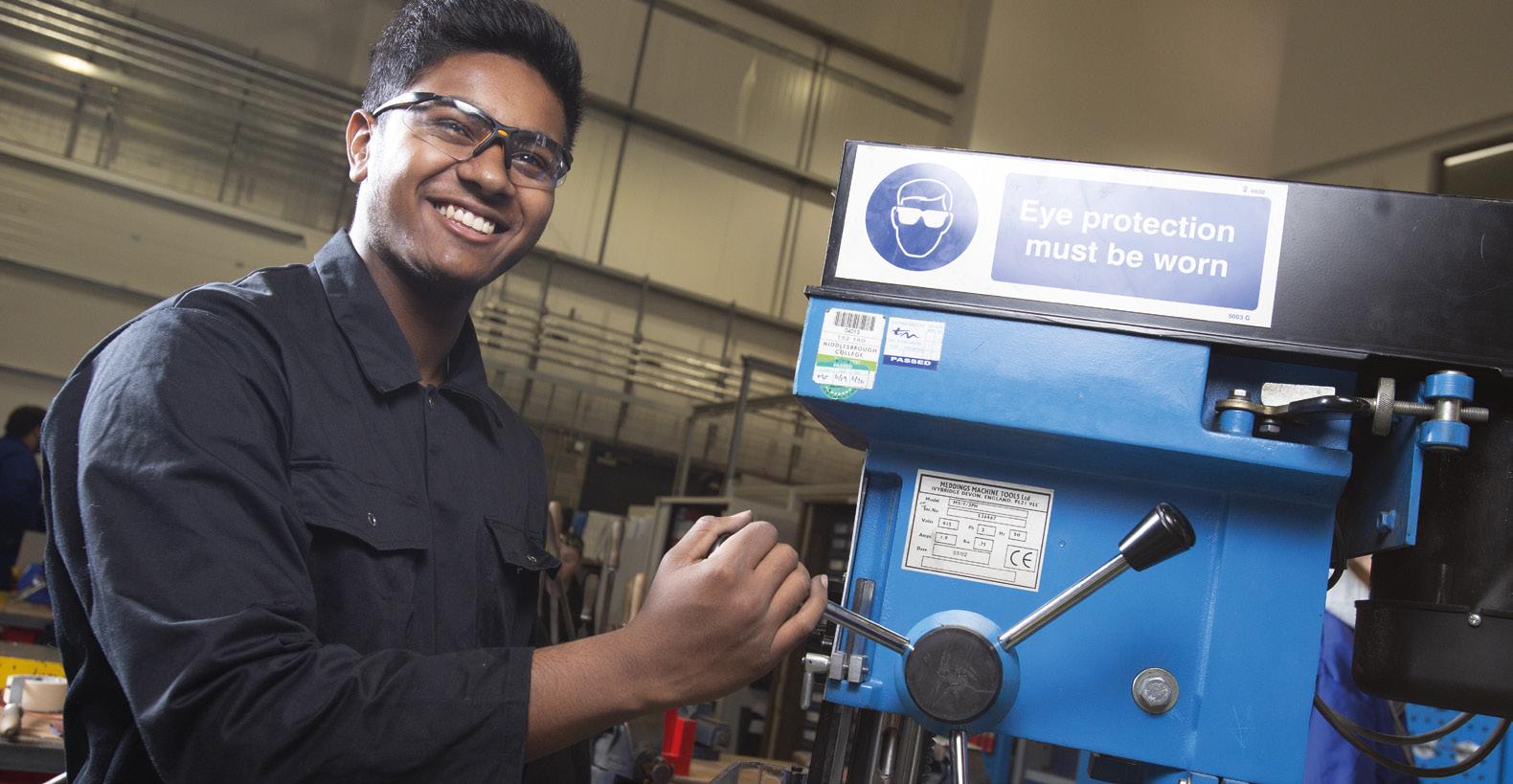
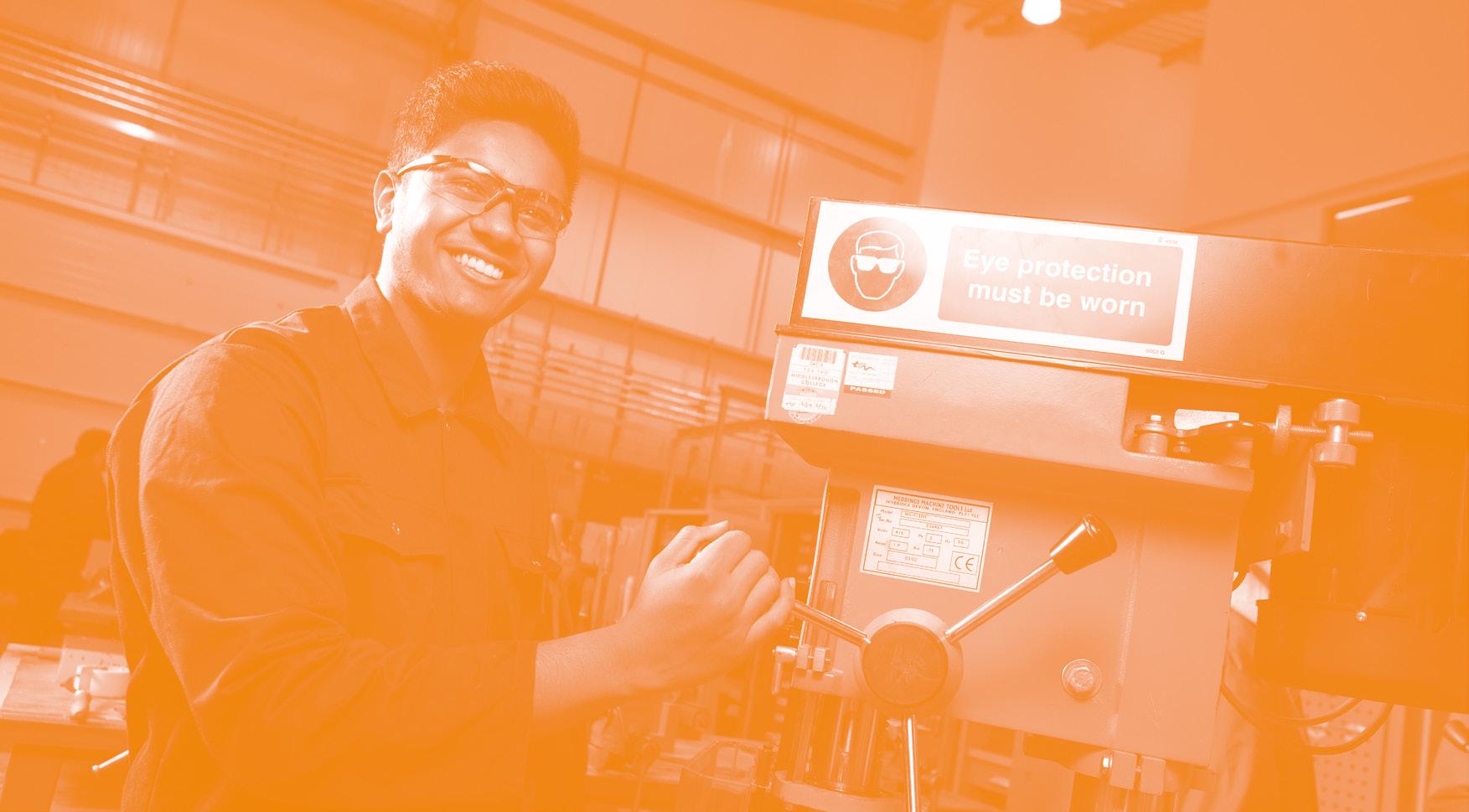
47
BTEC
2 years - L3 Technical Extended Certificate
A Levels with Health and Social Care
This course introduces the health and social care sector and develops key skills in equality & diversity, health safety & security, and building positive relationships. It covers specialized units like psychology, anatomy and physiology, safeguarding, and public health. Each year includes both exam and coursework-based units. Suitable for those interested in exploring the health, social, or childcare sector or pursuing a career in these areas.
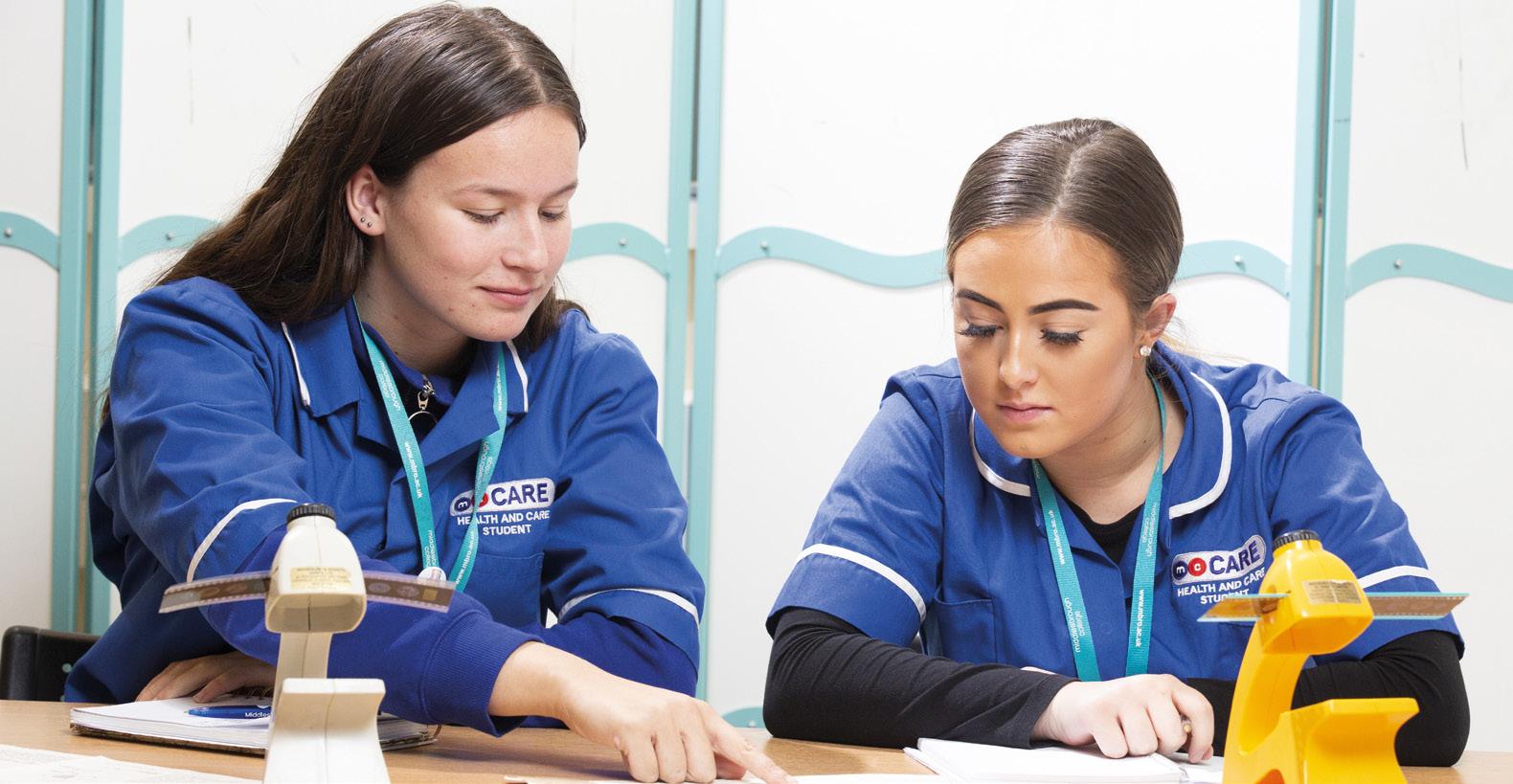
What can I do next?
Career opportunities:
These include social work, nursing, counselling, paramedic practice, youth work, support work and teaching.
Entry requirements:
Five 9-5 grades at GCSE (not equivalents), including English language and maths. An average GCSE point score of 5.5 recommended (only GCSE grades for this score, not equivalents).
University opportunities:
Past students have progressed to study degrees in social work, health, wellbeing and social care, working with children and young people, adult social care, nursing, psychology, criminology, early childhood practice, social and public sector studies and youth, childhood and community studies.
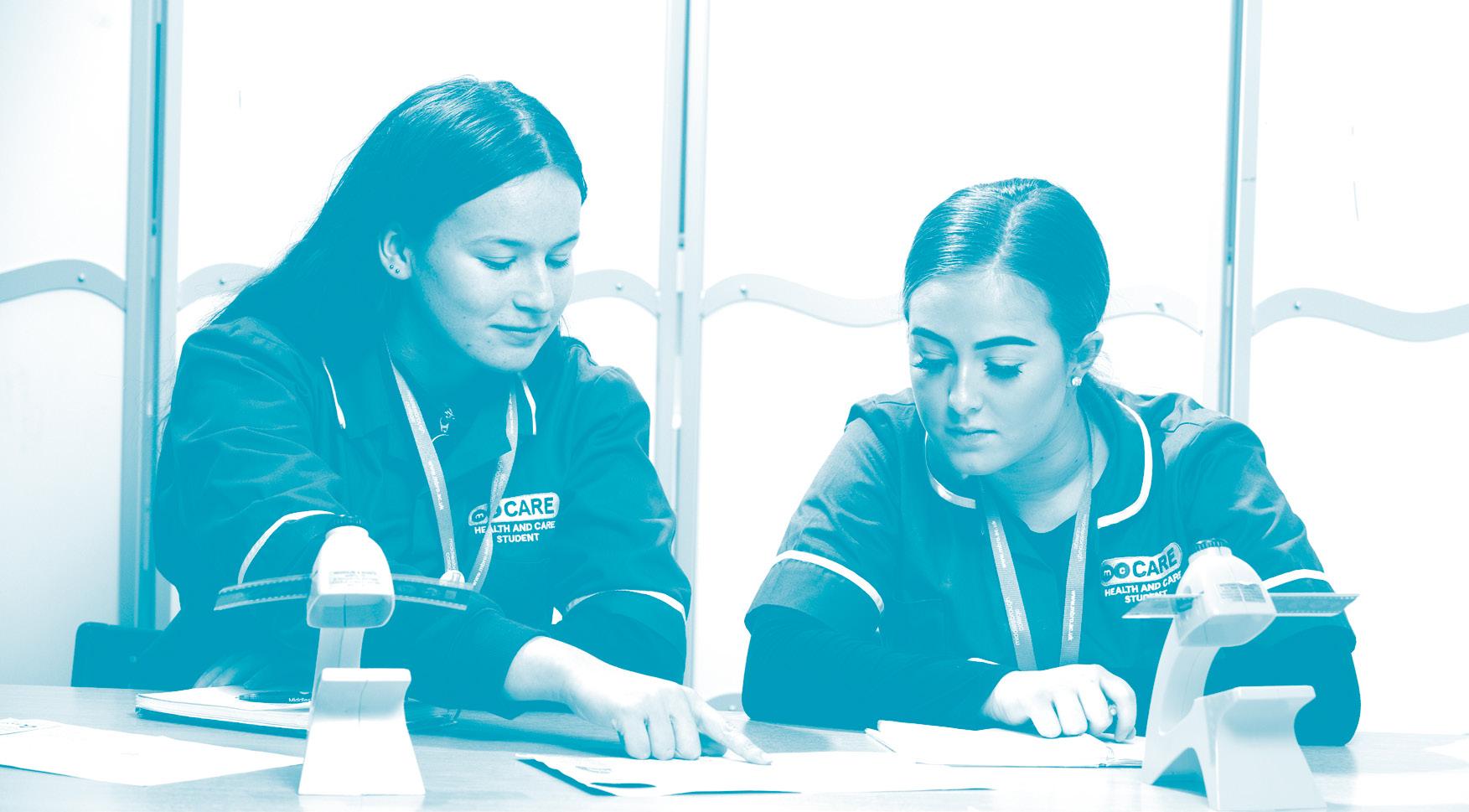
48
OCR
A Levels with Applied Human Biology
This course concentrates on the development of knowledge and understanding as well as essential practical and research skills relevant in applied human biology and health science areas. You will cover topics such as biological molecules, the cardiovascular system, the endocrine system, detecting and managing disease and microbiology.

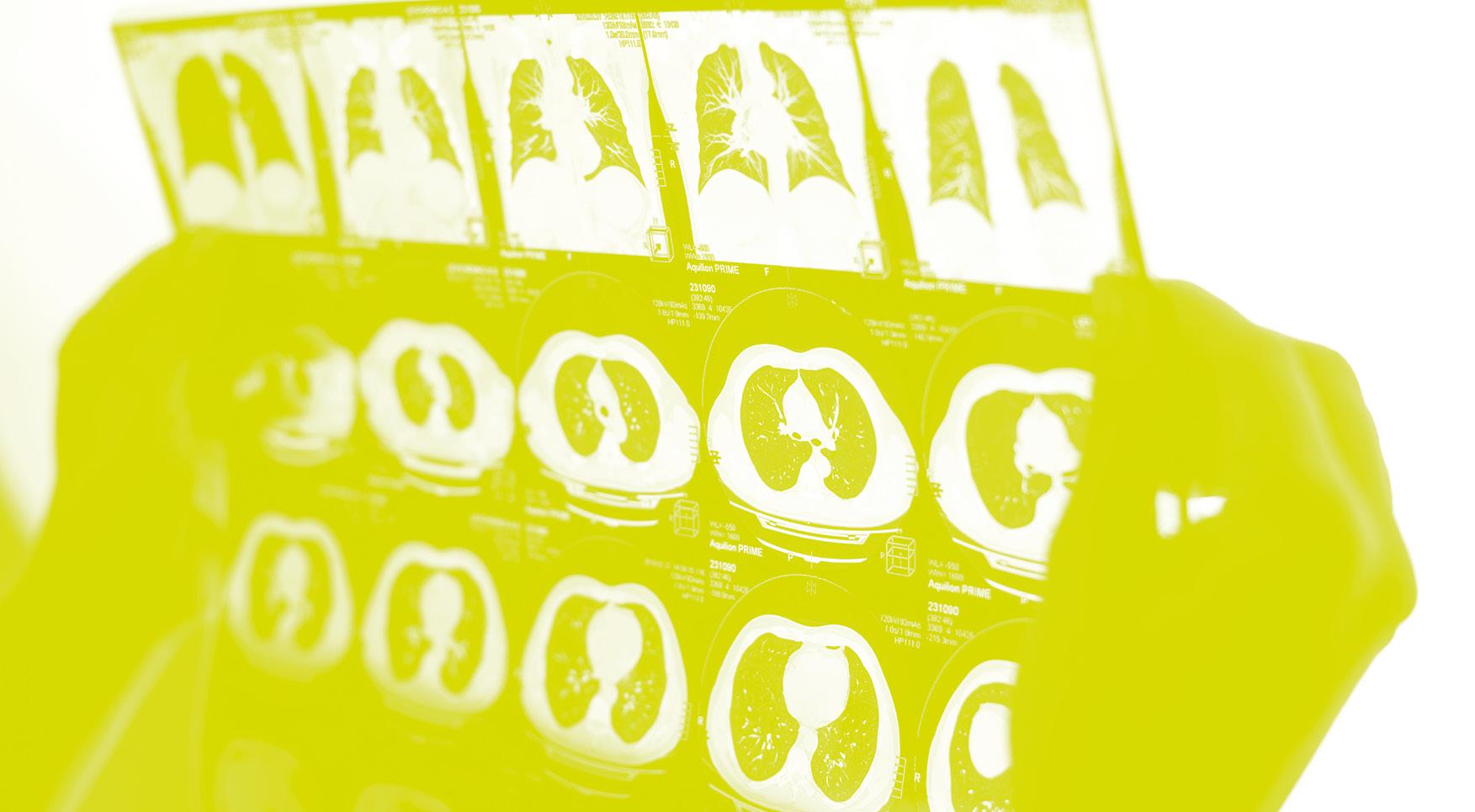
Entry requirements:
Five 9-5 grades at GCSE (not equivalents), including English language and maths. An average GCSE point score of 5.5 recommended (only GCSE grades for this score, not equivalents).
What can I do next?
Career opportunities:
These include medicine, dietetics, laboratory technician, psychologist, research and development, management, environmental professions, conservation, and sports science.
University opportunities:
Past students have progressed to study degrees in biology, biological science, microbiology, radiography, paramedic sciences, forensic science, sport science and sports therapy with rehabilitation. Dependent on the other subjects it is studied alongside.
49
2 years Pearson
A Levels with Applied Law
Over two years, you’ll study four units in this course. These cover civil dispute solving, the workings of civil courts, and the roles of Barristers, Solicitors, and Judges. Additionally, you’ll explore criminal courts, criminal liability, and the roles of Magistrates, Juries, Barristers, Solicitors, and Judges. The course also includes the study of law in areas like murder, manslaughter, property offences (theft, robbery, burglary, criminal damage, and fraud), and aspects of tort law, including negligence.
What can I do next?
Career opportunities:
Students could progress to become a solicitor, paralegal, barrister, or work in local government, the public sector, administration, business, or banking.


Entry requirements: Five 9-5 grades at GCSE (not equivalents), including English language and maths. An average GCSE point score of 5.5 recommended (only GCSE grades for this score, not equivalents).
University opportunities:
Students could progress to study law, criminology, sociology, philosophy, economics, business or history.
50
– Level 3 BTEC
2 years
A Levels with Performing Arts (Acting)
This course provides you with a good quality grounding in performing arts, equipping you with performance skills and background theory in a specialist area of performing arts (acting). We work towards a number of performances throughout the year including performance/devised cabarets and classical and contemporary plays.

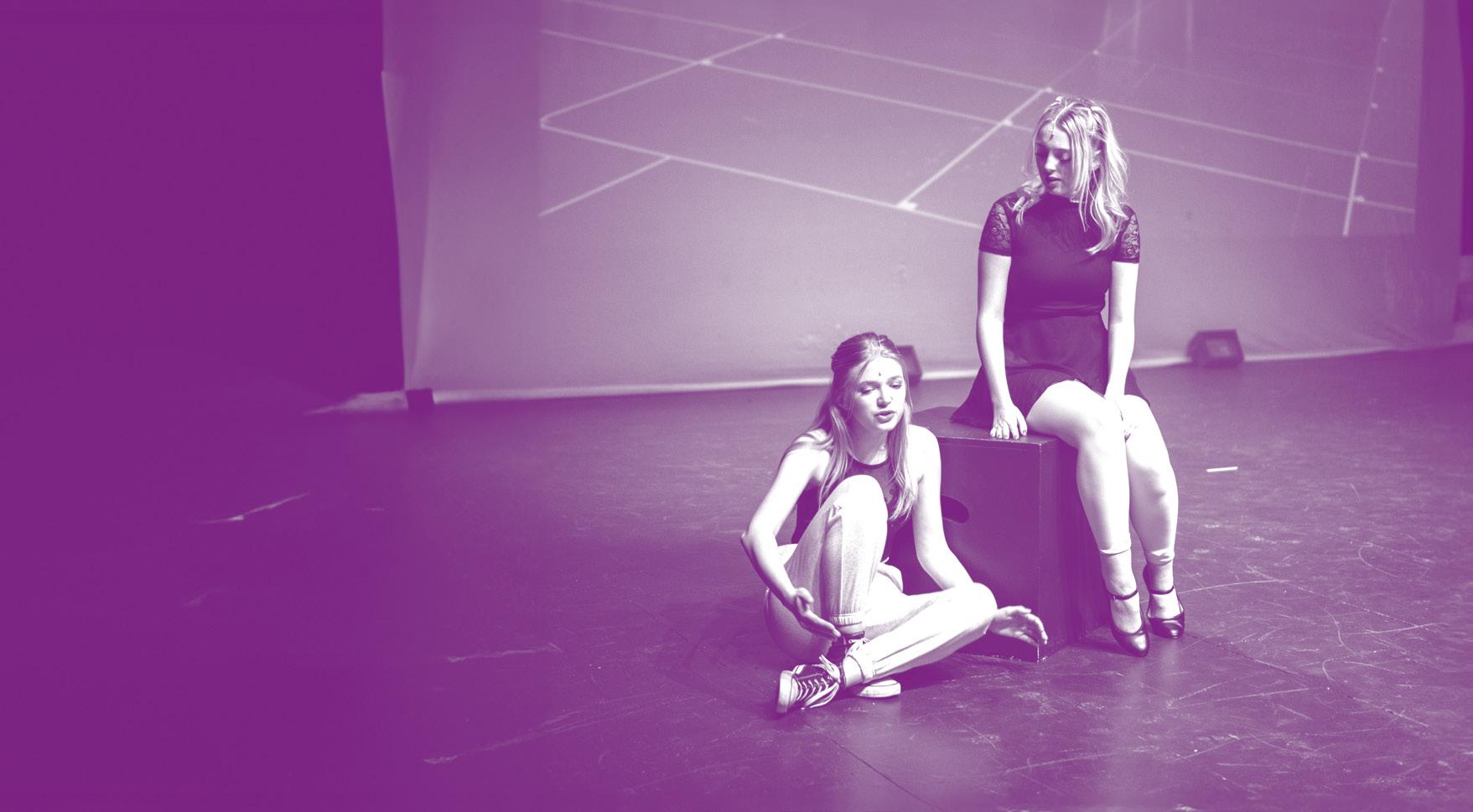
Entry requirements: Five 9-5 grades at GCSE (not equivalents), including English language and maths. An average GCSE point score of 5.5 recommended (only GCSE grades for this score, not equivalents).
What can I do next?
Career opportunities:
These include acting, dancing, singing, professional performer, entertainment, and teaching.
University opportunities:
Past students have progressed to study degrees in performing arts, musical theatre, acting, dance, drama, theatre studies and education.
51
2
Pearson Edexcel
years
A Levels with Sport
This course introduces you to the structure and function of the body’s systems in response to sport and exercise. You will cover anatomy and physiology, practical sports performance, fitness training and programming and professional development. You will have time split across theory and practical lessons and would benefit from being involved in sport outside of the classroom.
Entry requirements: Five 9-5 grades at GCSE (not equivalents), including English language and maths. An average GCSE point score of 5.5 recommended (only GCSE grades for this score, not equivalents).
What can I do next?
Career opportunities:
These include outdoor instructors, outdoor leaders, primary and secondary education, sport science, sports coaching and nutrition, therapy, and psychologist.
University opportunities:
Past students have progressed to study degrees in sports therapy with rehabilitation, sports coaching, sport science, physical education, education and strength and conditioning and physiotherapy.
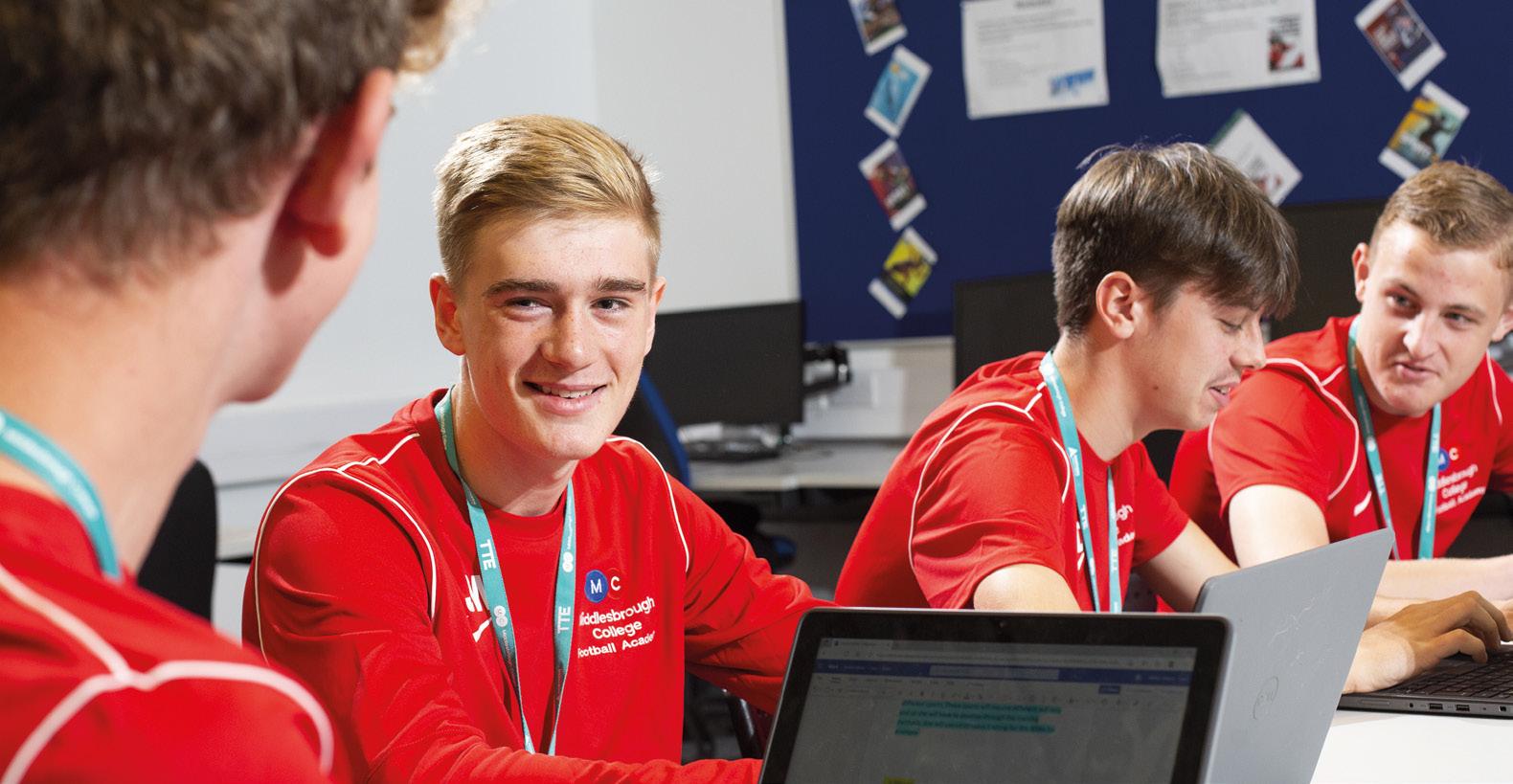

52
– Level 3 Pearson
2 years
2 years Edexcel
A Levels with Applied Psychology
Applied psychology offers a captivating exploration of human behaviour. You’ll cover psychology foundations, research methods, and study diverse behaviours like gender, aggression, business psychology, health psychology, and forensic psychology. The course includes conducting your psychological investigation, preparing you for future studies. Assessment is a combination of external exams and internally assessed assignments.
What can I do next?
Career opportunities:
These include teaching, sport psychology, neurology, social work, marketing and advertising, counselling, police force, human resources, nursing and clinical psychology.
Entry requirements:
Five 9-5 grades at GCSE (not equivalents), including English language and maths. An average GCSE point score of 5.5 recommended (only GCSE grades for this score, not equivalents).
University opportunities:
Past students have progressed to study degrees in psychology, sociology, criminology, law, marketing, business, education early childhood professional studies, health, wellbeing and social care and social work.


53
Open Events
Come and see MC6! At our Sixth Form Open Events, you’ll be able to meet our friendly team, take a tour of MC6, meet your tutors and find out more about our fantastic range of A Levels and Applied A Level equivalent courses. You’ll also have the chance to speak with our careers and student services team who will be able to tell you all about our amazing student perks, including how you can travel to College for free*!
Open Event
Thursday 5th
October '23
5:00pm - 8:00pm
Open Event
Wednesday 11th
October '23 5:00pm - 8:00pm
Open Event Open Event
Saturday 11th
November '23 9:30am - 12noon
Thursday 7th
December '23 5:00pm - 7:00pm
54
Tuesday 23rd January '24 5:00pm - 7:00pm
Wednesday 13th March '24 5:00pm - 7:00pm
Thursday 25th April '24 5:00pm - 7:00pm
Thursday 20th June '24 5:00pm - 6:30pm
Bridging sessions
Not sure which subjects to pick? Don’t worry! You can get a feel for life at MC6 and our courses by coming along to our bridging sessions.
Once your GCSE exams have finished, you’ll be invited along to spend a few days at MC6, trying out different subjects and find out more about life as an A Level student.
We will send out invites in the post, all you need to do is reply with your subject choices.
If you want to find out more or if you have any questions, please call our friendly team on 01642 333359.
55 Open Event Open Event Open Event Open Event
Taking you to University
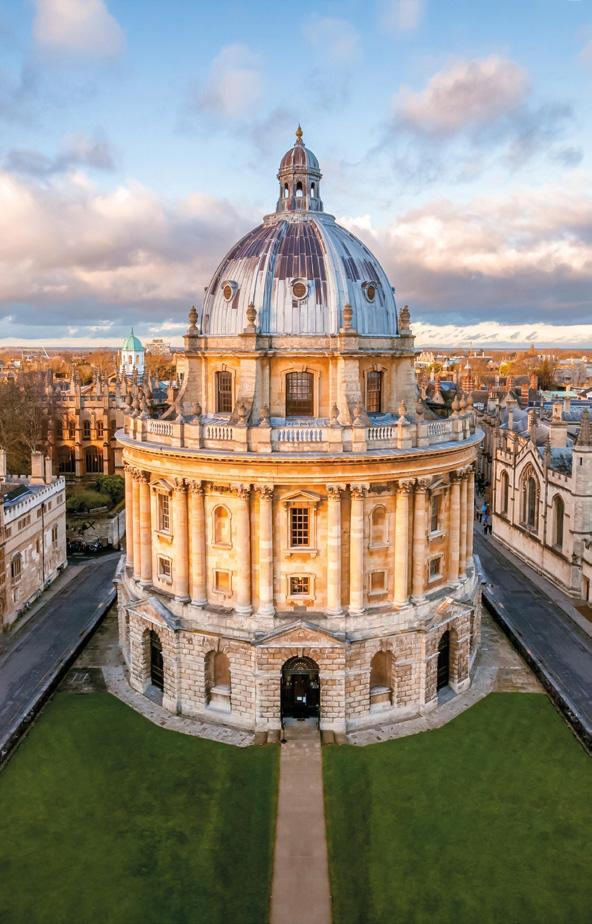
Many of our A Level students choose to progress to University after completing their studies with us and we are highly successful in helping them to secure a place on their chosen degree programme!
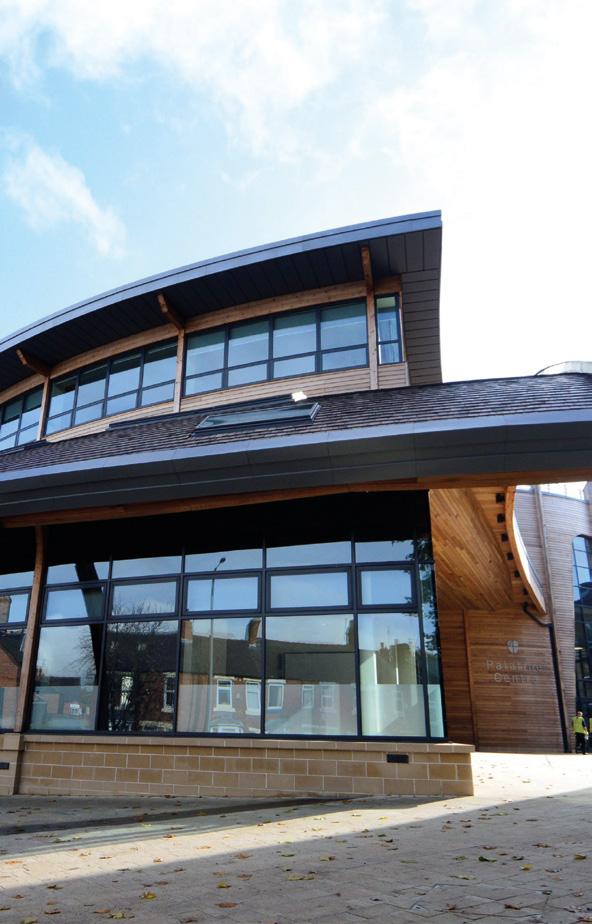
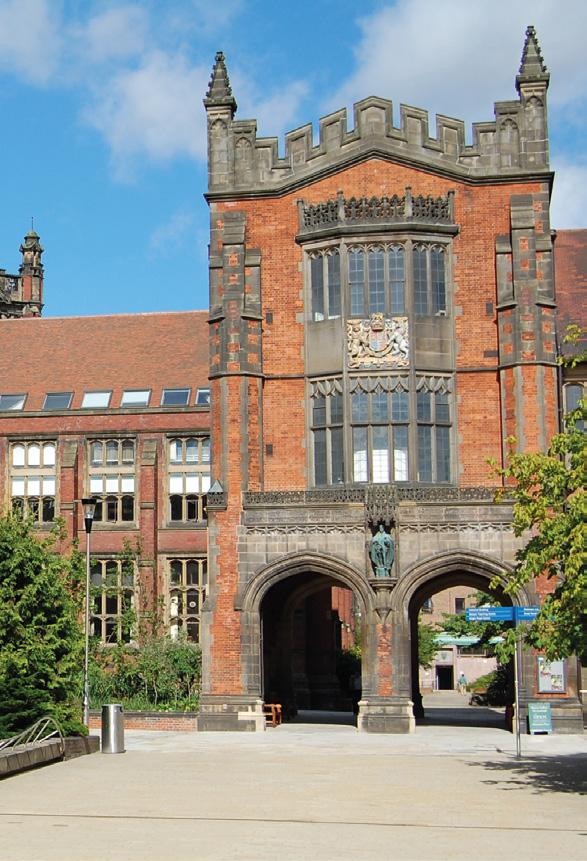
We offer careers advice and guidance to help you make your decision about University. We also offer guest speakers from Universities across the country and visits to University Open Days, organised and funded by the College. Your personal tutor is central in supporting you with your UCAS application and you will receive dedicated 1:1 time to be supported.
Our dedicated Russell Group Coordinator also provides support with application and interview preparation if you are thinking of progressing to a Russell Group University! Our students are offered specialist support, advice and guidance on making applications to the top Universities, including Oxford and Cambridge. A Level students have access to at least three supported entry schemes for University. This can lead to lower UCAS offers from the likes of Durham, Leeds and Newcastle University.
Durham
Oxford
56
Newcastle
Raising aspirations
We want you to reach your full potential, so that’s why we created our Raising Aspirations programme!
This programme is for academically gifted students to prepare you to study at leading Universities.
Our specialist coaches and teachers offer activities, events and support throughout your time at MC6 to provide you with the best possible preparation for University!
Check out our website to find out more about our programme!
Destiny Brown – A Levels
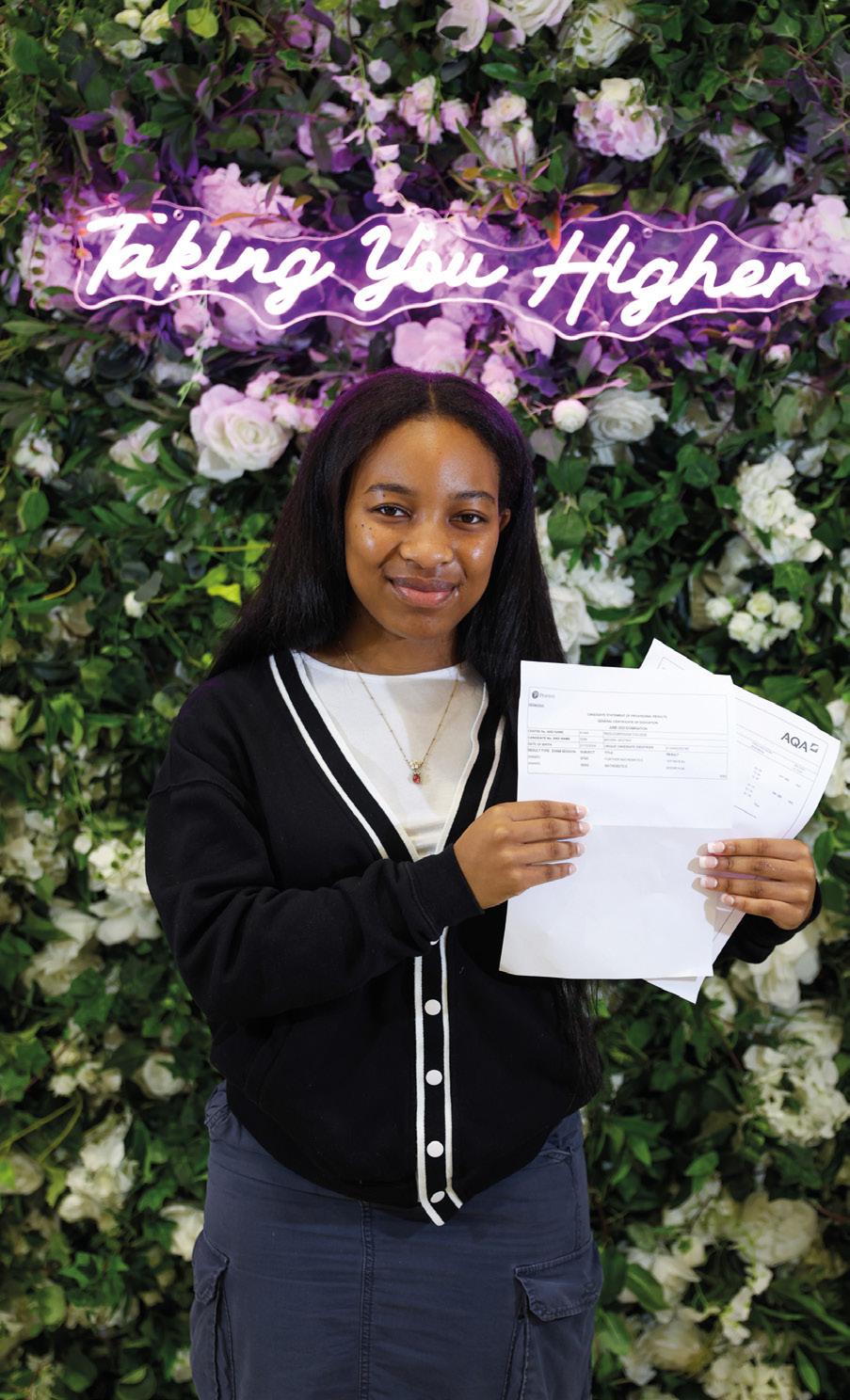

Previous school: Dyke
House Academy
Hartlepool
Destiny is progressing to the University of Liverpool to study Computer Science
“
I really enjoyed studying at MC6! I’ve had the opportunity to take part in the Raising Aspirations programme which has been beneficial for my studies and future steps in my education. On the programme we have had many opportunities to take part in online webinars, meet with employers, take part in internships and visit Universities, including Oxford University!”
Destiny
57
Our student perks
Studying can be expensive, so that’s why we give our students the best student perks!
Travel Laptop Loan Scheme
FREE* Bus Travel to College from across the Tees Valley.
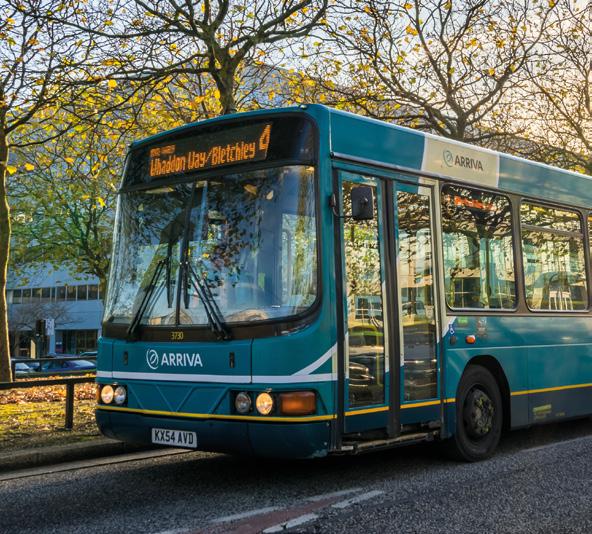
Reimbursed Train Travel from designated stations with a 16-17 saver card.
*There is a £5 termly admin fee for your bus travel sticker.
Financial help
Students receive help whilst they study with:
• Bursaries of £350 or £1200 per year

• Support with equipment, costs, and residentials
• Support with childcare
• Other course related costs
Financial help and bursaries are all subject to status and means testing.
MC Click
We will provide a free loan laptop device for all fulltime students. This will support your learning, equip you with the tools to succeed and help you to develop and showcase your digital skills.
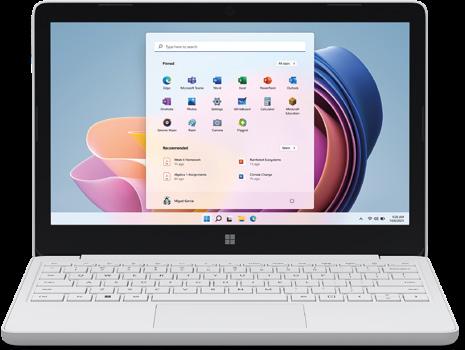
58

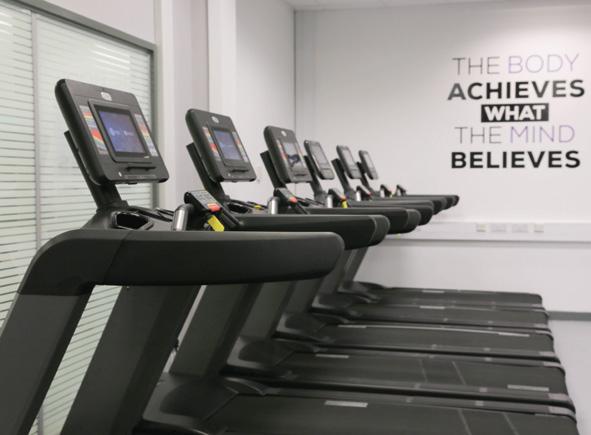






College gym membership for just a oneoff £10 fee! 10% discount on great food FREE Wi-Fi £15 printing credit and subsidised stationery costs Access to exciting enrichment activities FREE College meals* (If you currently receive free school meals, this could continue at College) Please see our website for more details. Subsidised childcare costs 20% discount on hair and beauty treatments, plus a free haircut in your first term! Head to our website for full details of our student perks! 59
We are proud to offer all our students on a full-time study programme the opportunity to loan a device for FREE!
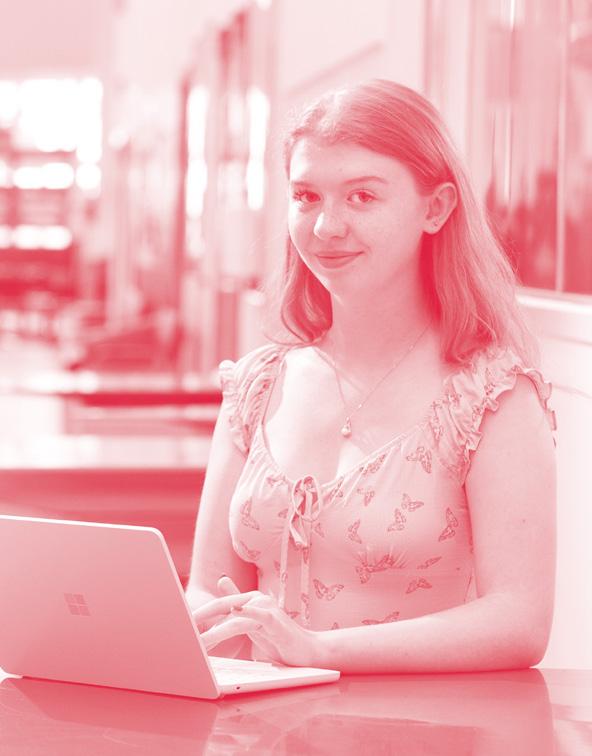
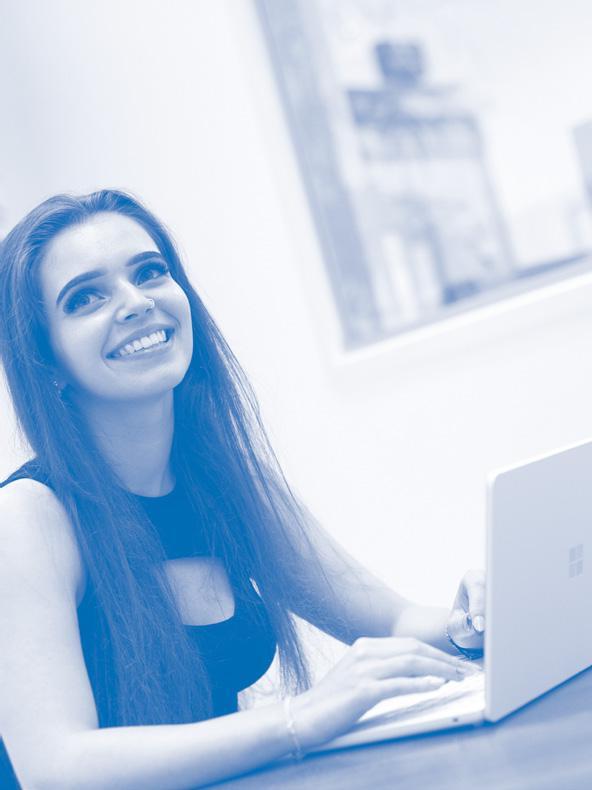
MC Click will help to develop your digital skills, allow you to complete your work and showcase your skills. You can capture activities on video, create and share, record group discussions and tutor feedback, all with the click of a button!
All students who complete the laptop scheme for 2 years will get to keep the device! We will transfer the device ownership from the College to the student.
Any student that leaves within 2 years needs to return the device to Help Centre.
Find out more about the scheme!
All students will use Microsoft Teams for their work! Microsoft Teams is a fantastic tool and will help you to manage your College work, ask tutors questions, safely store your documents and prepare you for the world of work.

60
My Middlesbrough College App

Our app will help you to get the most out of College life!
When you become a student with us, we will help you download the My Middlesbrough College app on your phone and laptop as this is our primary method of communication with you. You can find lots of information on the app about your specific course and about what is happening in the College.
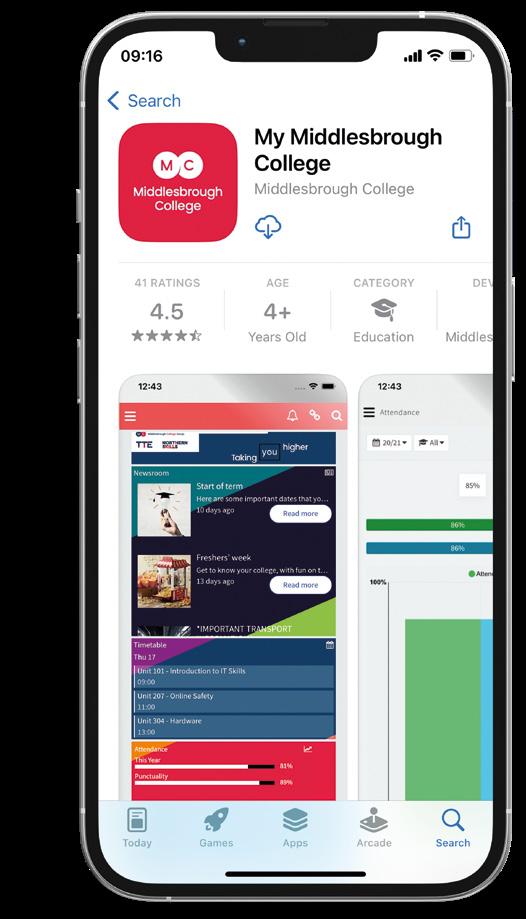

The app can be downloaded from Apple or Google Play and download instructions will be given to you during induction.
Only available to enrolled students

61
Work placements
We are here to get you work ready! We have excellent relationships with local, regional and national employers and we are committed to finding you relevant and quality work experience during your time as a student at Middlesbrough College.

Work experience is important for getting into any career. Having a work placement can make you stand out from the crowd on applications for courses, training
and jobs. Work experience can also help you decide what you want to pursue in your future career!
To ensure you get the most out of your work experience, our dedicated team will help you find the right work placement that supports your course and your career ambitions.
You'll be assigned a dedicated Work Placement Co-ordinator who will visit you and provide support throughout the whole process. You will also be provided with a travel card to ensure you can get to work each day!
Supporting you for the world of work
When you sign up to Middlesbrough College you are signing up for more than just a qualification. Our team of experts will help you with every aspect of your life at College and work and any individual needs you may have.
This includes:
• Maths and English support
• Careers advice and support
• Employability skills
• Grofar
Find out more about the scheme!
62
Careers team
Meet our dedicated Careers Team!
The team can help you make the right decisions on your future career path.
Whether it’s dreams of progressing into work, an apprenticeship or higher education, the Careers Team are fully qualified to provide support for individuals from a range of backgrounds into successful future opportunities. The team are here to help you with everything from University applications to CV support.
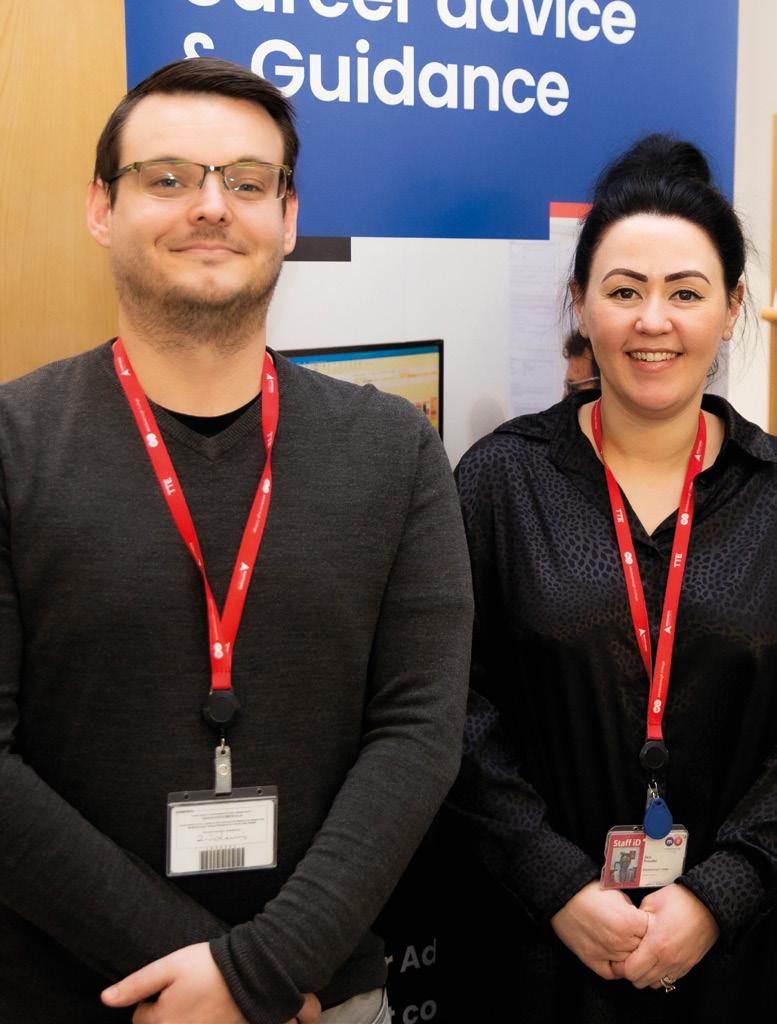
Head to our website to find out more about our Careers team:
You can also speak to our team before you join the College about your options. Come along to one of our Open Events or make an appointment to see them at the College.
Elizabeth Smart
Previous school: Rye Hills Academy
Elizabeth secured a spot on Northumbria University’s Sport Management degree


“
I chose the mix it up course because it allowed me to learn a broad range of things across the different subjects. Now I have a variety of skills and knowledge to help me choose my career path. The staff at Middlesbrough College are warm and welcoming. They helped to build my confidence!” 63
Zara
Phil
Elizabeth
Student services team
Your health and wellbeing should be your number one priority, so we’ve made it ours too!
Our Student Services Team are on hand to provide a range of services to support you throughout your studies. This includes dedicated safeguarding and welfare officers and our counselling team, which is free and confidential for all students.

Support is also available to help you with travel and finance.
We are the only education provider in Middlesbrough to be awarded the Young Carers in Schools Bronze Award!
If you would like more info on our support packages, visit our website.
Meet Mel, our Senior Safeguarding & Welfare Officer! Mel and the team can offer advice and guidance to you throughout your studies
64
Specialist A Level Support – meet Ferzana Ahmed!
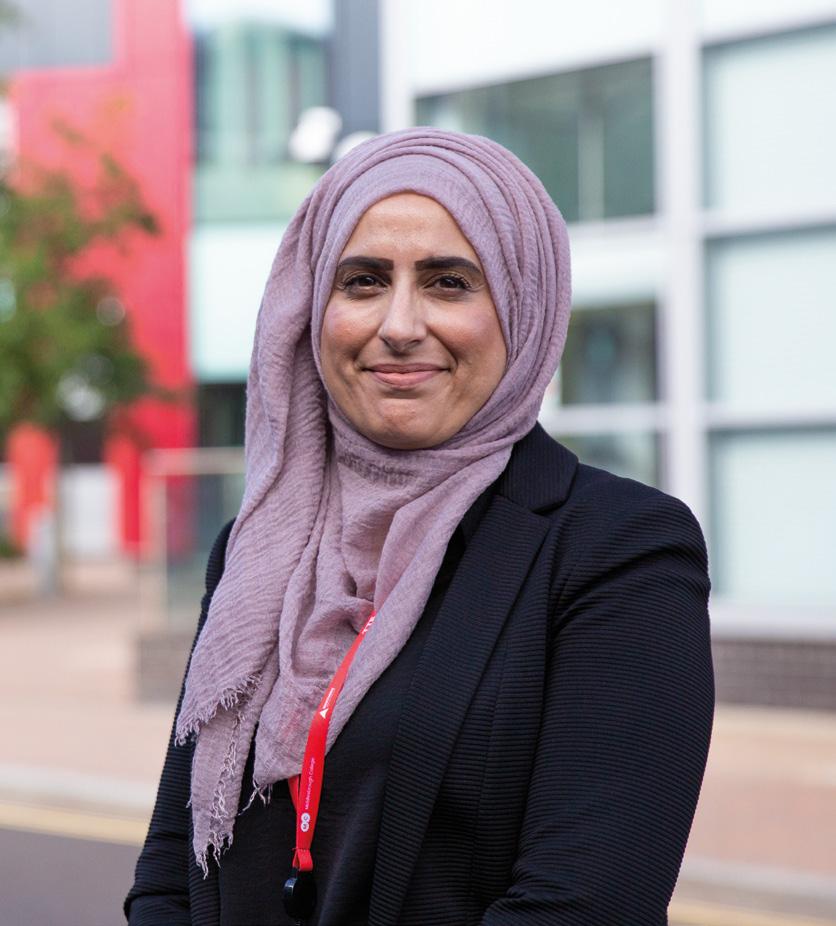
Ferzana is our Pastoral and Welfare Officer, she provides support for all students with matters of welfare and safeguarding. Whilst in College you will also receive expert guidance on applying to University and progression options from our dedicated tutor team.
We also have an academic and pastoral mentor for students who need extra support.
Additional learning support
If you have additional needs, we offer a range of support services to help you.
We are proud to have a large team of experienced and trained staff who can support you with your studies and we are committed to providing a learning environment in which there is equality for all members of our community. The Additional Learning Support (ALS) Team are experienced and trained staff who can offer a wide range of support services.
We will work closely with you to ensure you are provided with an individual support package.
The Additional Learning Support Hub is located on the ground floor of the College and provides you with access to our experienced staff and facilities across the day, including quiet study spaces and a relaxing social space.
If you would like to have a chat in a confidential manner, please contact the ALS Team on 01642 333727.
We are proud to have the Bullying Intervention Group (BIG) Award which recognises excellent anti-bullying practice and shows that College takes bullying very seriously and works hard to promote a culture of respect, tolerance and diversity.

65
Aim higher with our Sports Academies


You can join a sporting academy alongside your studies!

We are proud to be a top performing College and our sporting academies play in the top leagues nationally.
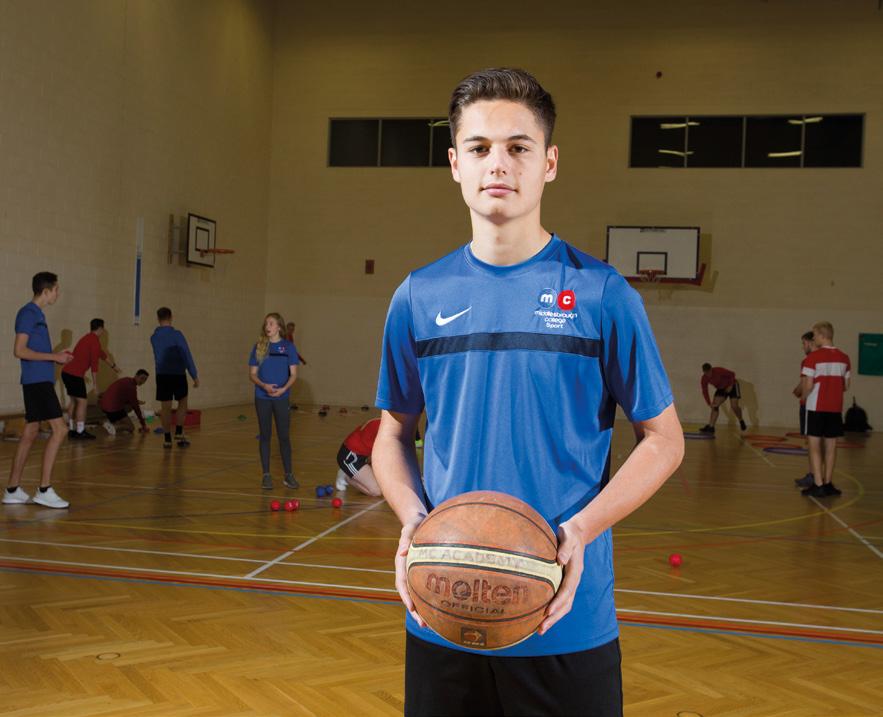
Cricket Gymnastics
Basketball
Football 66
Each sporting academy offers specialist top level coaching to develop excellence and nurture your talent. You’ll take part in competitions & league matches and we offer elite scholarships for students who excel in their field. This includes a free tablet and specialist training.
Netball New for 23/24

Volleyball
Golf
Table Tennis
You don’t need to be doing a sports course to take part in one of our sports academies!
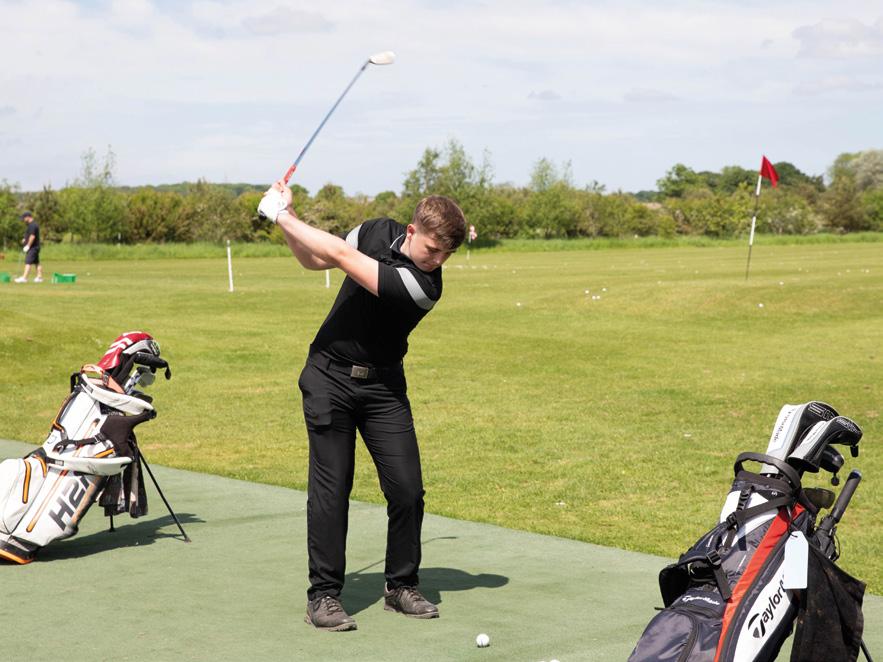

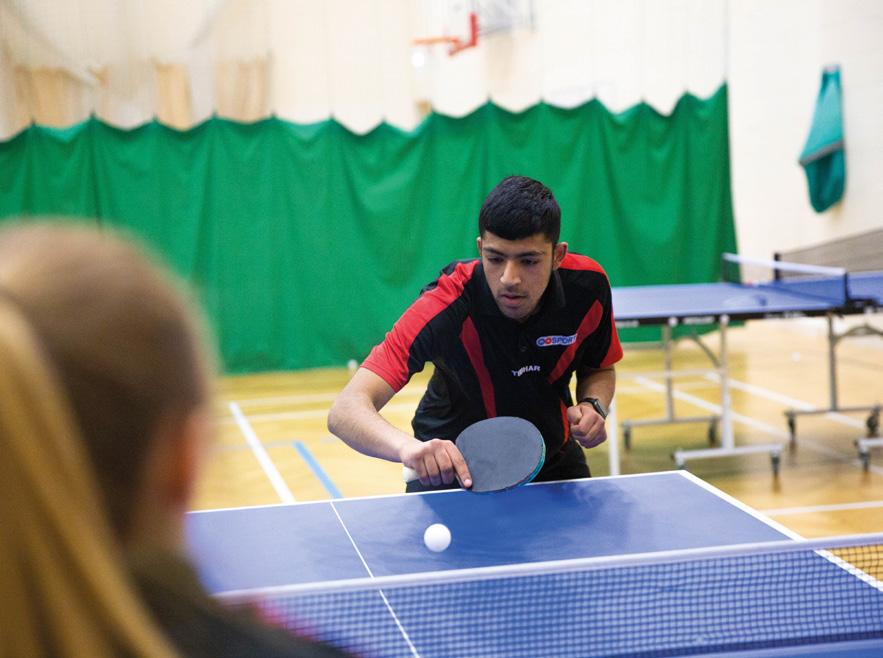
TASS is an athlete support programme to help talented athletes with balancing the demands of their sport and studies to be the best in both.
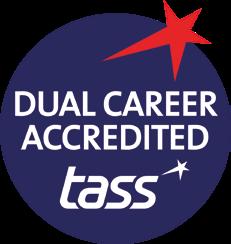
Swimming

67


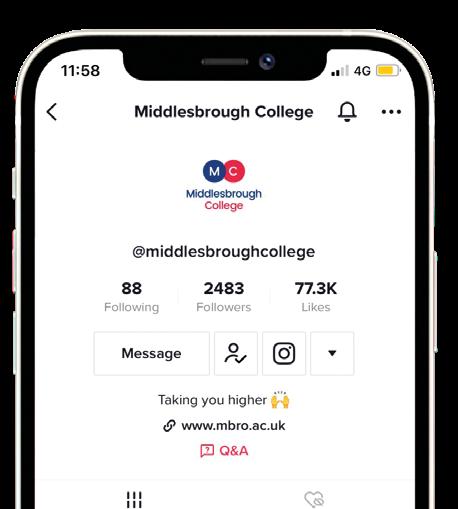
Check out our social media by following Middlesbrough College to stay up to date with all the latest news, events, photos, videos and competitions! @MiddlesbroughCollege We are on TikTok! Take a look at our videos: @MiddlesbroughCollege @MbroCollege @MbroCollege @MiddlesbroughCollege Message us Our text back service means that you can have your questions answered by a member of the School's & Admissions Team at any time! Your question could relate to the application process, our campus or your chosen course. You can also book your 1:1 tour. Head over to our website: mbro.ac.uk/ text-back-form We are on WhatsApp! 07979 111 313 68
Let's get social
friends
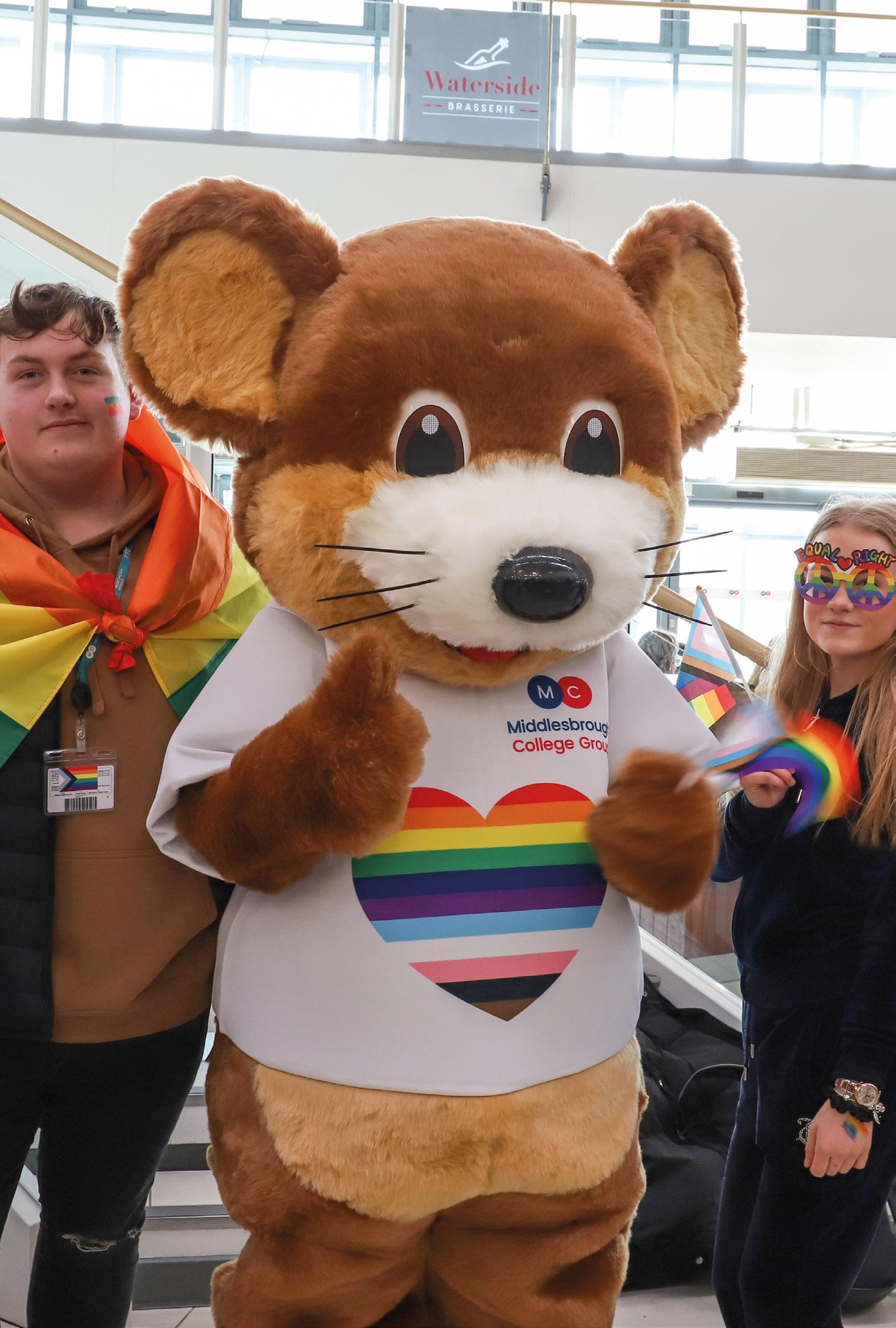

Middlesbrough
TS2 1AD
Whilst every effort is made to ensure the accuracy of information in this guide, it is advisable to check information prior to enrolment. The College reserves the right to cancel programmes if there is insufficient enrolment and amend information at any time.
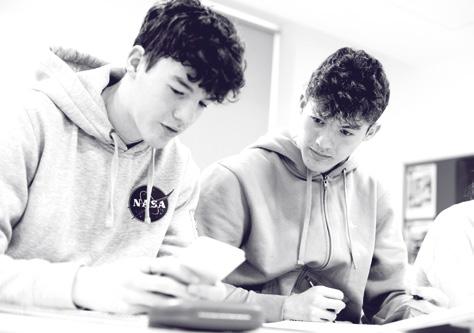
Open Events


Thursday 5th October 2023
5:00pm - 8:00pm
Wednesday 11th October 2023
5:00pm - 8:00pm
Saturday 11th November 2023 9:30am - 12noon
Thursday 7th December 2023 5:00pm - 7:00pm
Tuesday 23rd January 2024 5:00pm - 7:00pm
Wednesday 13th March 2024 5:00pm - 7:00pm
Thursday 25th April 2024 5:00pm - 7:00pm
Thursday 20th June 2024 5:00pm - 6:30pm
Tel: 01642
1
College
Street
Middlesbrough
Dock
aspirations
333333 www.mbro.ac.uk

























































 Joe Morley
Joe Morley







































































































































